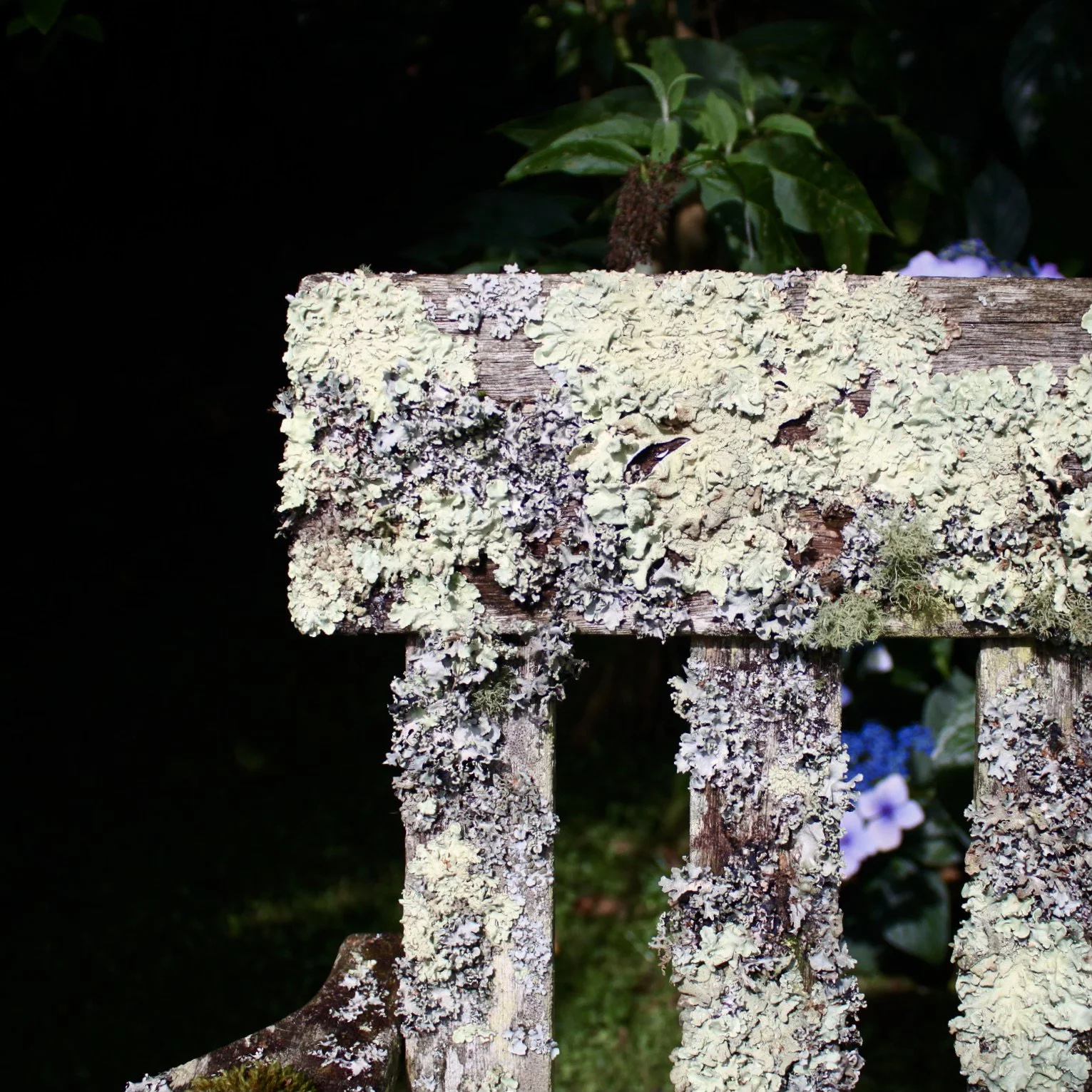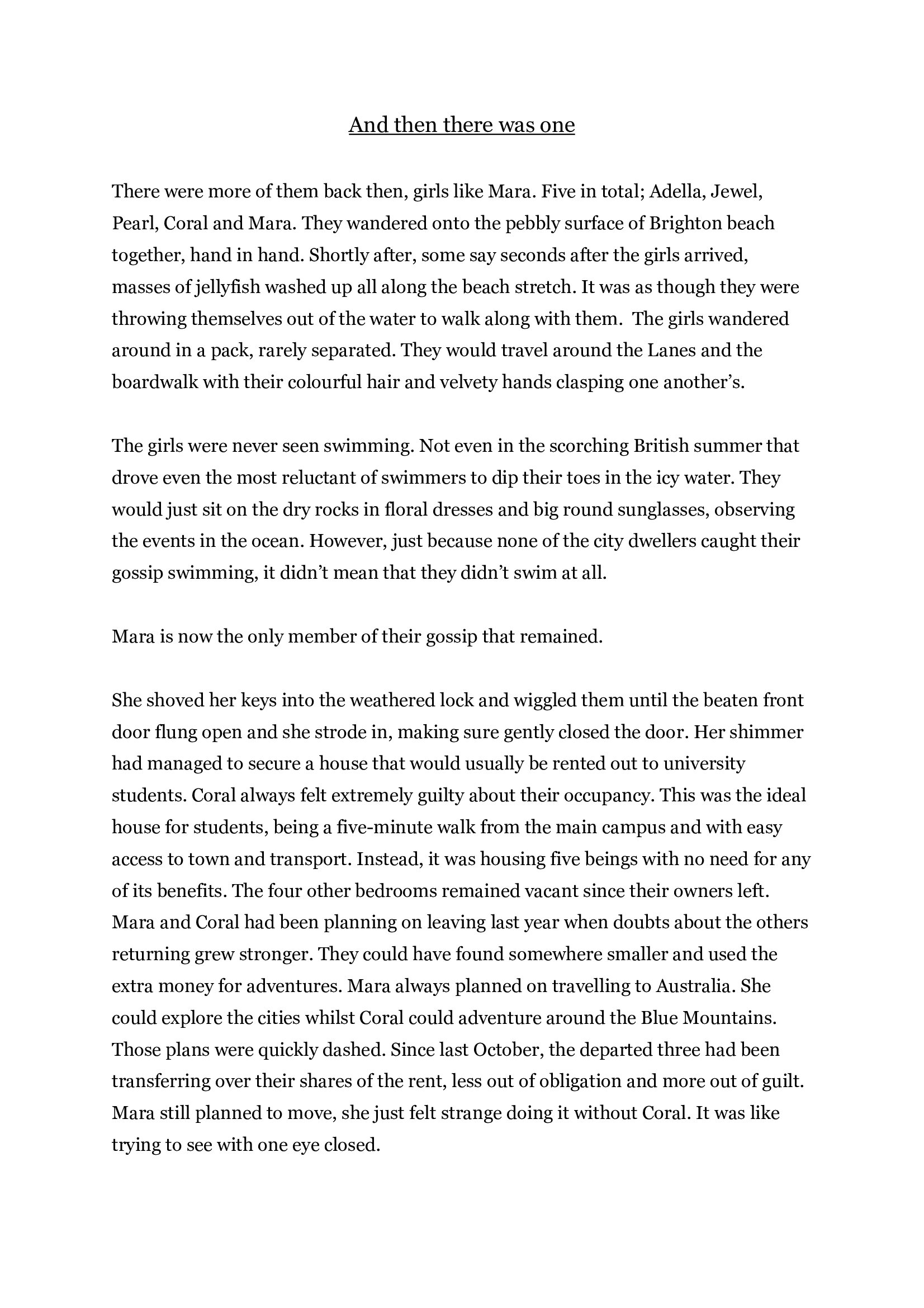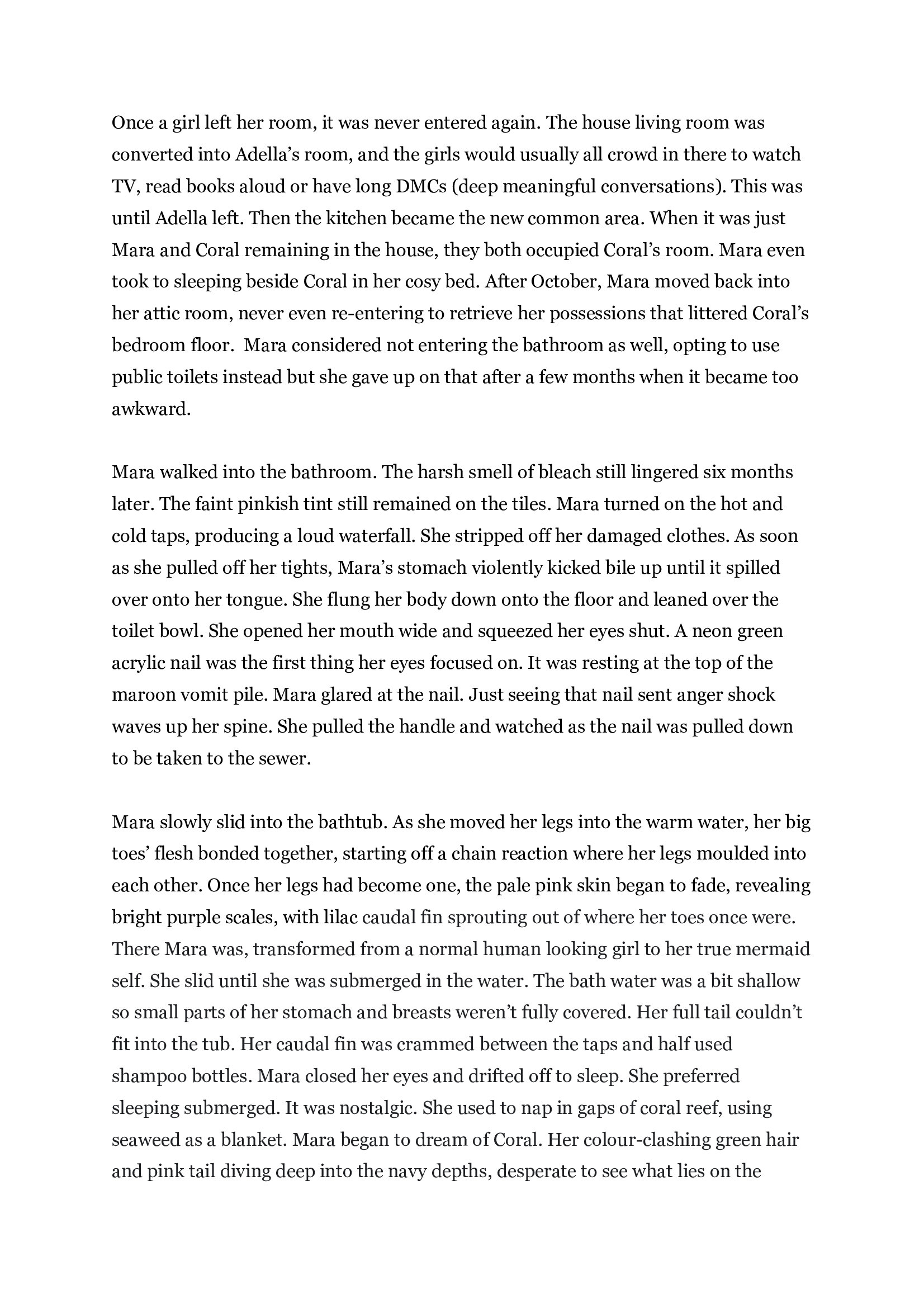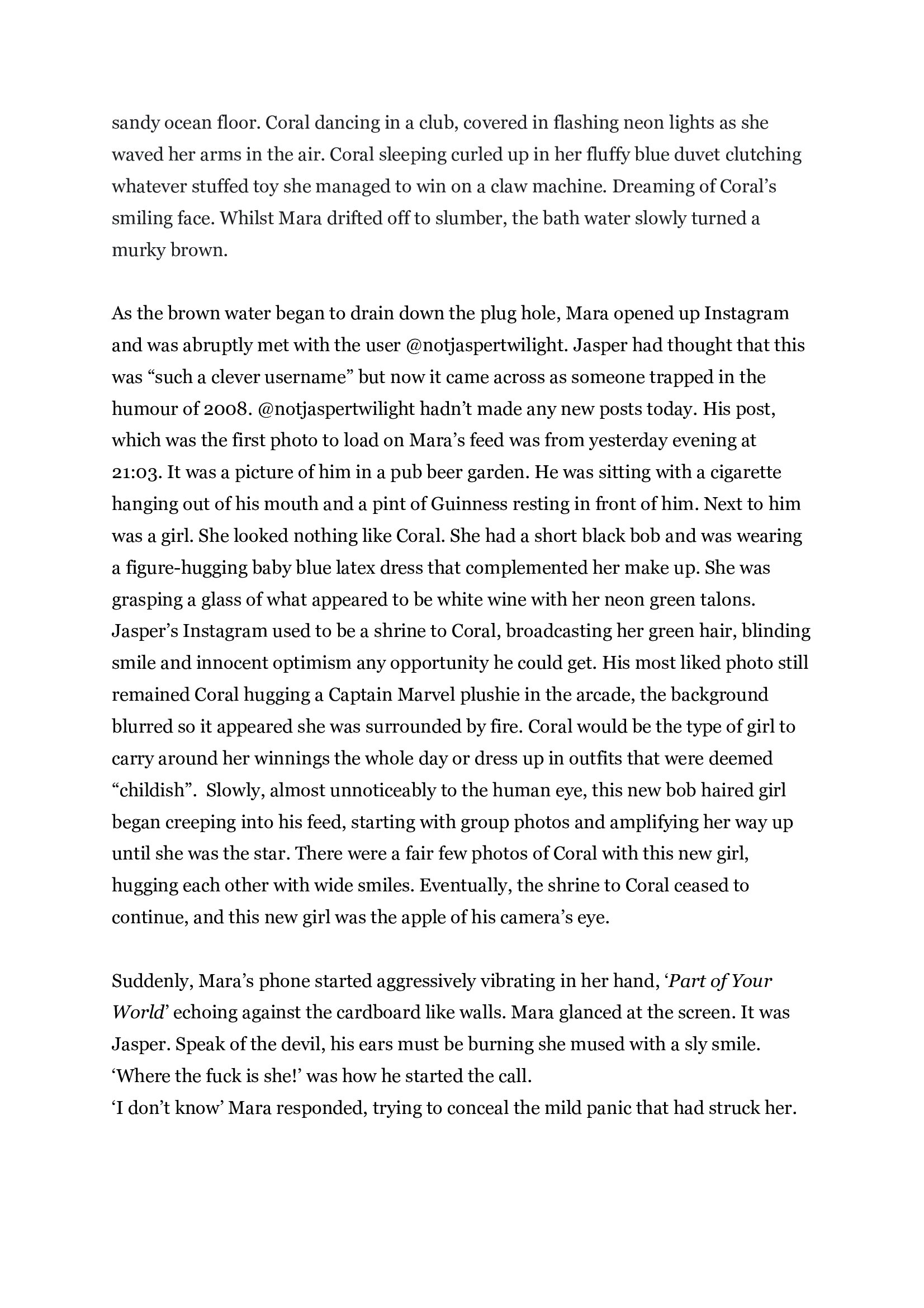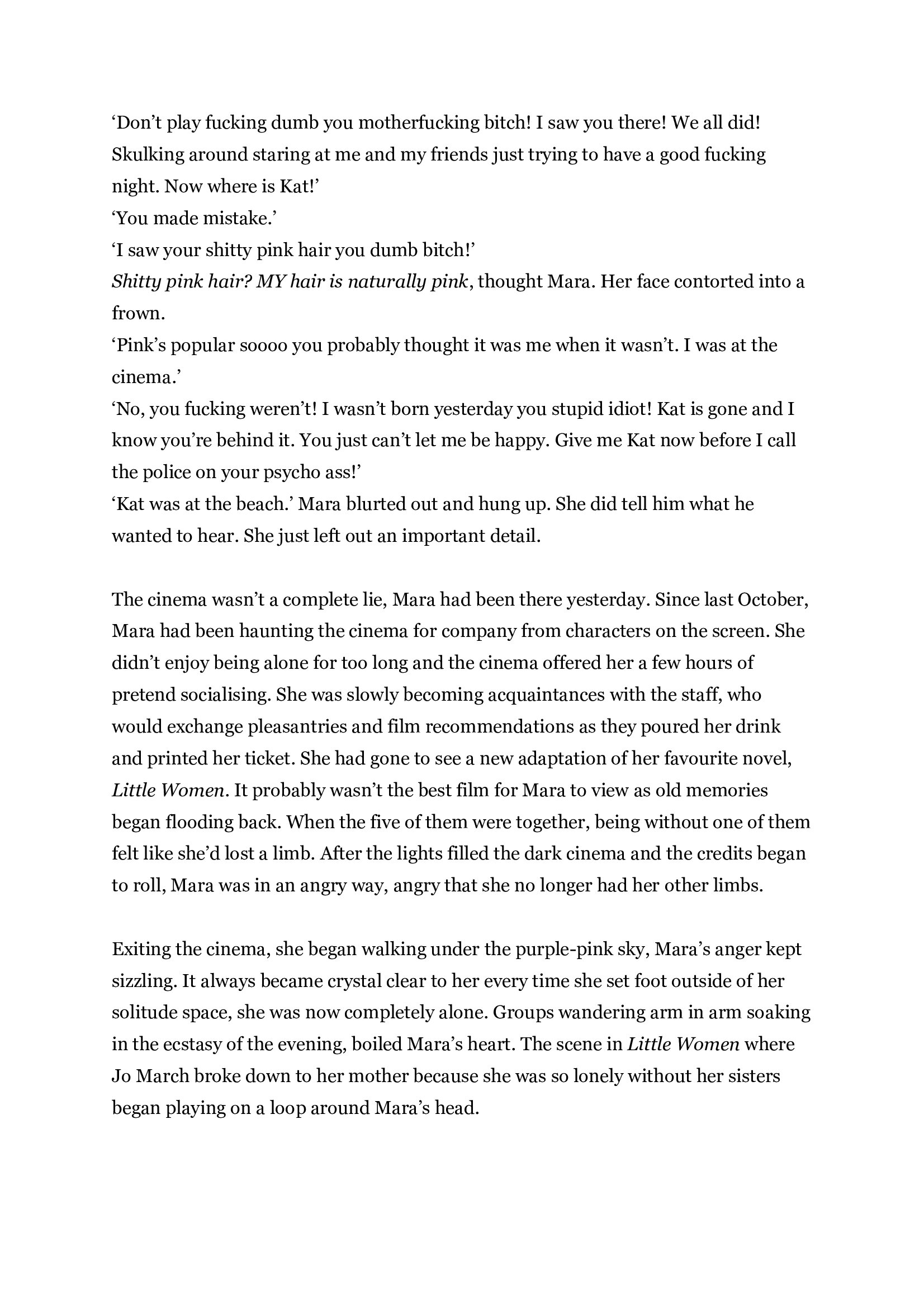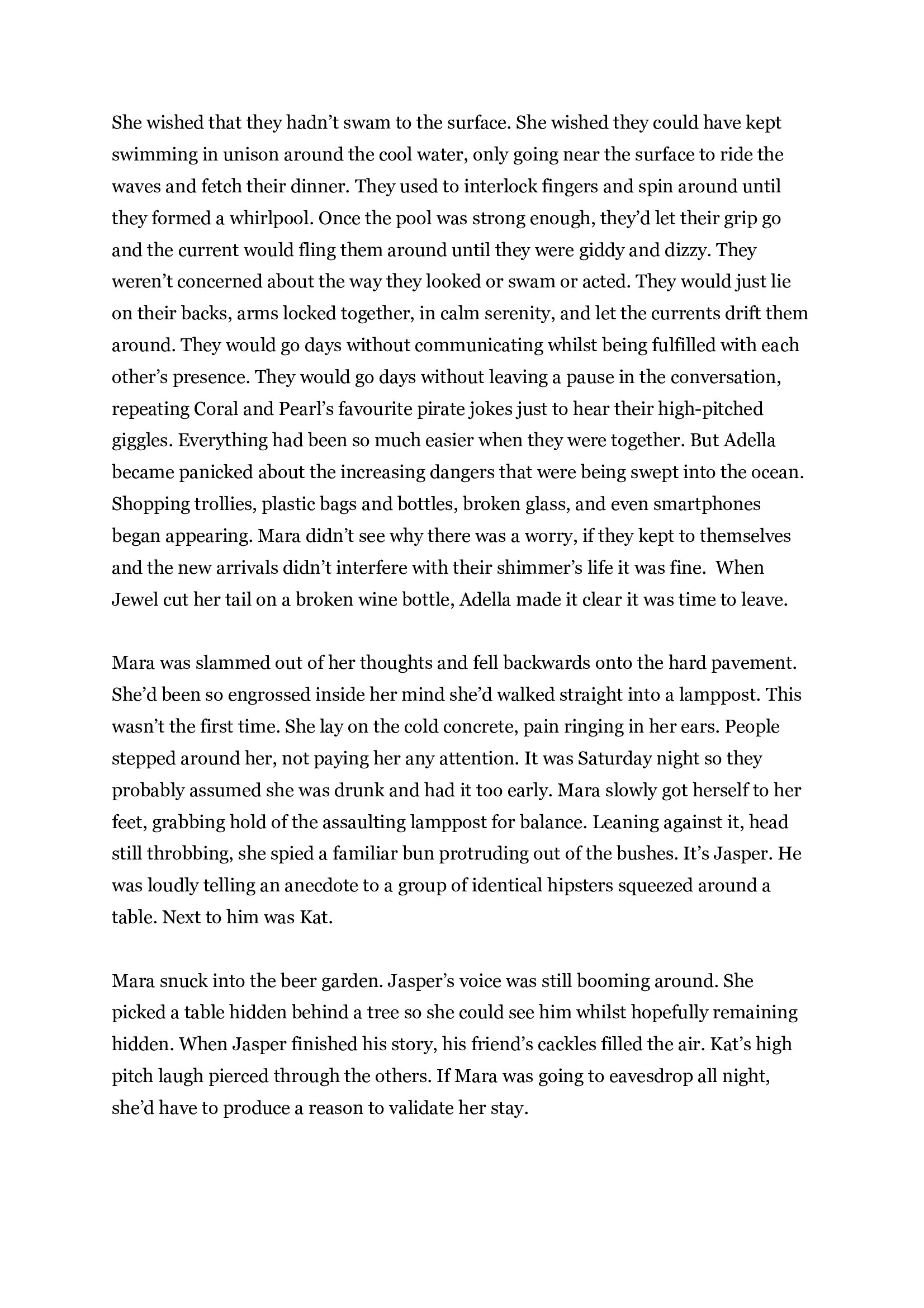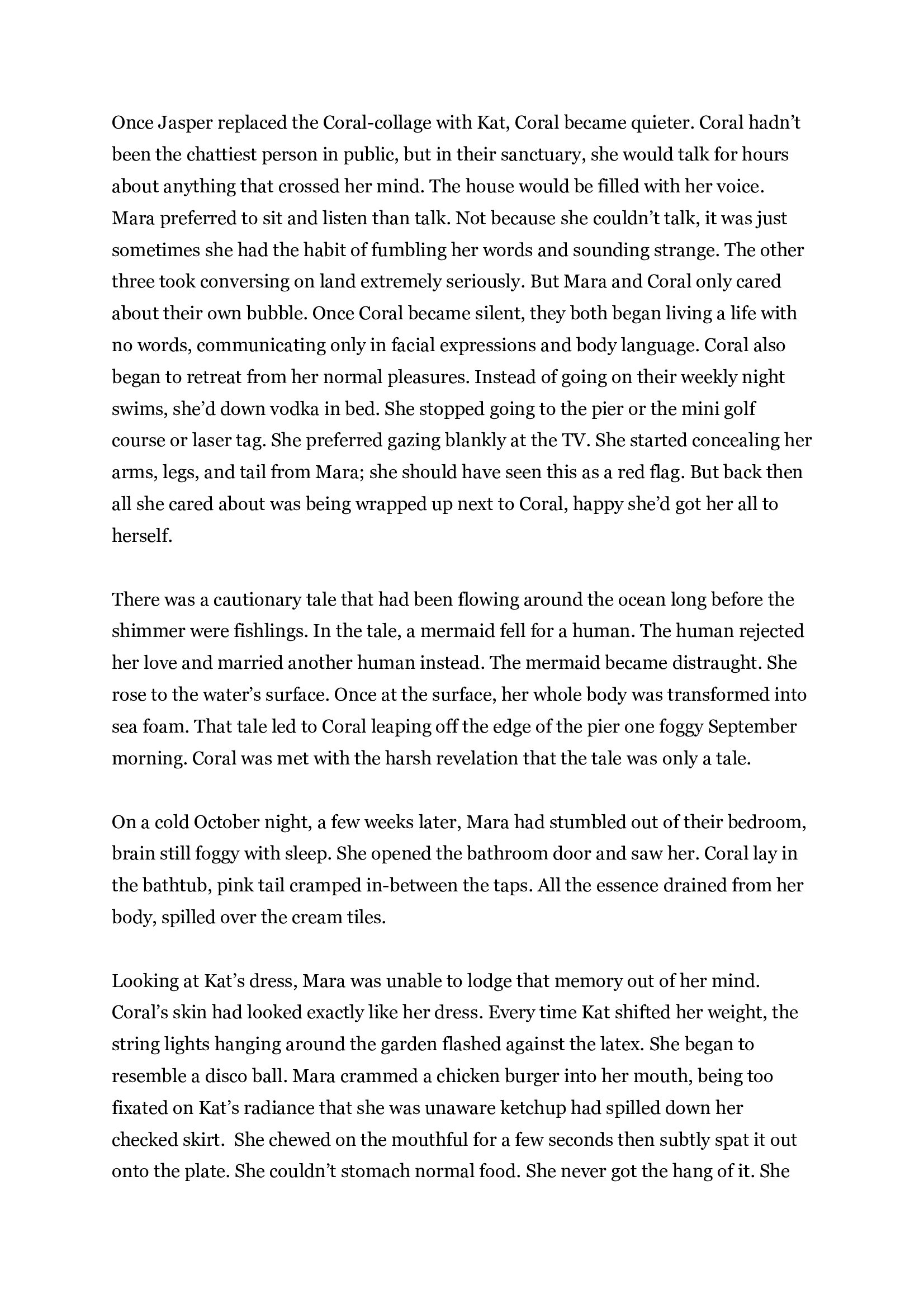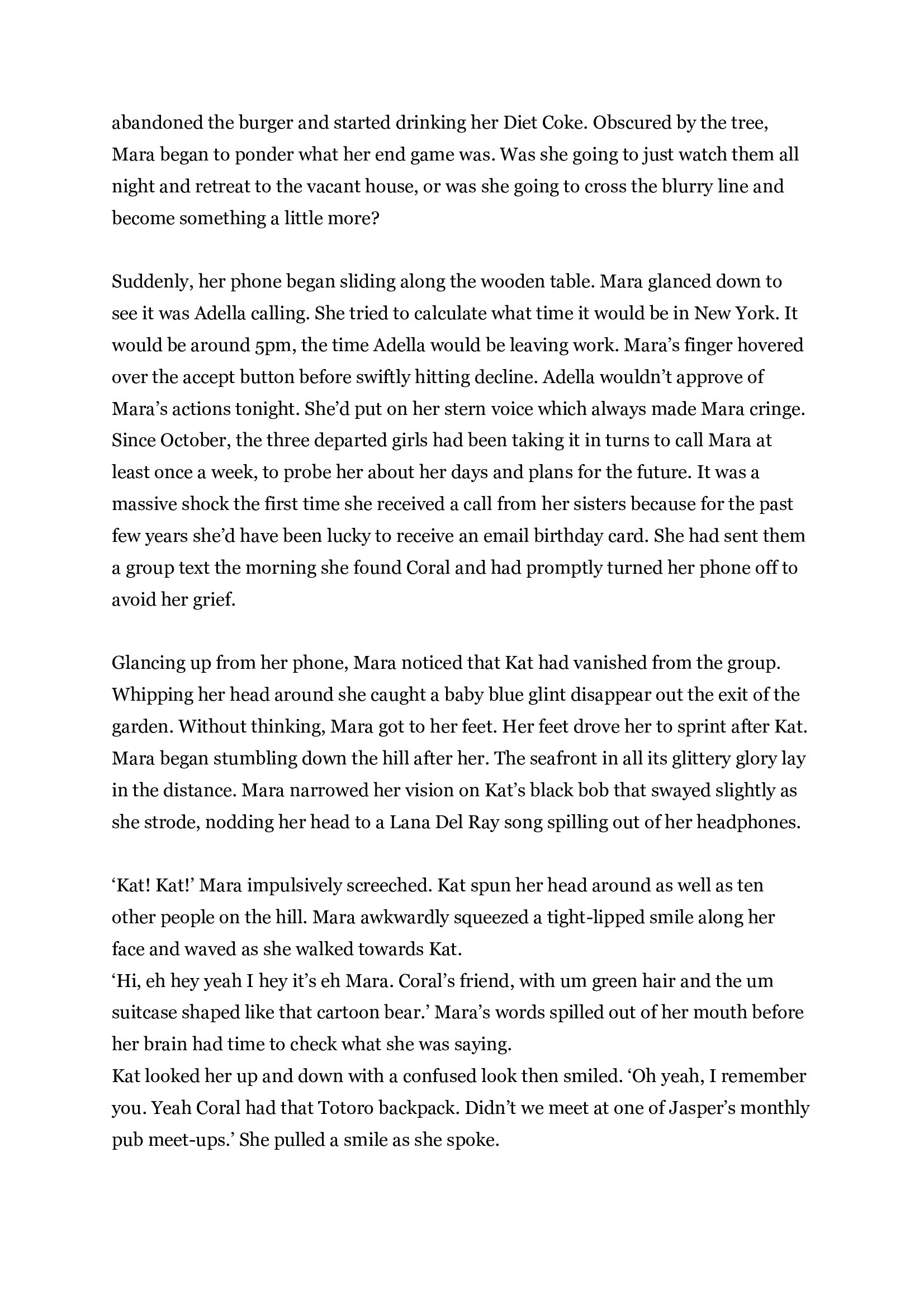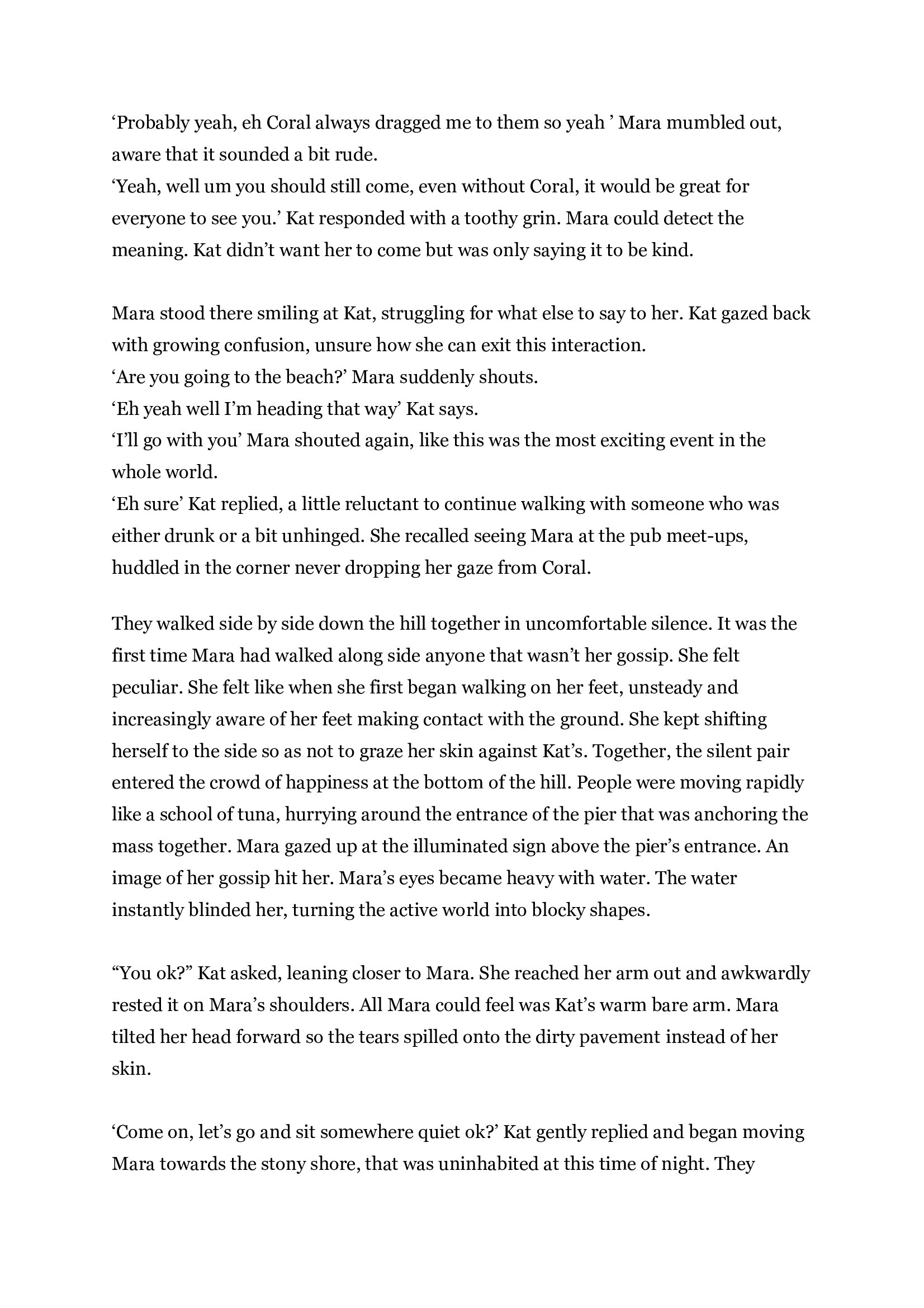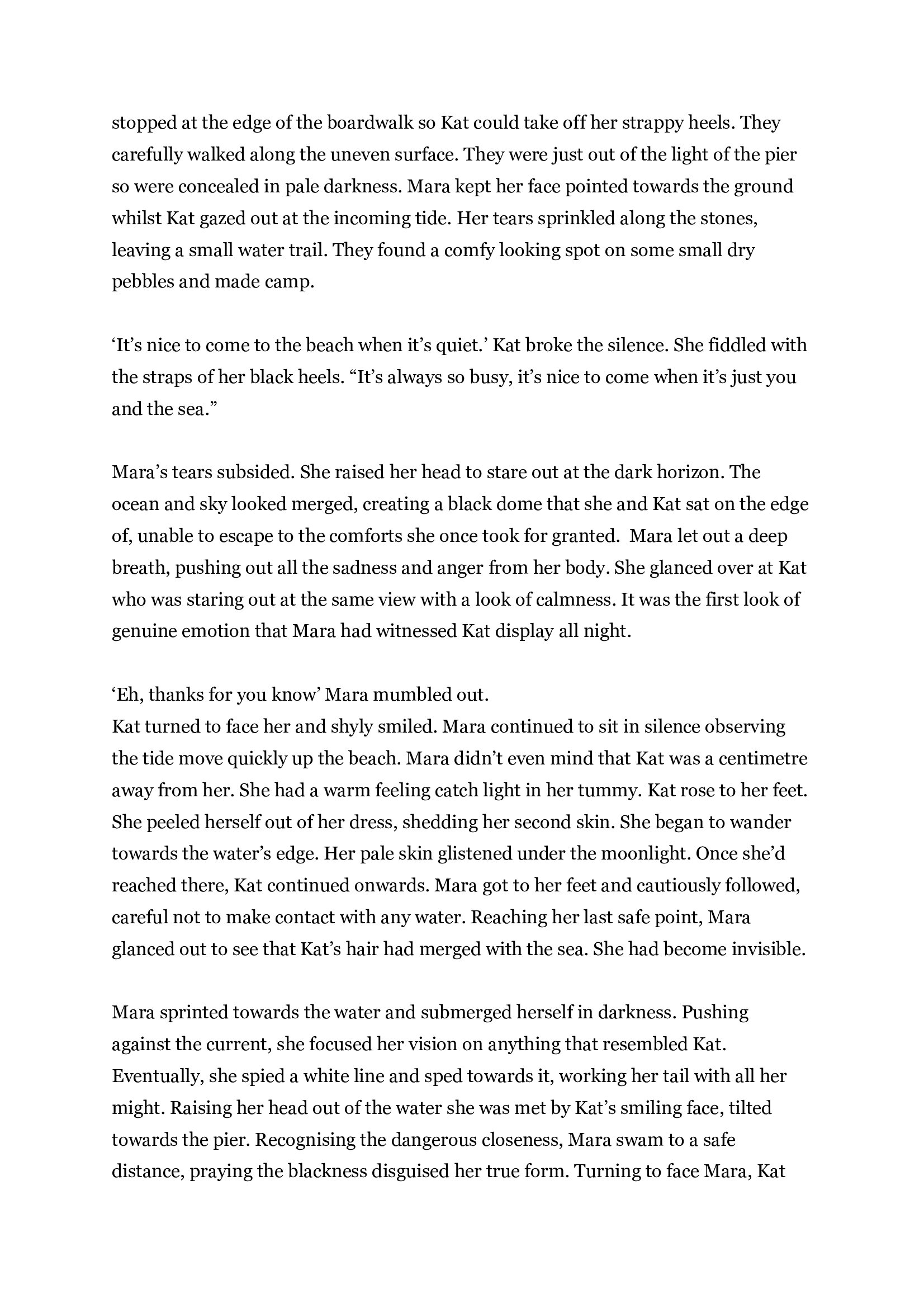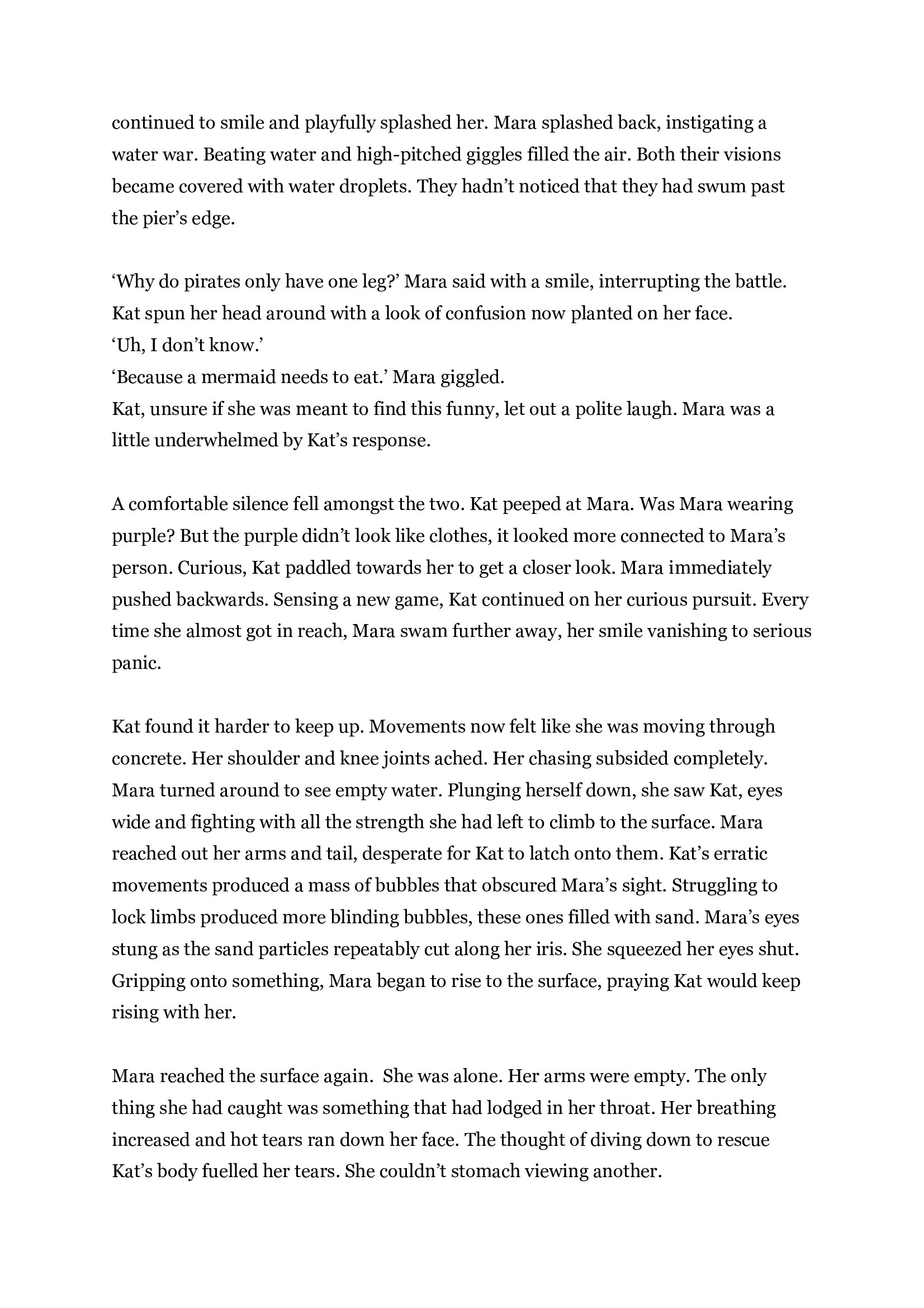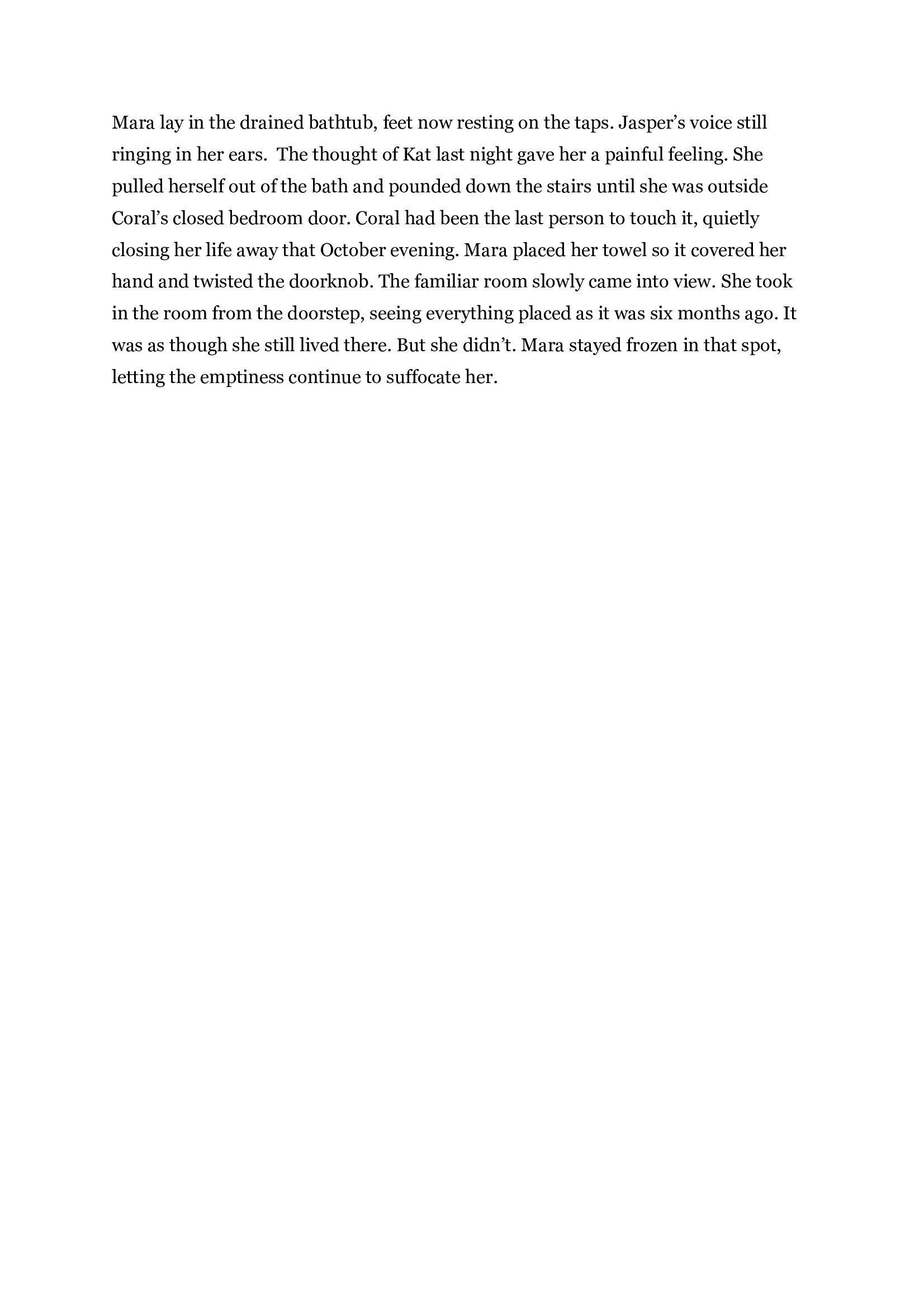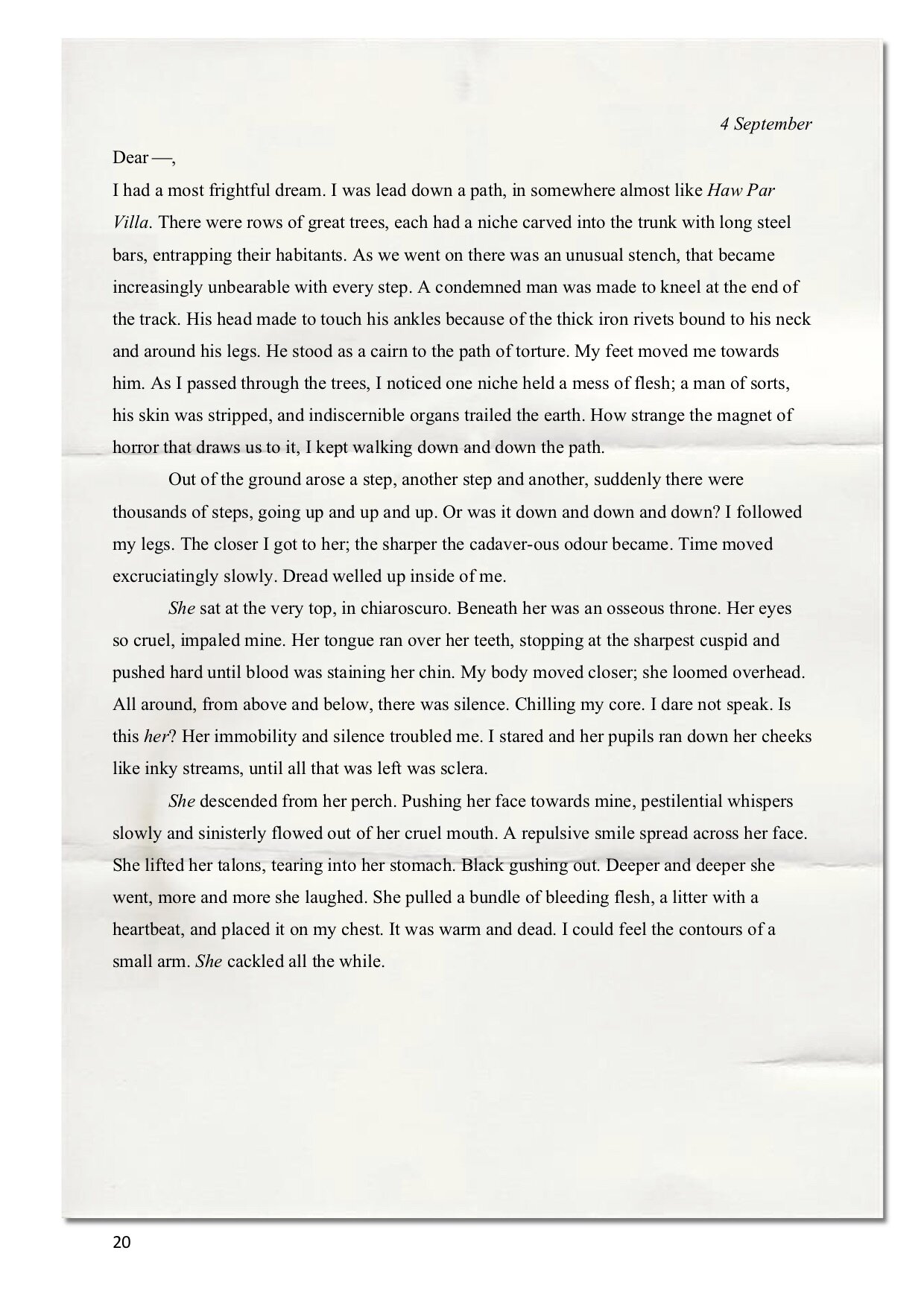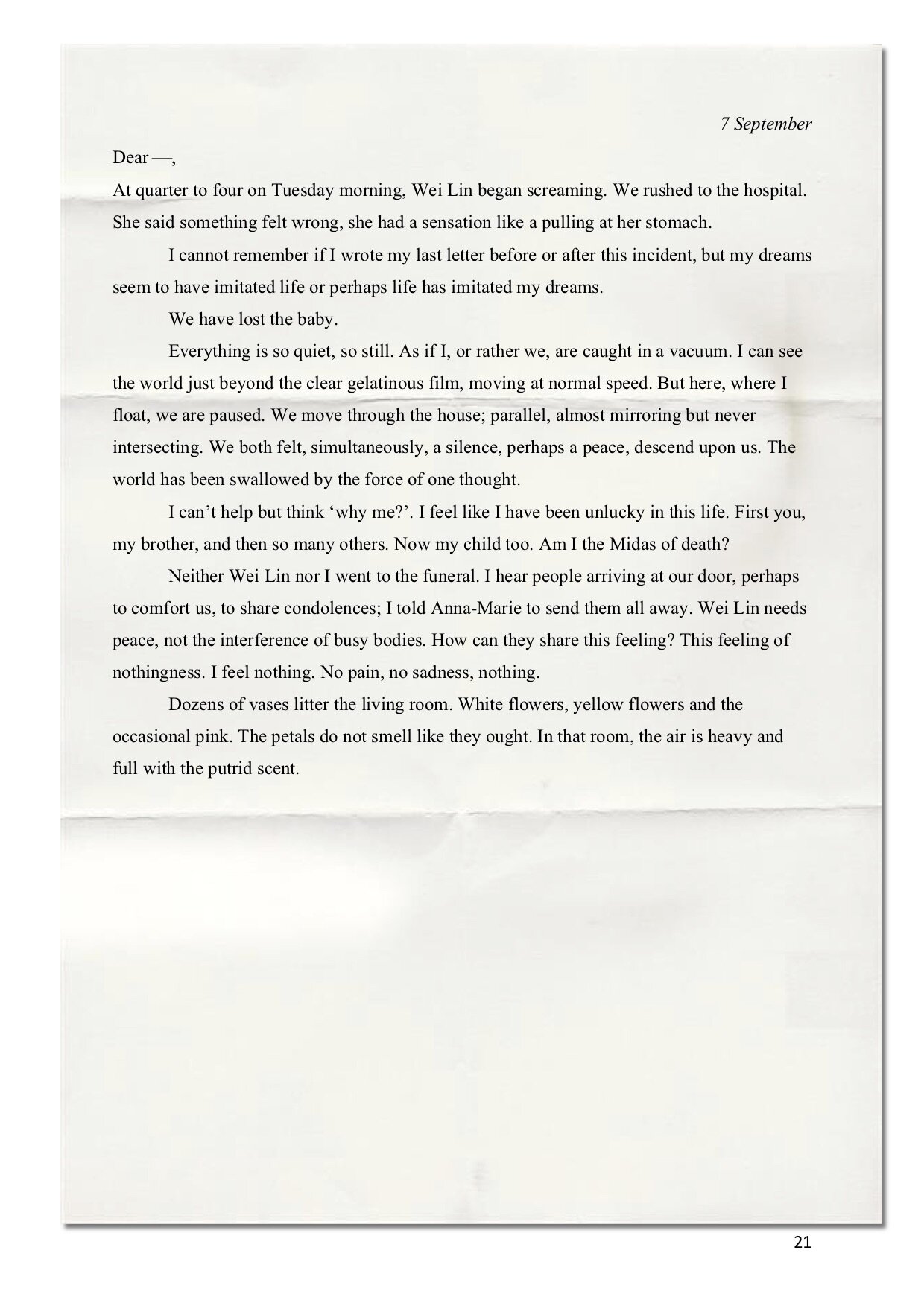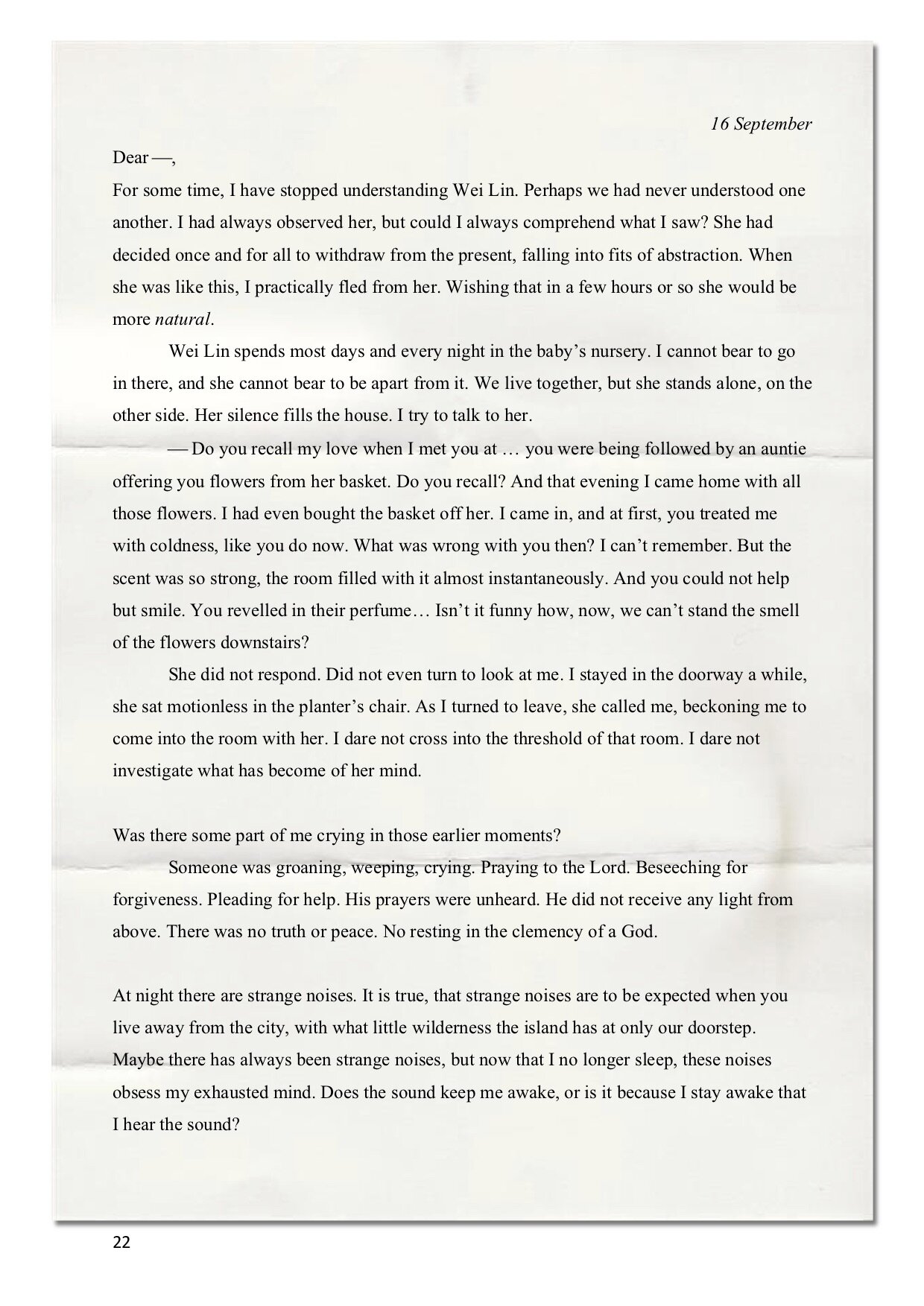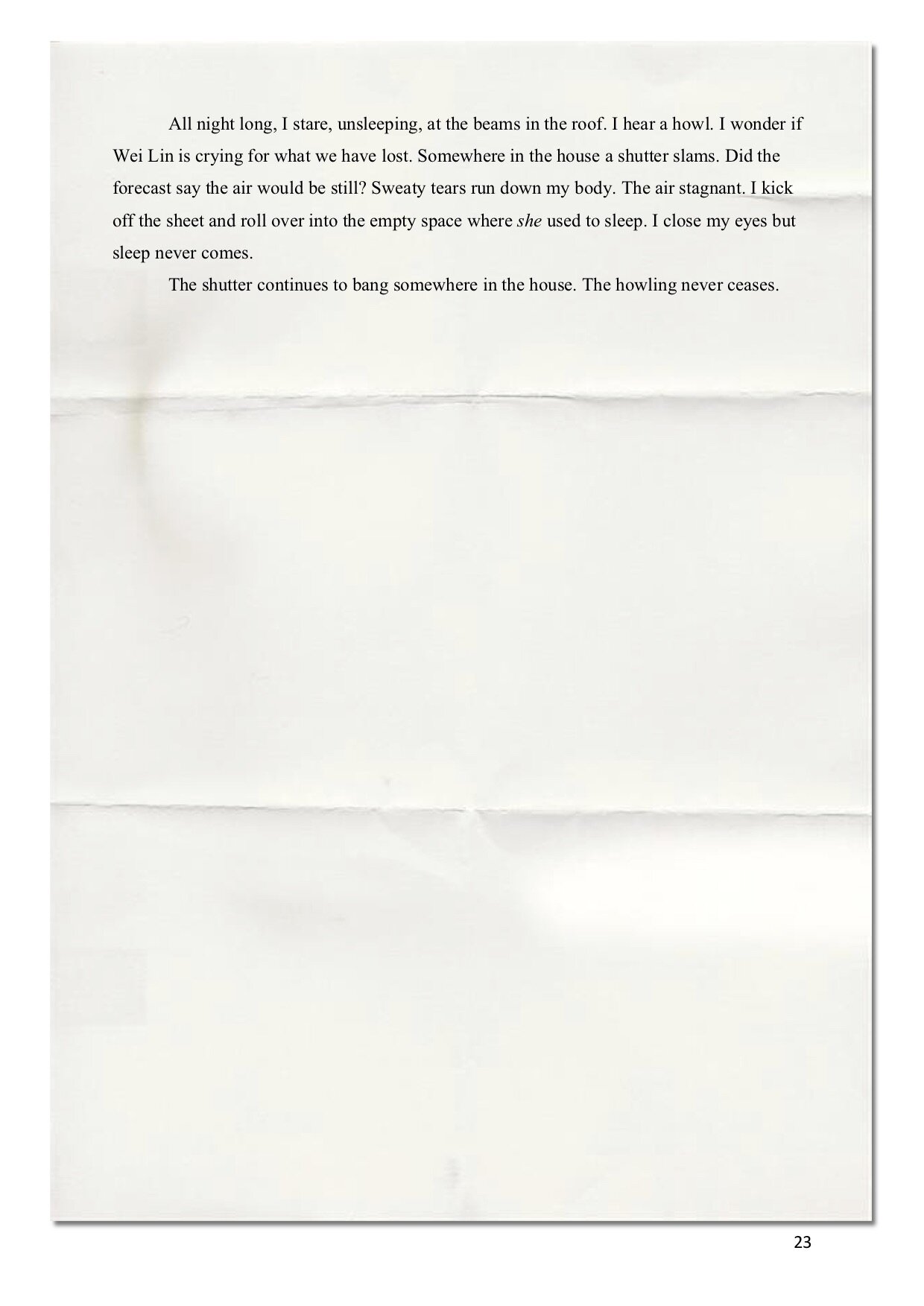Top Boy Meets Oliver Twist
by Seb Duncan






By Seb Duncan
Seb Duncan is a graduate of the Creative Writing and Education MA. He also holds a PGCert in Teaching Creative Writing from The University of Cambridge. His novella Headcase: A Post-truth ghost story is a gothic detective story that examines the intersection between fake news and myths (https://www.amazon.co.uk/Headcase-Post-truth-ghost-Seb- Duncan-ebook/dp/B093TJBP3R). He is the owner of The Red Ink (www.theredink.co.uk), an English language coaching company. His new novel The Book of Thunder and Lightning is available for pre-order from all good bookshops or directly from the publisher here: https://www.collectiveinkbooks.com/roundfire-books/our-books/book-thunder-lightning-novel
Edited by Louis Chapman
Lunchtime
by Izzy Judd
Content warning, reader discretion advised.







By Isabel Judd
This is a story about obsessive love within a gay relationship. I created this story in my second year of university which was a delight among the deeply stressful atmosphere that I was presented with. This is a creation dear to my heart and I hope those reading it enjoy it as much as I did creating it.
Isabel Judd is a 21 year-old English and Media student at Goldsmiths. During her first year, she was chosen to become a chief editor of Golddust, which shone a new light into her enjoyment of university. Since running the magazine, her creative endeavours have ever increased. She primarily writes horror stories as part of her degree, which she thoroughly enjoys and would like to continue in a possible career later in life. Izzy writes poetry in her spare time, usually abiding by themes of loss, grief and sometimes love. Her stories often have a deeper meaning aligning to her life, but expressed sometimes though humour and/ or horror, which can be seen through Lunchtime.
instagram- @izzyyjudd
Golddust Editor- Louis Chapman
The Stuff of Stupid Teenage Dreams
By Ellis Fox
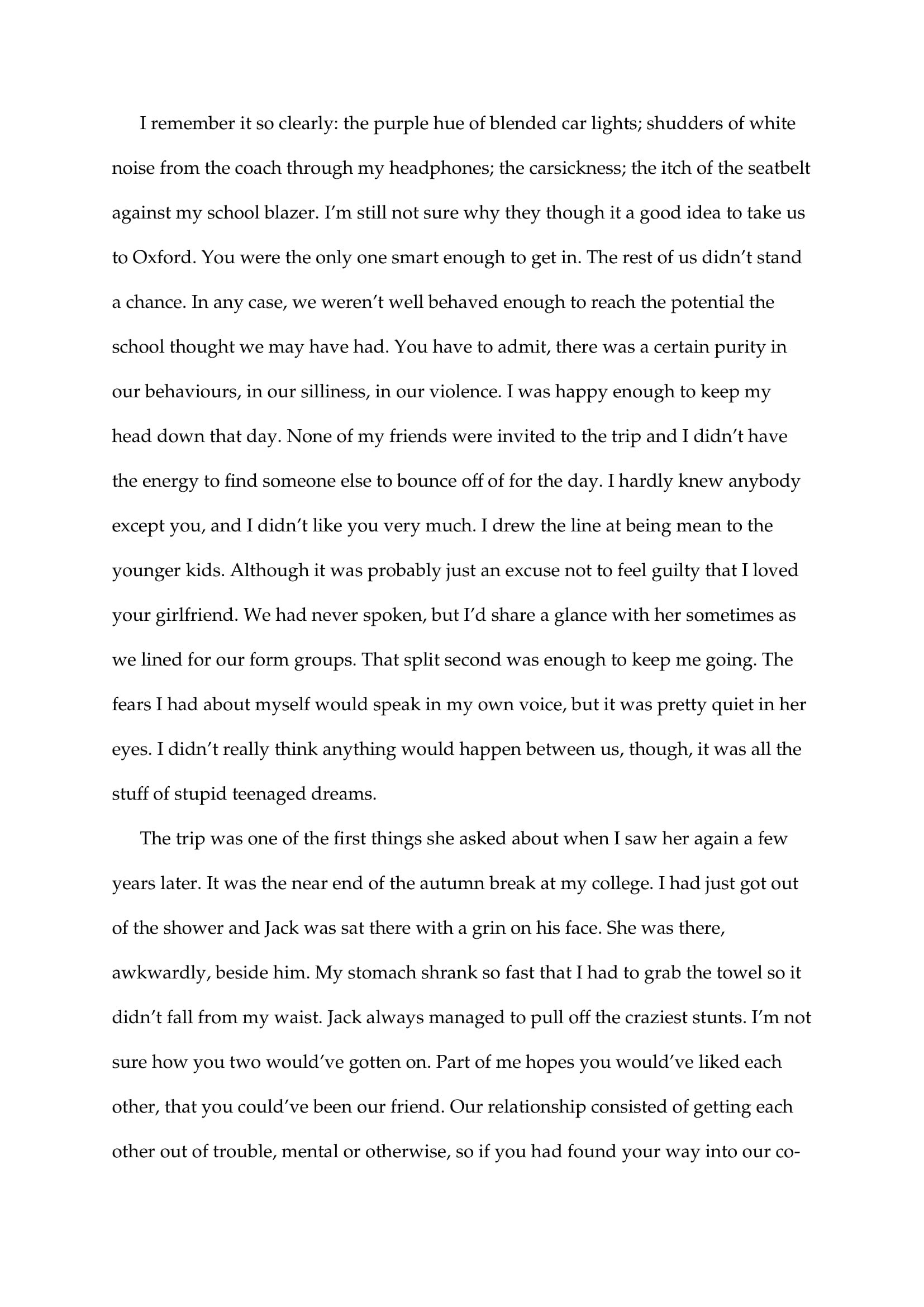
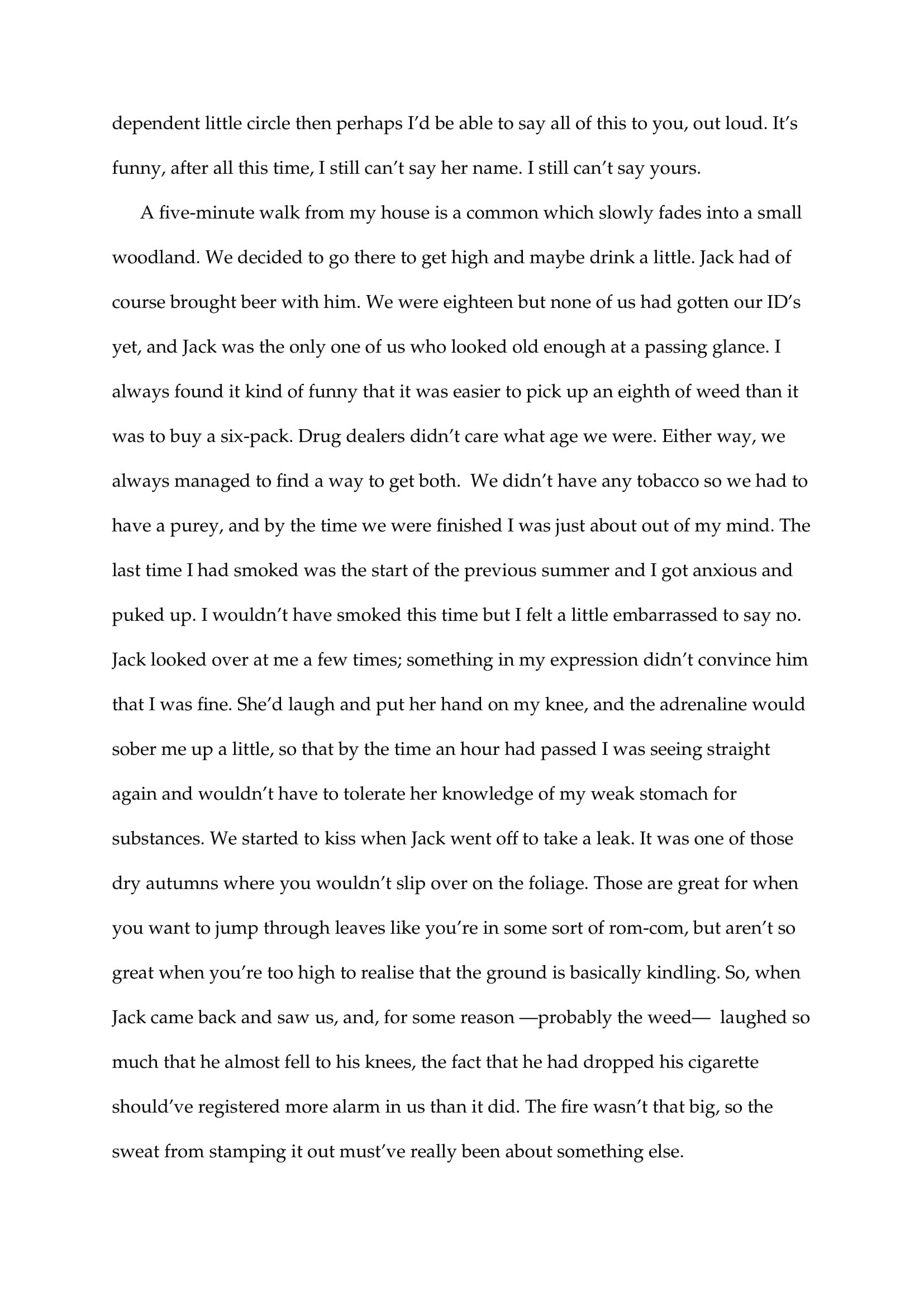
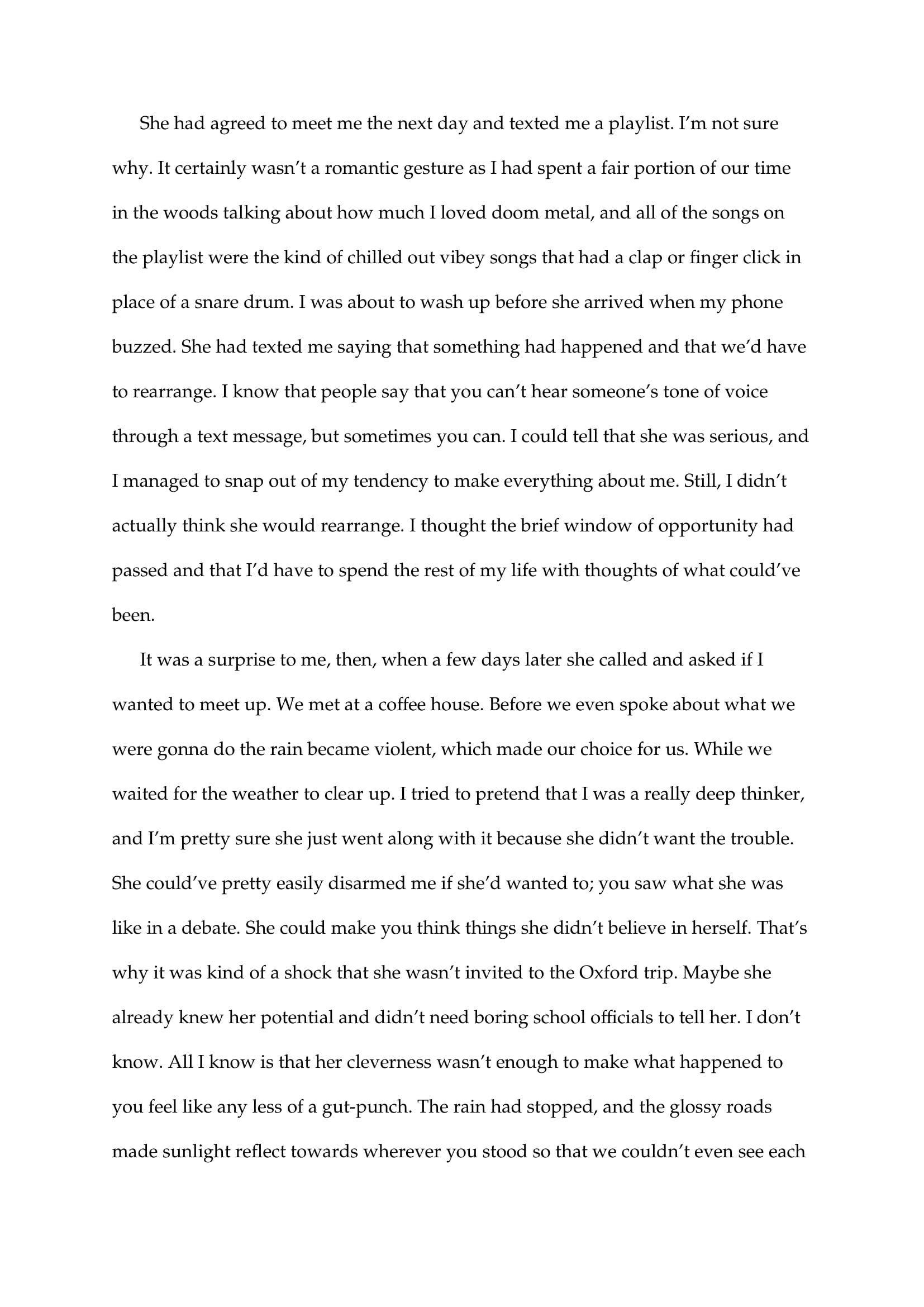
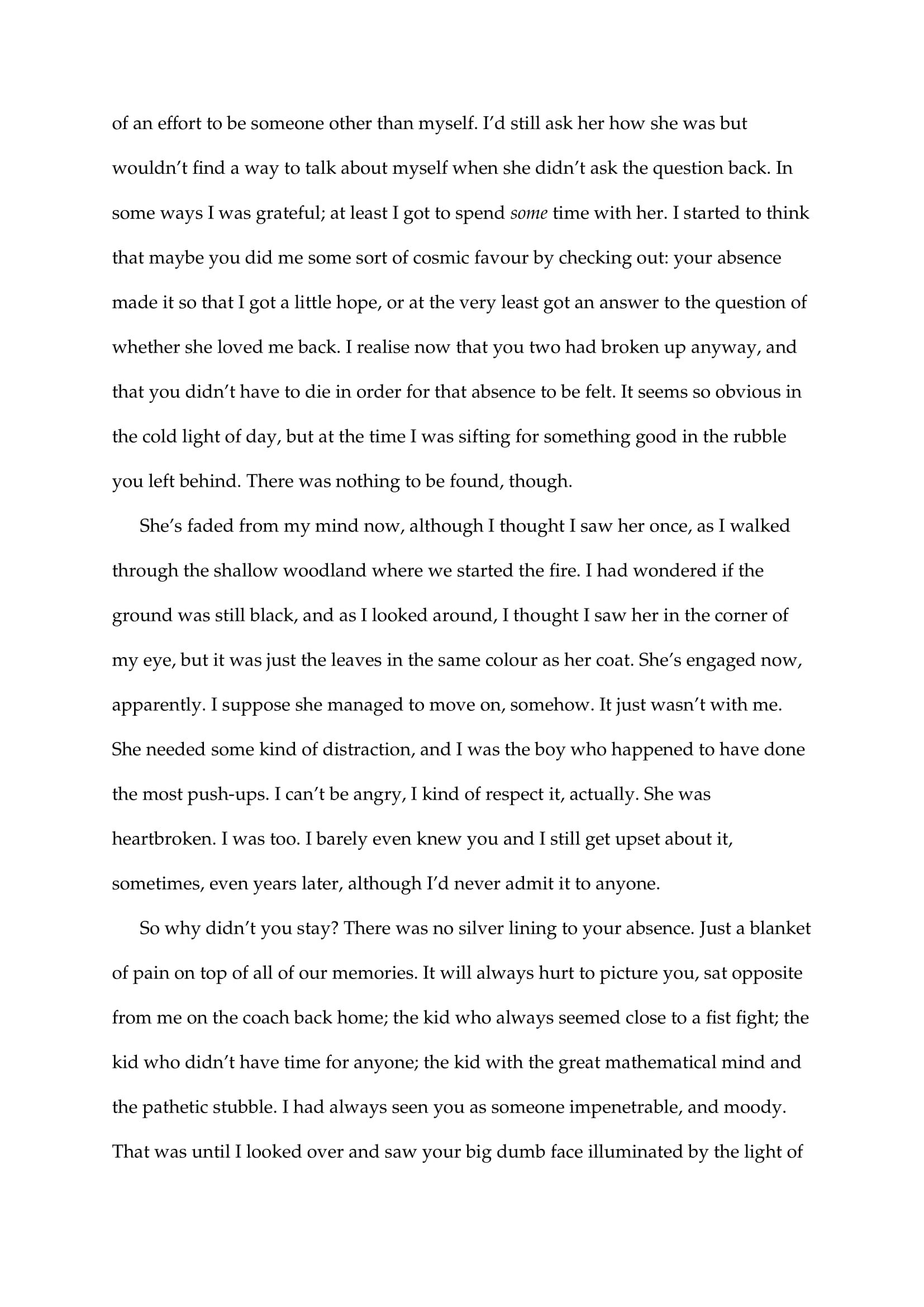
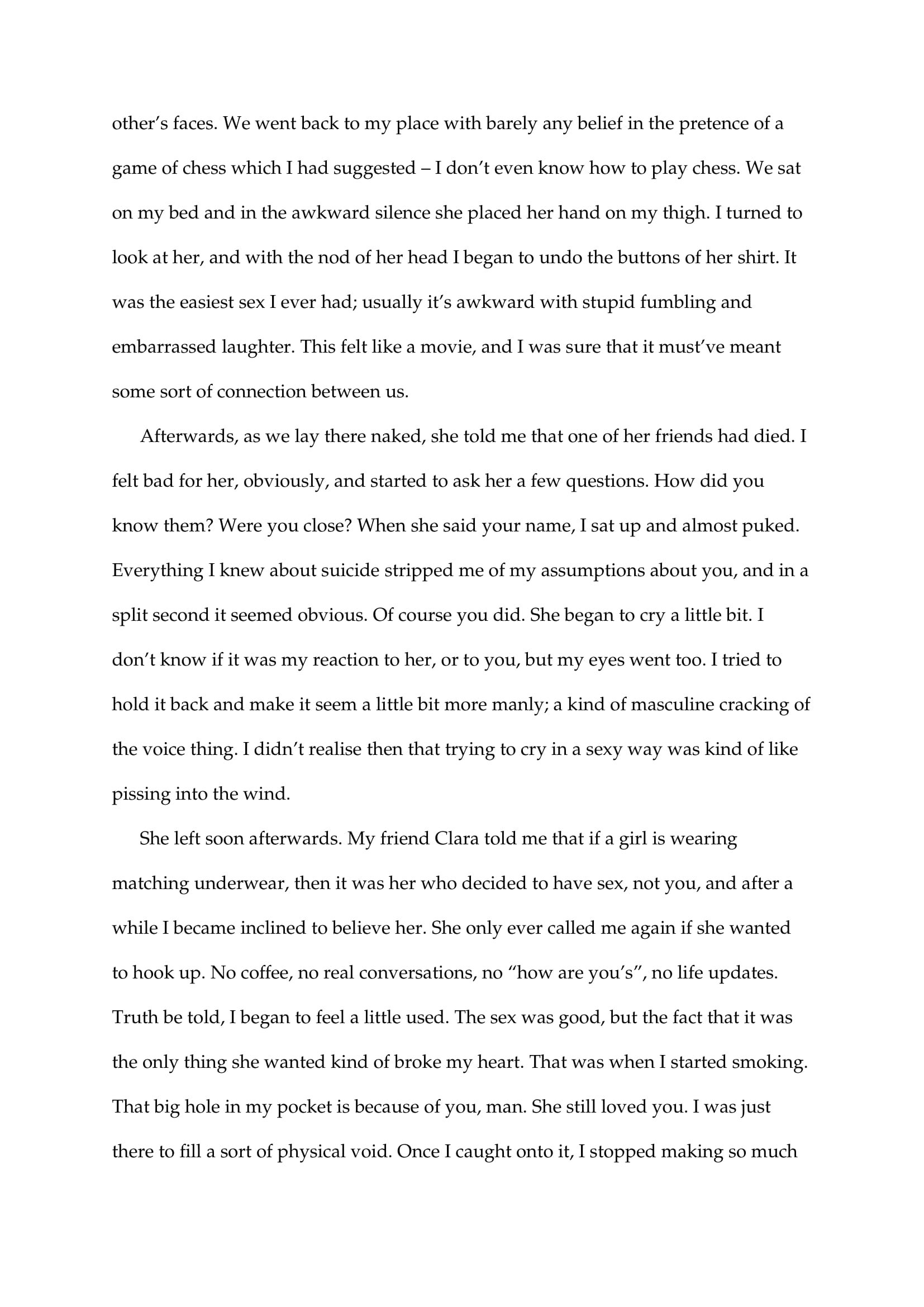
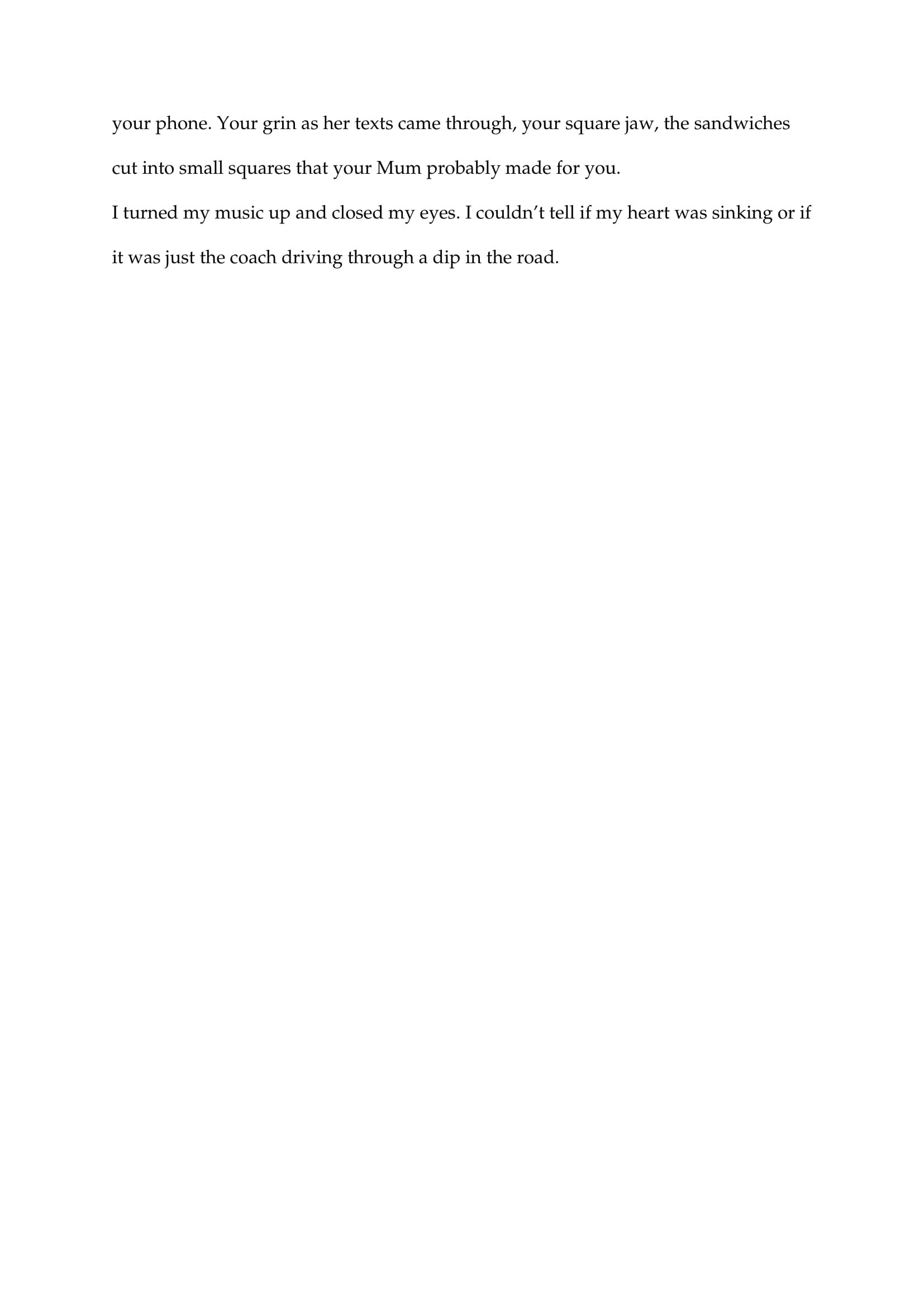
By Ellis Fox
I wanted to write a piece about how love doesn’t always stack up to real, grown-up, desperate, and tragic kinds of memory and grief.
Ellis Fox is a 23-year-old writer and musician from London, England. He is currently completing his MA in Literary Studies. He primarily writes short stories and non-fiction articles, however he has written poetry and is set to publish a chapter in an upcoming book about the pandemic. His literary subjects include political and social concerns (e.g., climate change and austerity), as well as relationships, love, and intimacy. These are frequently foregrounded and explored through his personal struggles with depression and anxiety.
Instagram - @ellisfoxguitar
Golddust Editors - Louis Chapman and Isabel Judd
I think I'm nineteen
By Jai Rajwadi



By Jai Rajwadi
These two pieces explore my relationship to the ‘female’ body as something which is naturally everchanging. My writing piece looks at my own experience growing up with a ‘female’ body, in a society which has many rules for how it should look in order to be deemed acceptable. It looks at how it might feel for your body to go through changes in different situations and time periods throughout growing up.
Jai Rajwadi is a second year Fine Art student from London, studying at Goldsmiths. They enjoy making work which explores their own relationship to the ‘female’ body, gender expression, and femininity as a non binary person. They do this through different mediums which include writing, drawing, and video work.
Instagram - @jairajwadiart
Editors Comments - Isabel Judd
Jai’s art resonates closely with me, as their work always depicts a unique way of expressing femininity. Many young people experience situations as described in their piece of prose, and it is eye opening and heart warming to have it written so eloquently, in such a relatable way. Paired with the drawings they have created, it depicts a visual representation of the themes discussed in their narrative.
Love Token
by Shayda Soleiman
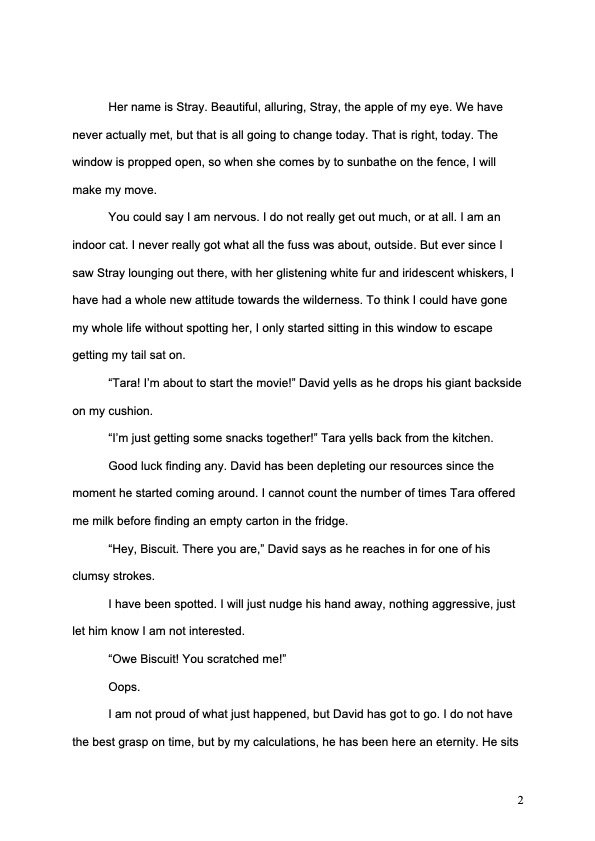










by Shayda Soleiman
This was my final piece for first year Creative Writing. I am still very attached to the character of Biscuit and hope to be like him when I grow up.
Shayda is a third-year Media and Communications student at Goldsmith’s. She enjoys writing satire and humorous fiction, especially stories involving non-human characters. Her hobbies include hot chocolate and sitting under a blanket, and she believes two things made her the woman she is today: growing up somewhere extremely rainy, and her childhood crush on John Travolta.
from the Editor
This is an amazingly cute story about house cat going outside for the first time. Its funny, witty, and makes me appreciate my cats at home more.
Frederic Hall
The Circus
by Seb Duncan
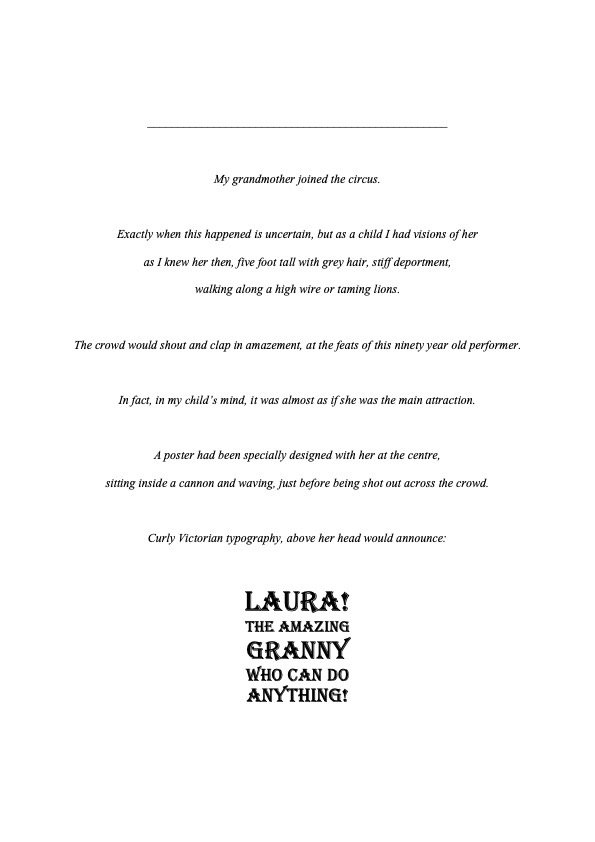
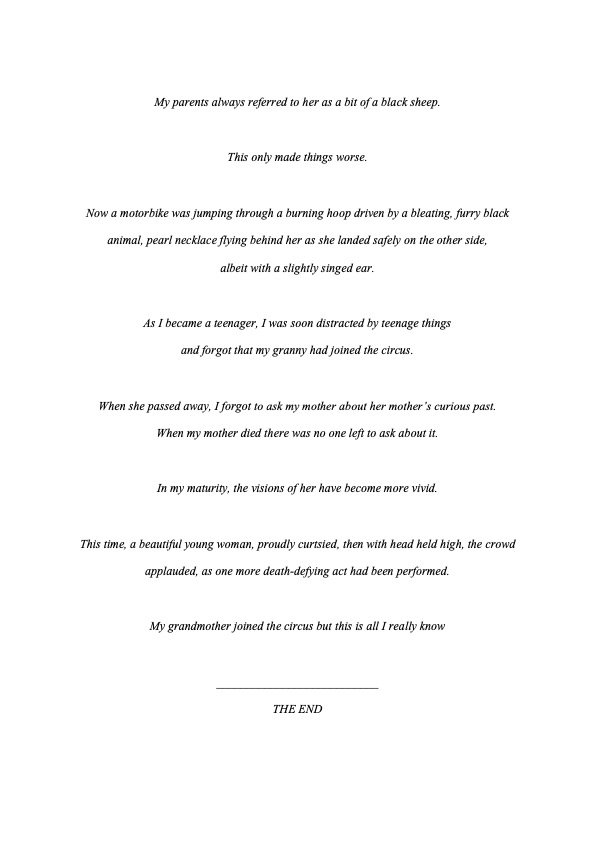
by Seb Duncan
Seb Duncan is a student on the Creative Writing and Education MA.
He holds a PGCert in Teaching Creative Writing from The University of Cambridge. His novella Headcase: A Post-truth ghost story is a gothic detective story that examines the intersection between fake news and myths. He is the owner of The Red Ink, an English language coaching company. He is currently working on a full length novel, The Book of Thunder and Lightning.
He can be found on Twitter at Seb Duncan @opinionfodder.
edited by Ingrid (Squiddy).
What color means to me
by Saanika
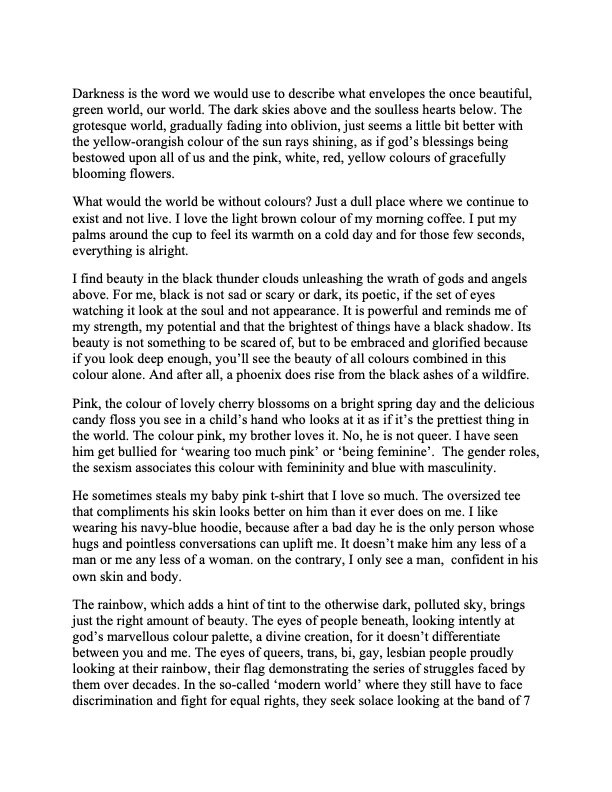
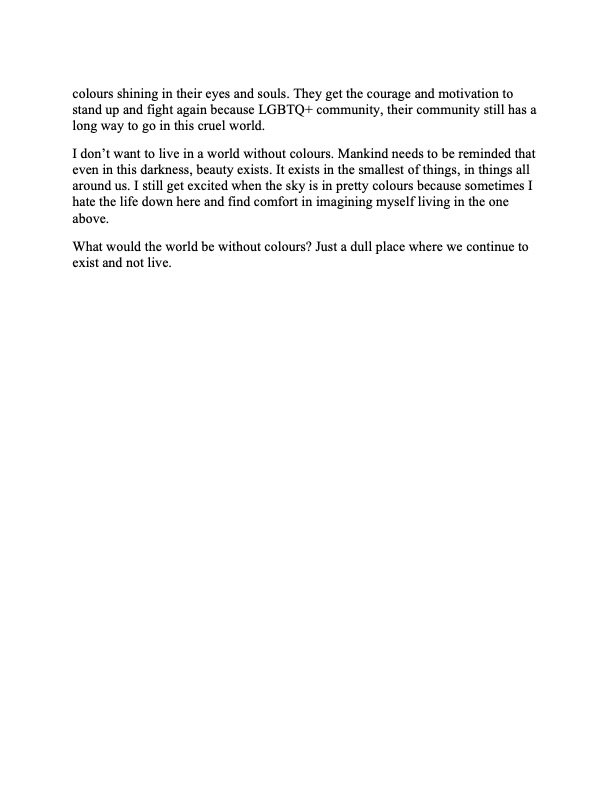
Saanika is a first-year student studying BA promotional media. She has an immense passion for writing and wants to pursue travel journalism in the future. Previously, she has worked with various charities and NGOs working towards women's empowerment and the upliftment of the underprivileged.
She can be found on Instagram at saanika.b_.
edited by Frederic Hall
The thing closest to my heart
by Saanika
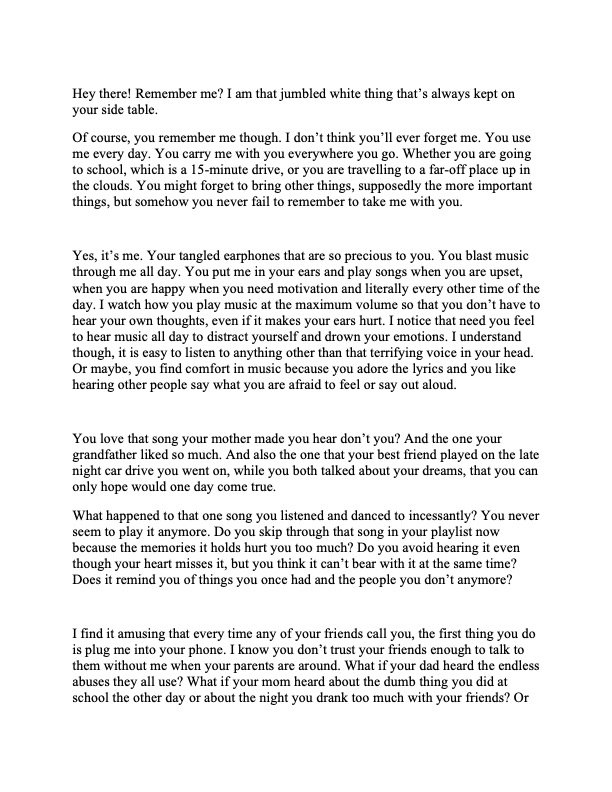
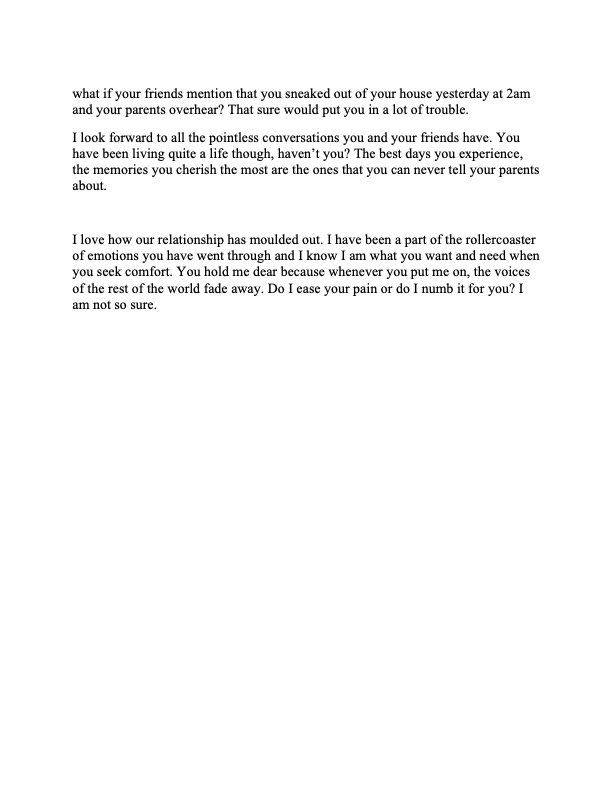
by Saanika
Saanika is a first-year student studying BA promotional media. She has an immense passion for writing and wants to pursue travel journalism in the future. Previously, she has worked with various charities and NGOs working towards women's empowerment and the uplifting of the underprivileged.
She can be found on Instagram at saanika.b_.
edited by Frederic Hall
The Jukebox
by Saanika
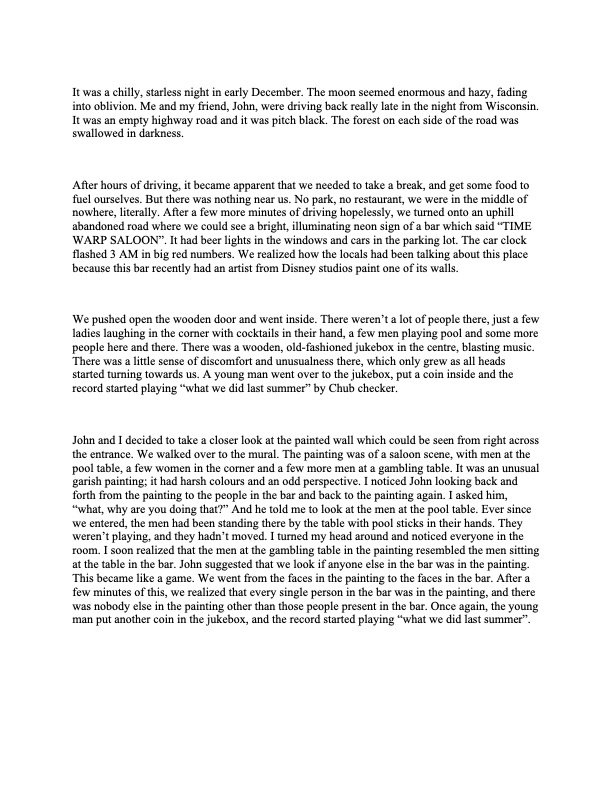
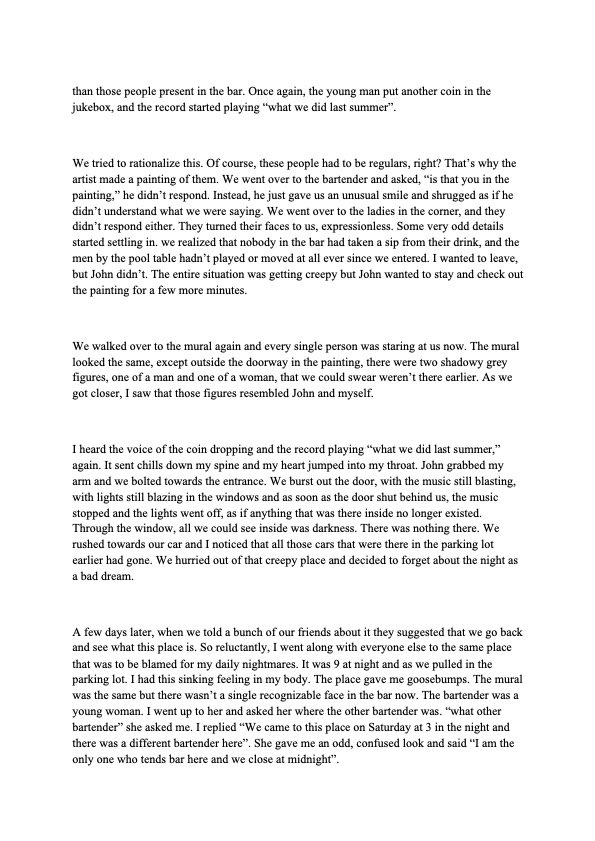
by Saanika
Saanika is a first-year student studying BA promotional media. She has an immense passion for writing and wants to pursue travel journalism in the future. Previously, she has worked with various charities and NGOs working towards women's empowerment and the uplifting of the underprivileged.
She can be found on Instagram at @saanika.b_.
edited by Frederic Hall
Anna
by Sean Connolly

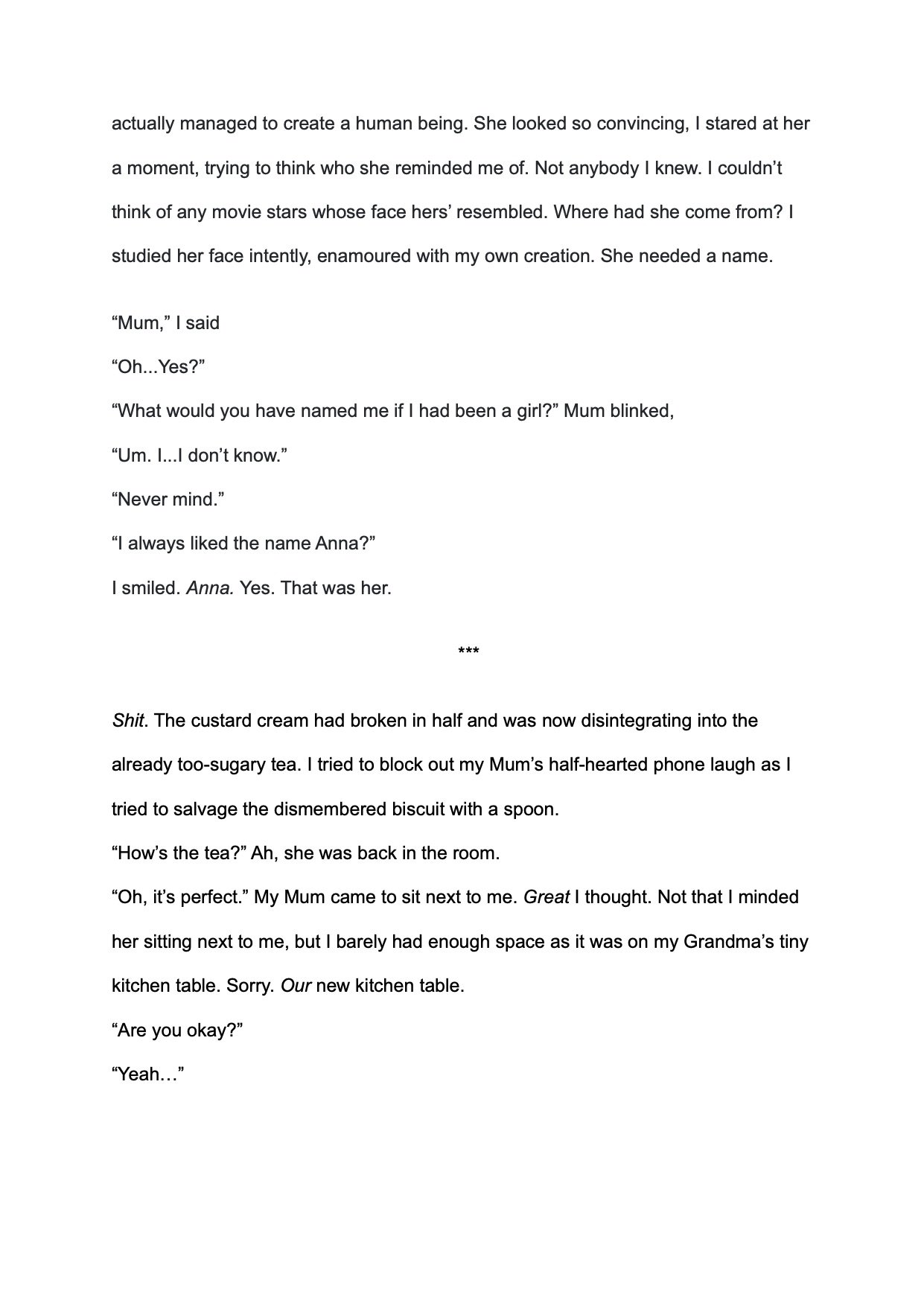
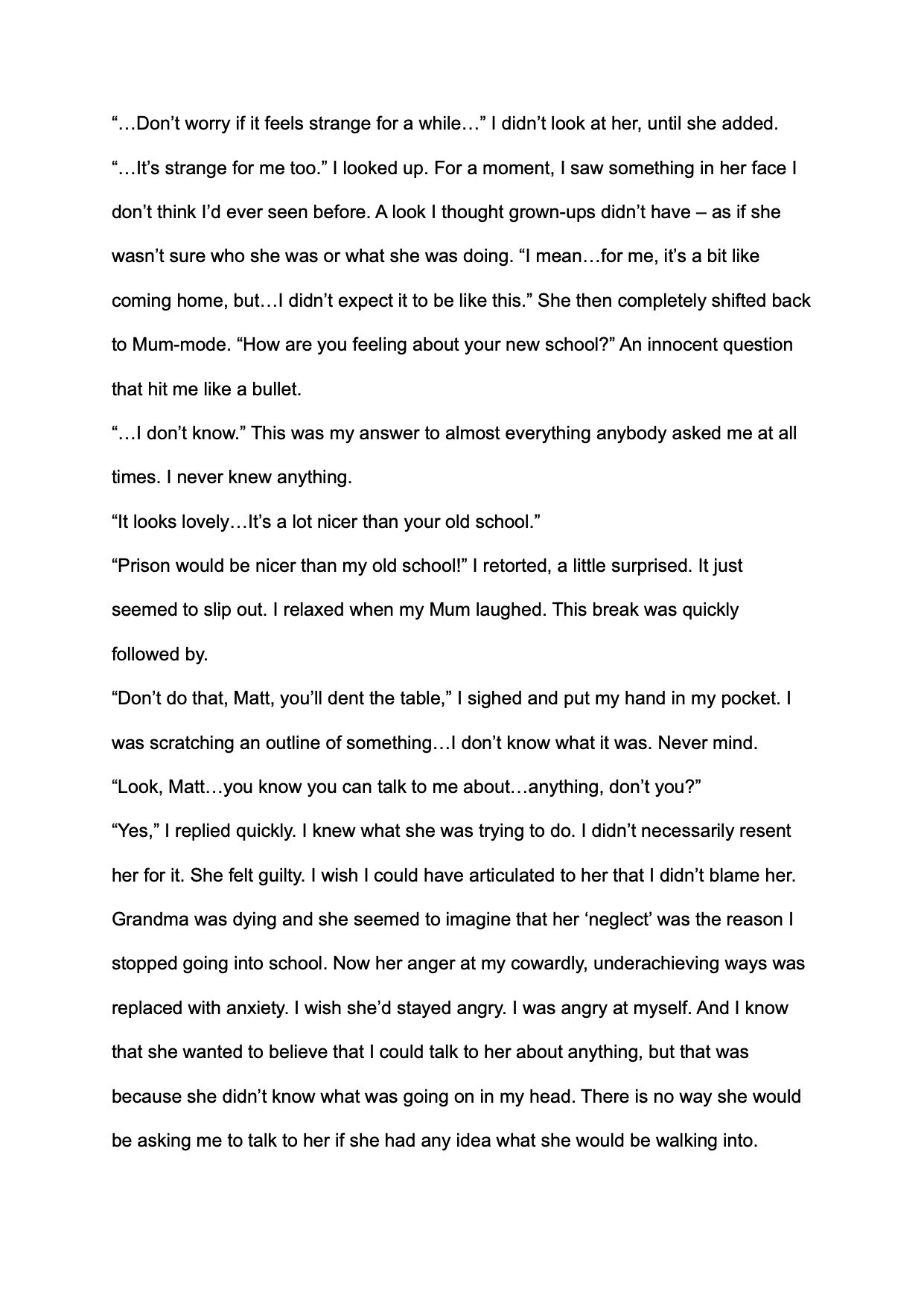
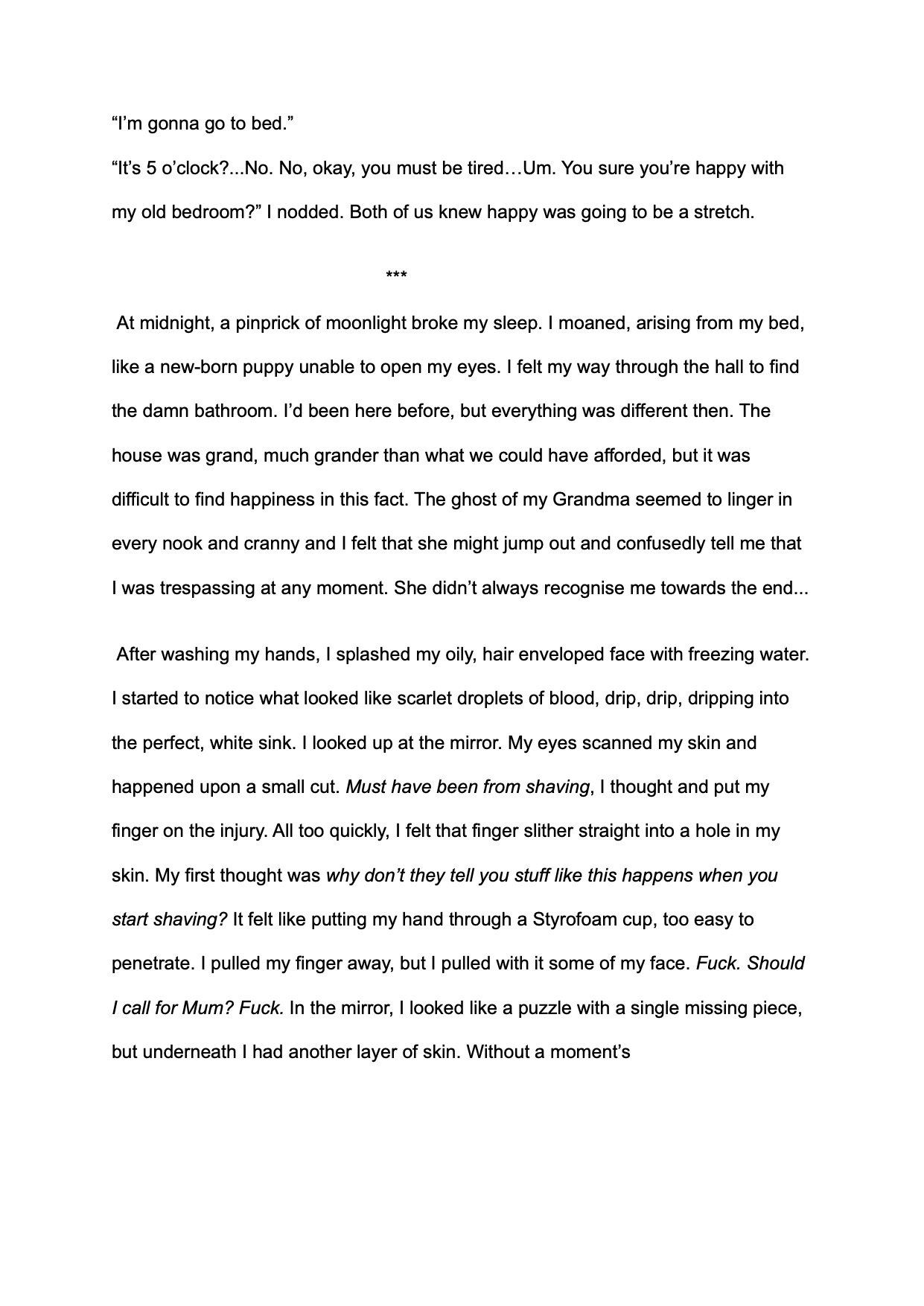
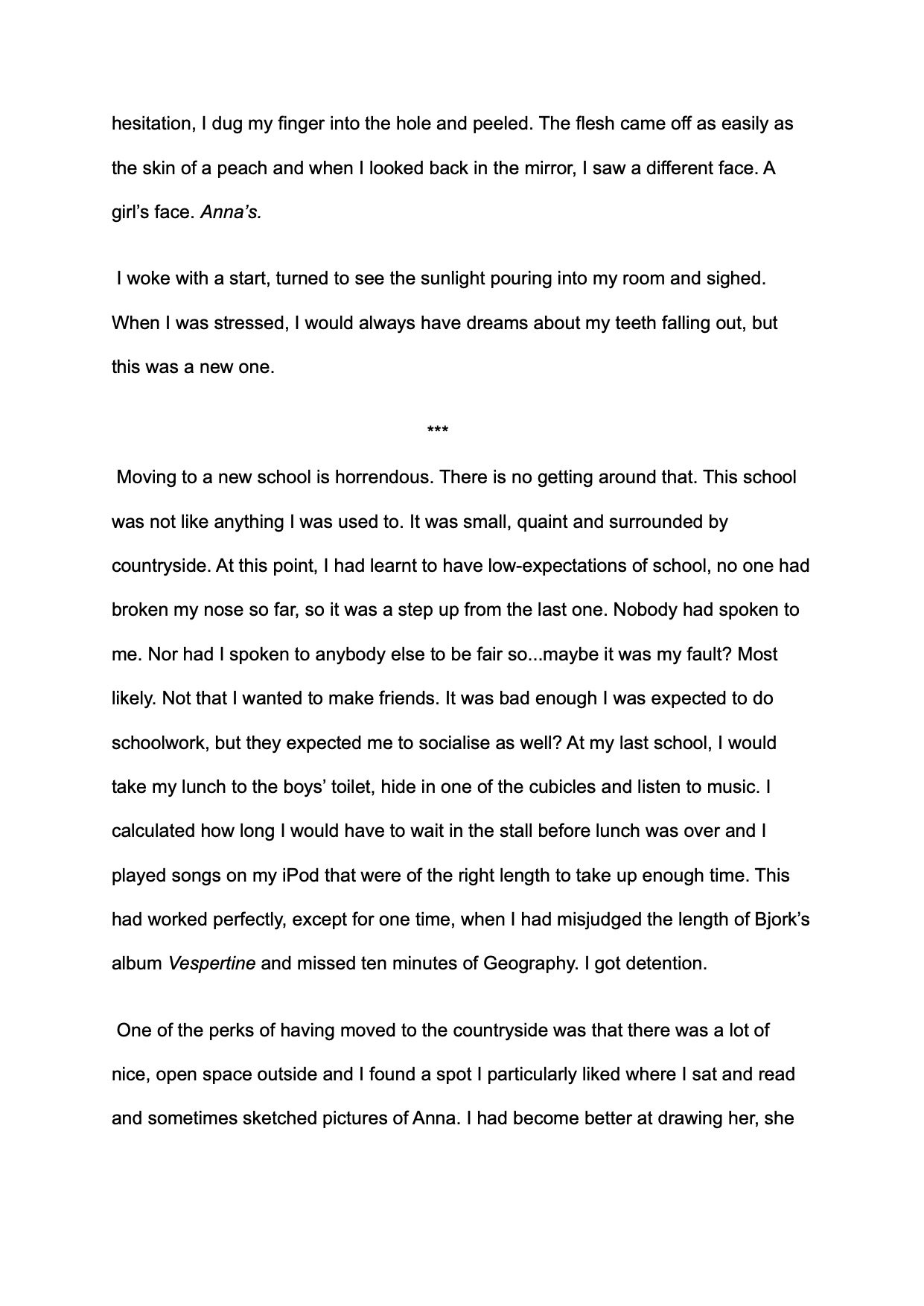
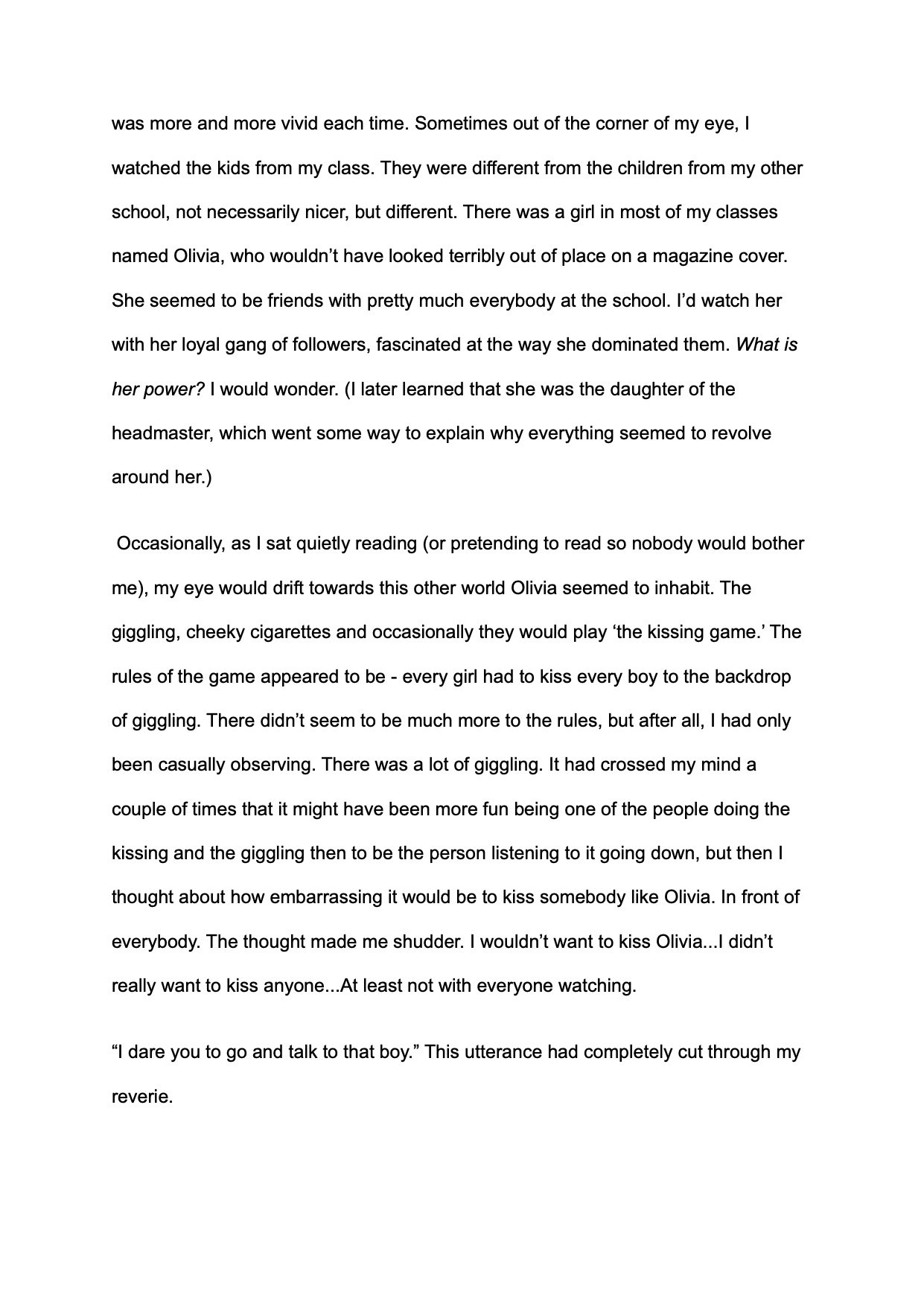
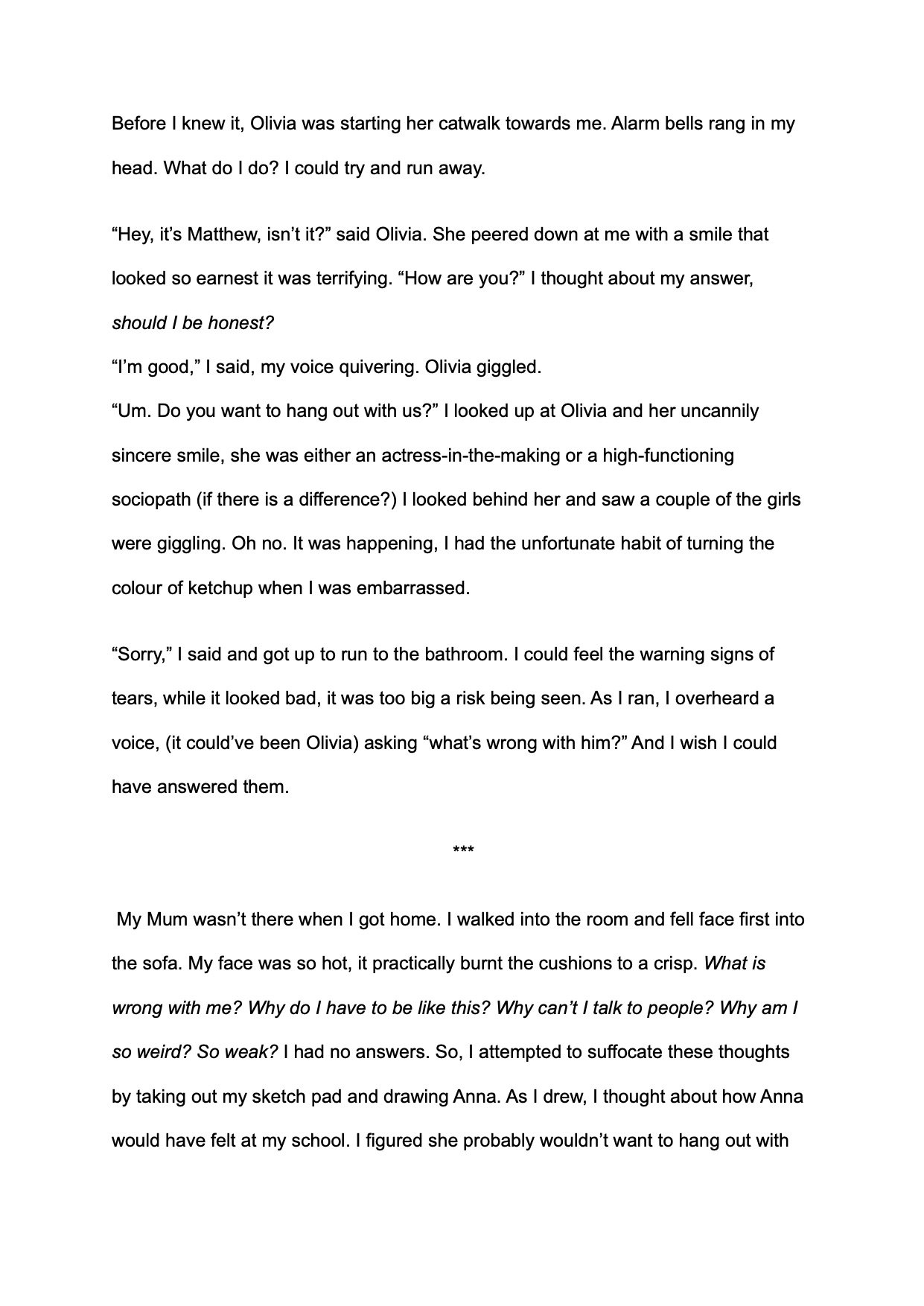
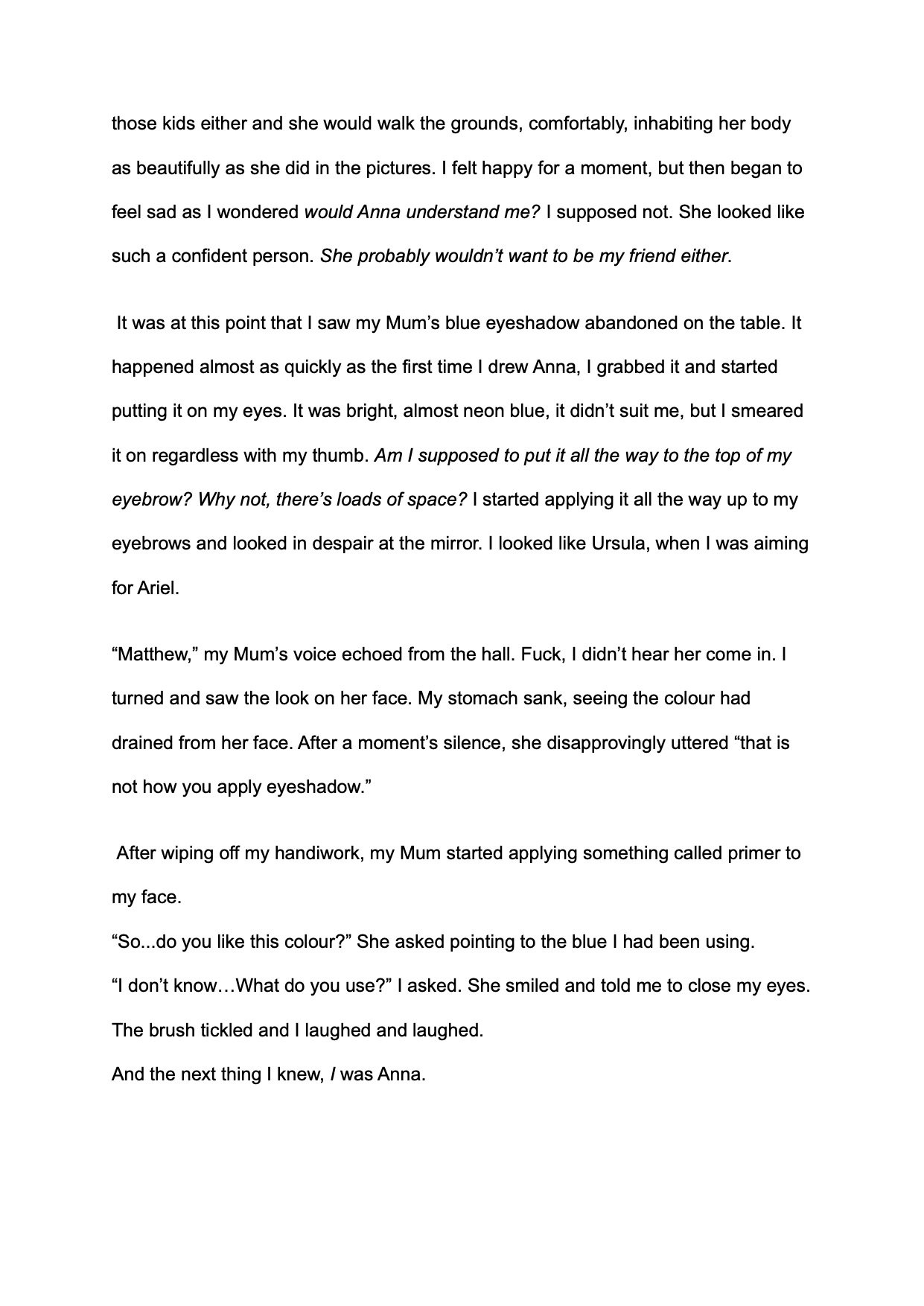
by Sean Paul Connolly
“Teenager Matt is going through a lot of changes. Following a death in the family, he moves with his mother into a new house and to a new school. Before long, it becomes clear that something isn’t quite right. Who is ‘Anna’? And why has Matt become so obsessed with drawing?”
Sean Paul Connolly is a 3rd year English student and writer of poetry, prose and drama who identifies as gender non-conforming. His work is often preoccupied with gender identity, mental health and body image. His poem ‘Roses’ was published in Bloom Magazine this Summer. Outside of writing, he enjoys photography and is currently attempting to improve his Special FX makeup skills.
The Aftermath
by Grace Blenkinsop
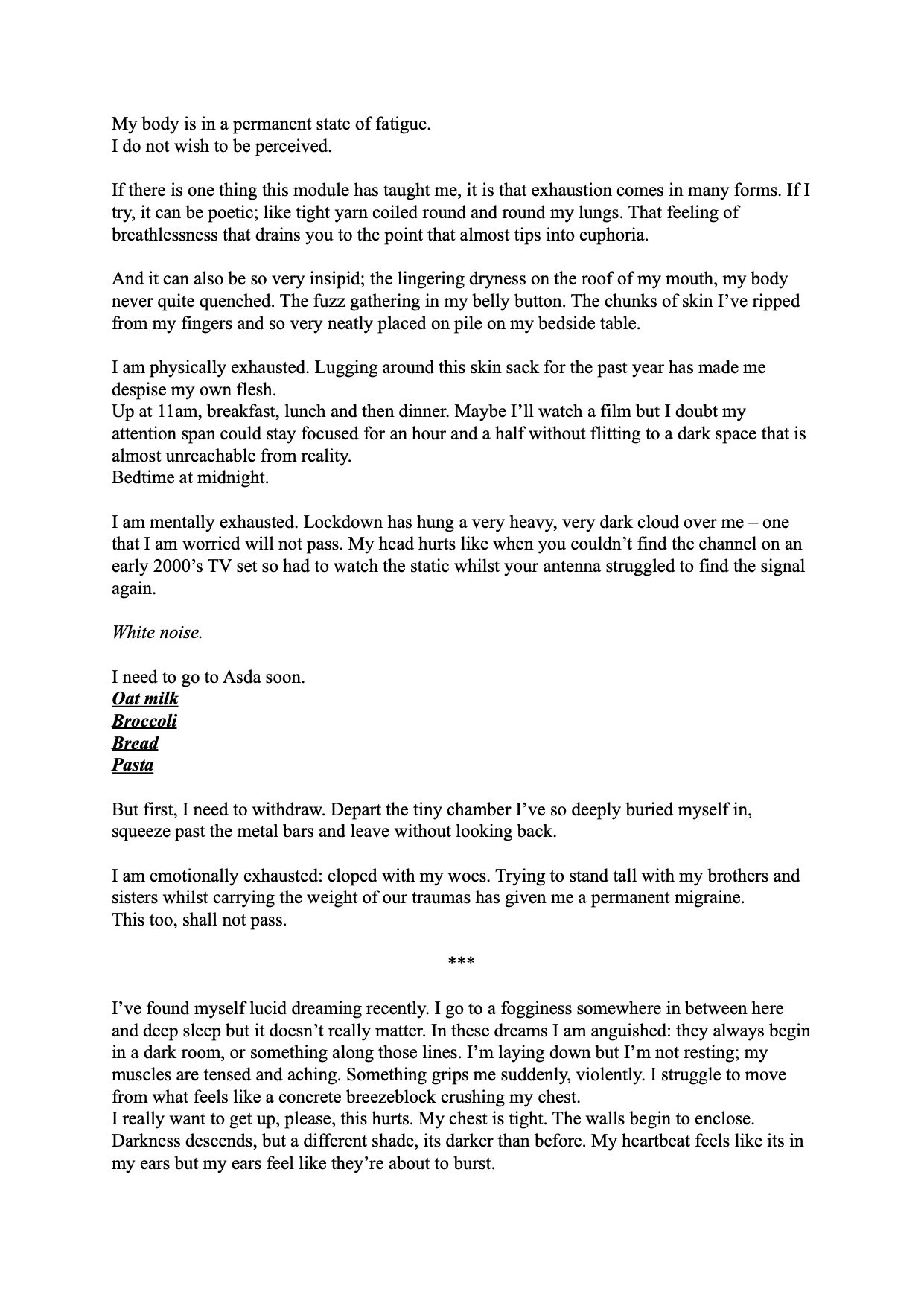
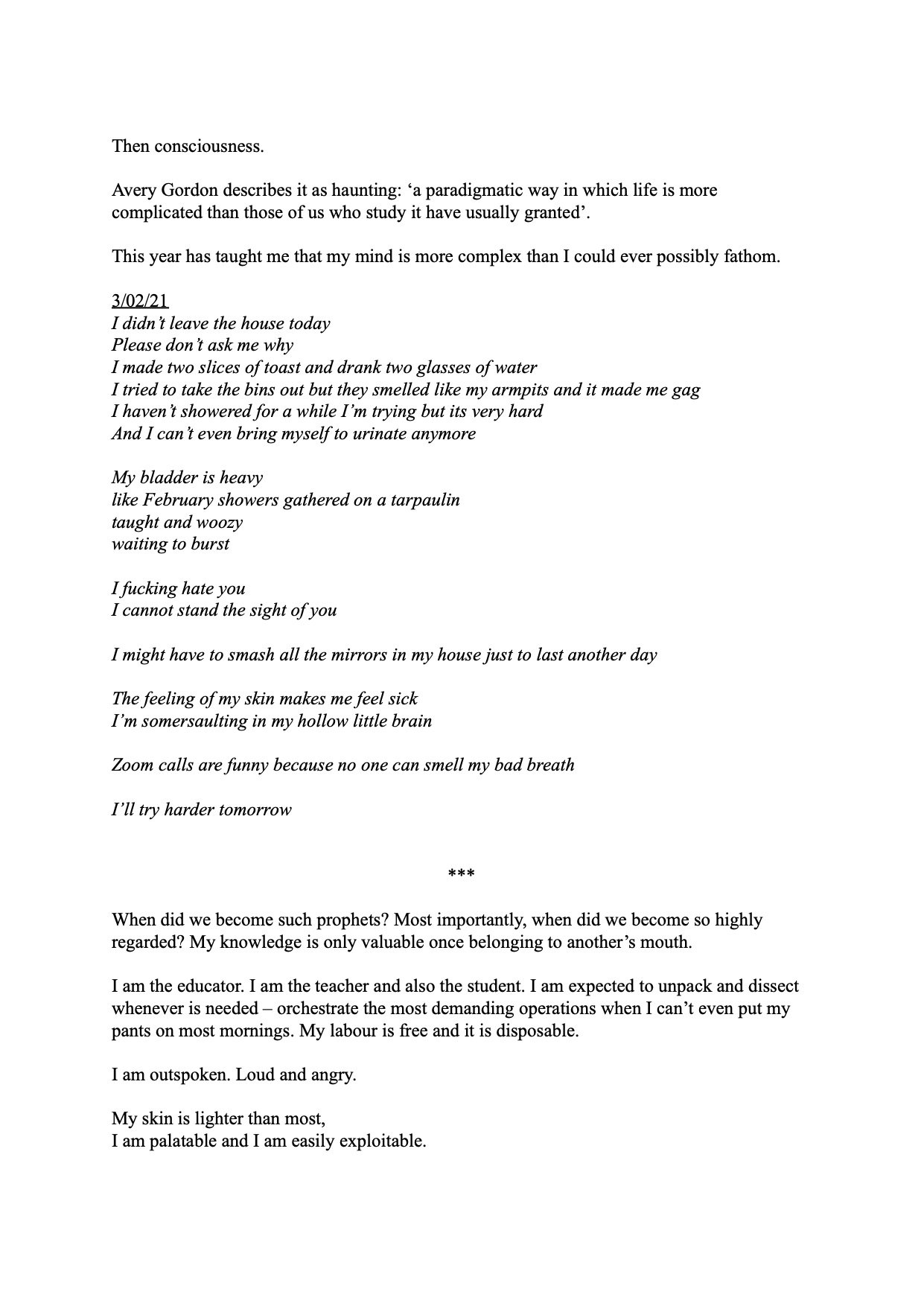
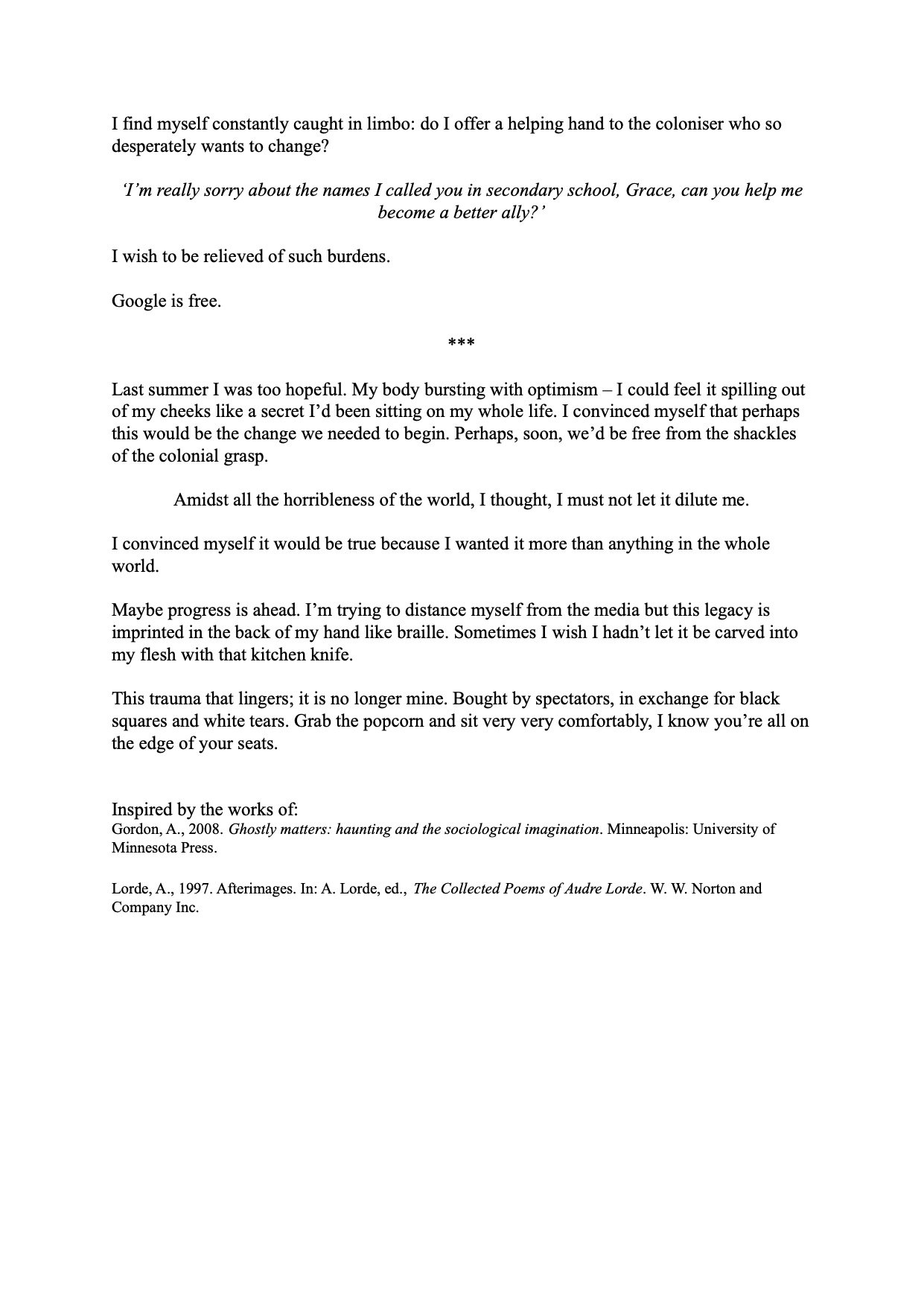
by Grace Blenkinsop
“Over the past year, the Black Lives Matter movement has faded into the background. Unsurprisingly to myself and many other people of colour, white people have simply decided our issues are no longer relevant in their ego-fuelled performativity. This piece highlights this stark transition, offering a creative reflection on how the past year has mentally affected myself and the Black community. In tandem with the lockdown-induced isolation, this prose gives an insight into the reality of the aftermath of summer 2020, how lockdown has affected our mental wellbeing, destroyed the perception of oneself and most strikingly, clouded the definition of meaningful activism.
If you are a non-Black reader, please use this piece to reflect on how you actively challenge the institutions that oppress and marginalise, and recognise why it is imperative that the fight against anti-Black racism is sustained, always. Your silence is, of course, violence.”
Grace Blenkinsop is a graduate student studying Race, Media and Social Justice at Goldsmiths, with a specific interest in social justice and studies of the African Diaspora. Grace’s main goal within her work is to educate and uplift; striving to make apparent injustice and give voices to those most marginalised. Connect with Grace via her Instagram where she uses the platform as an outlet to start these conversations and provide various educational resources.
Rooting for all Black people.
Coping From Finish to Start
by Emily Reader
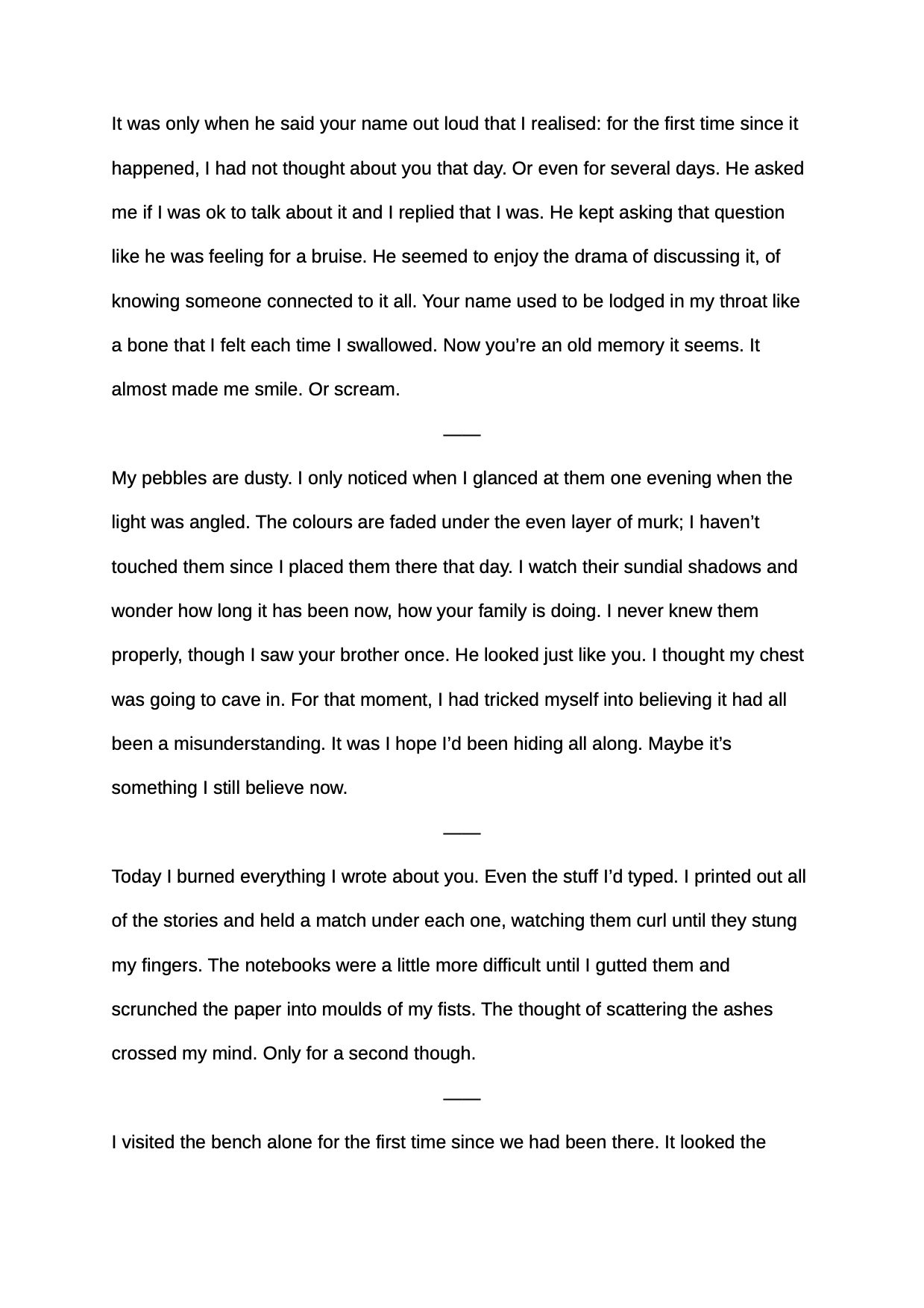
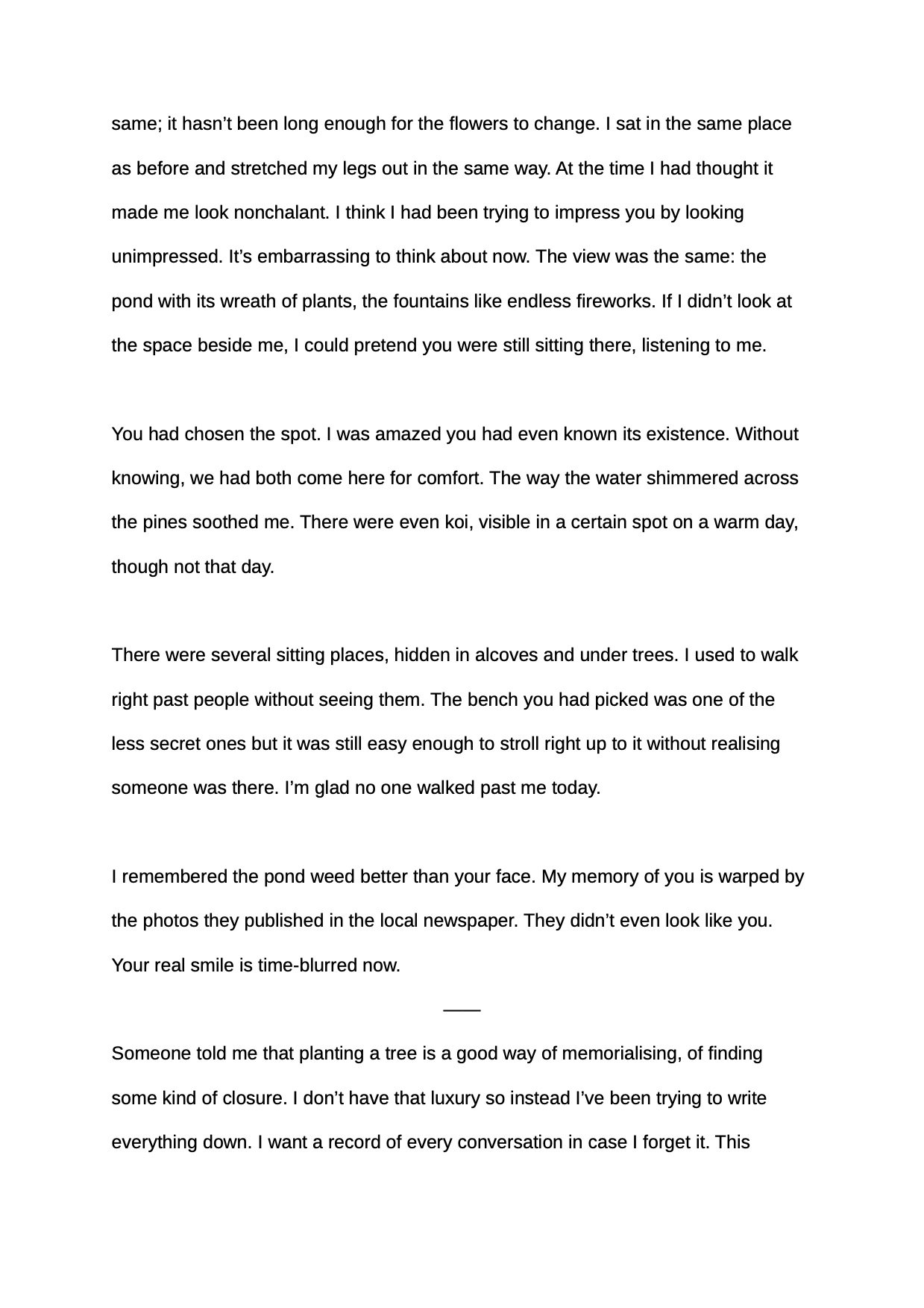
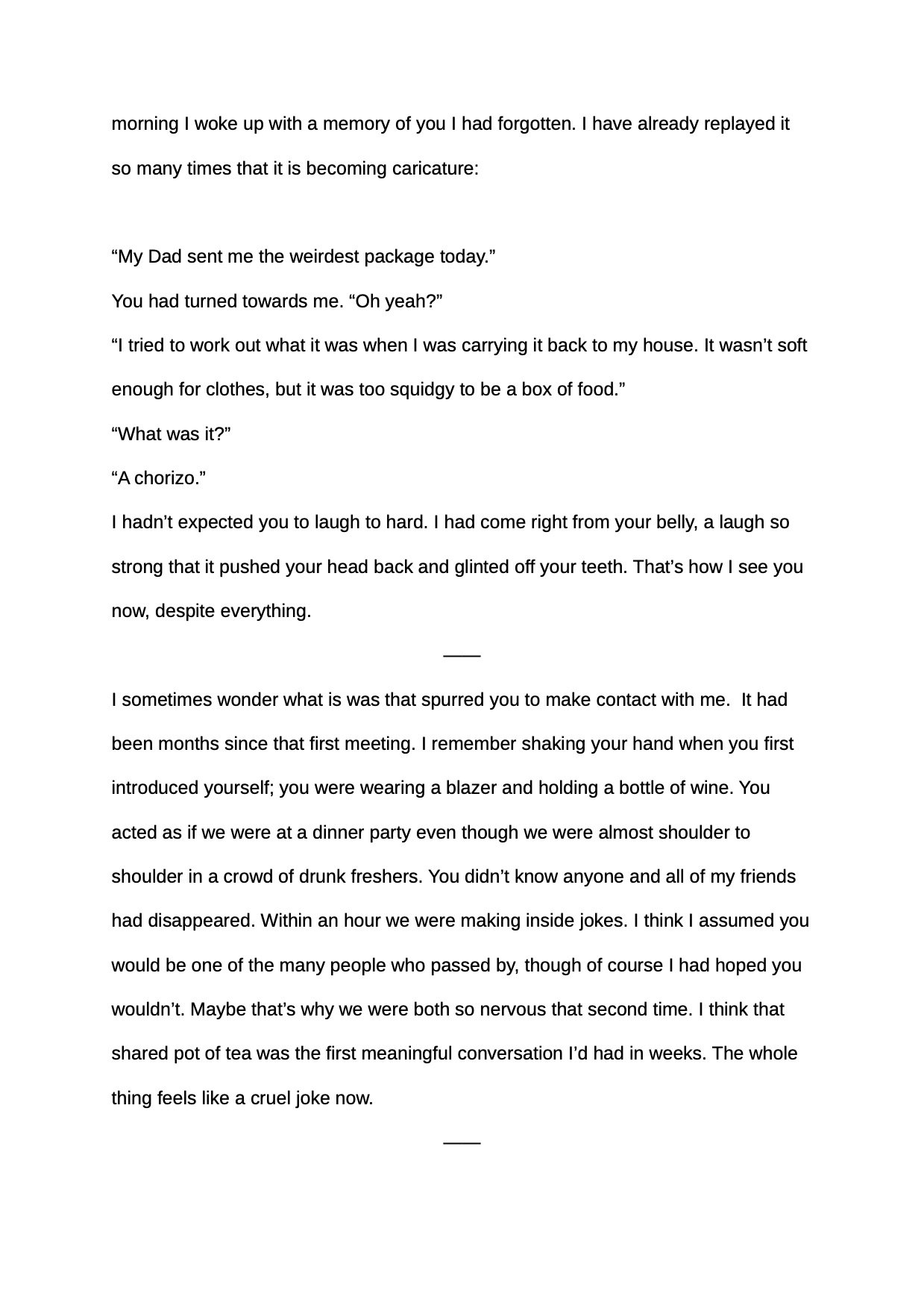
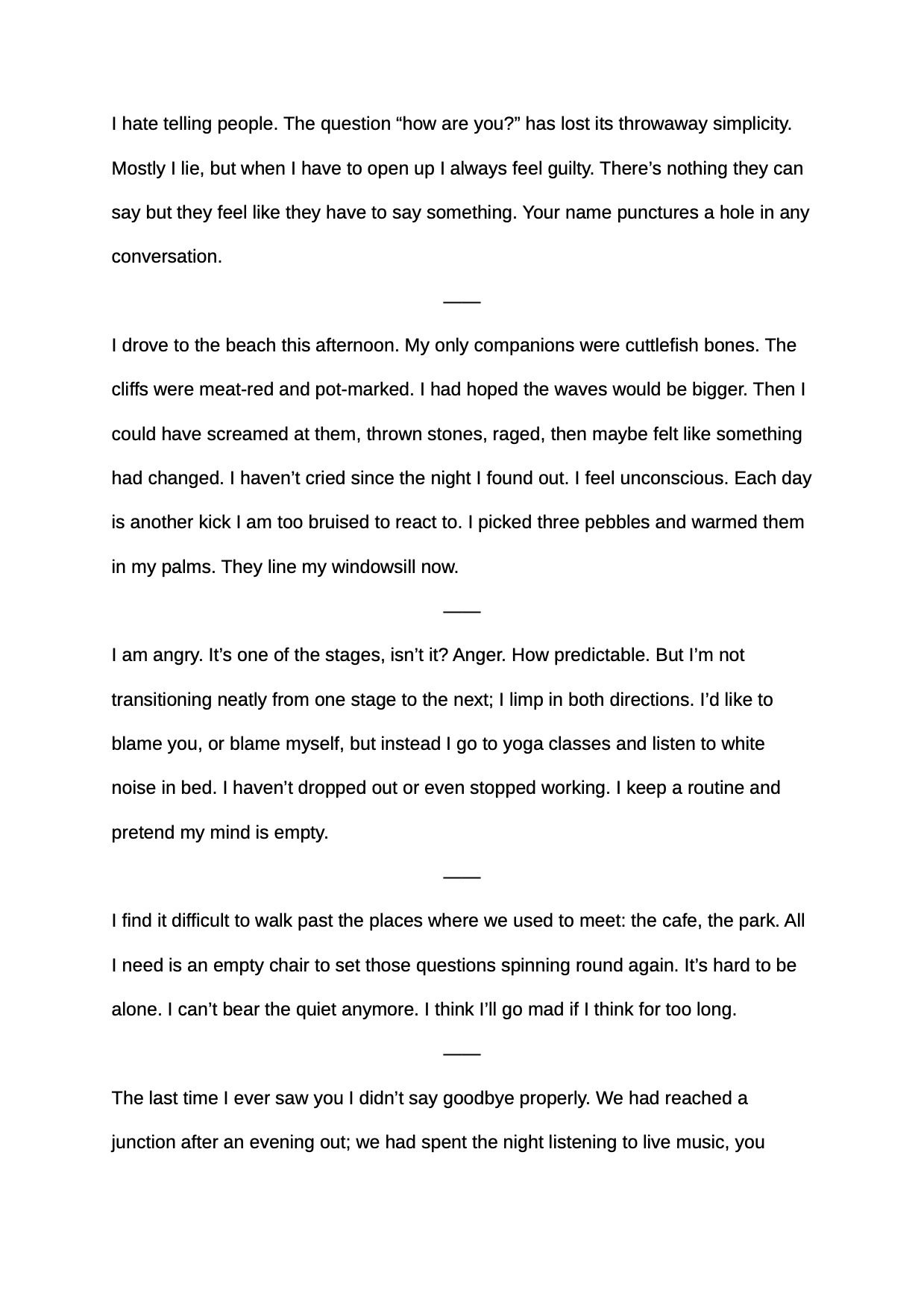
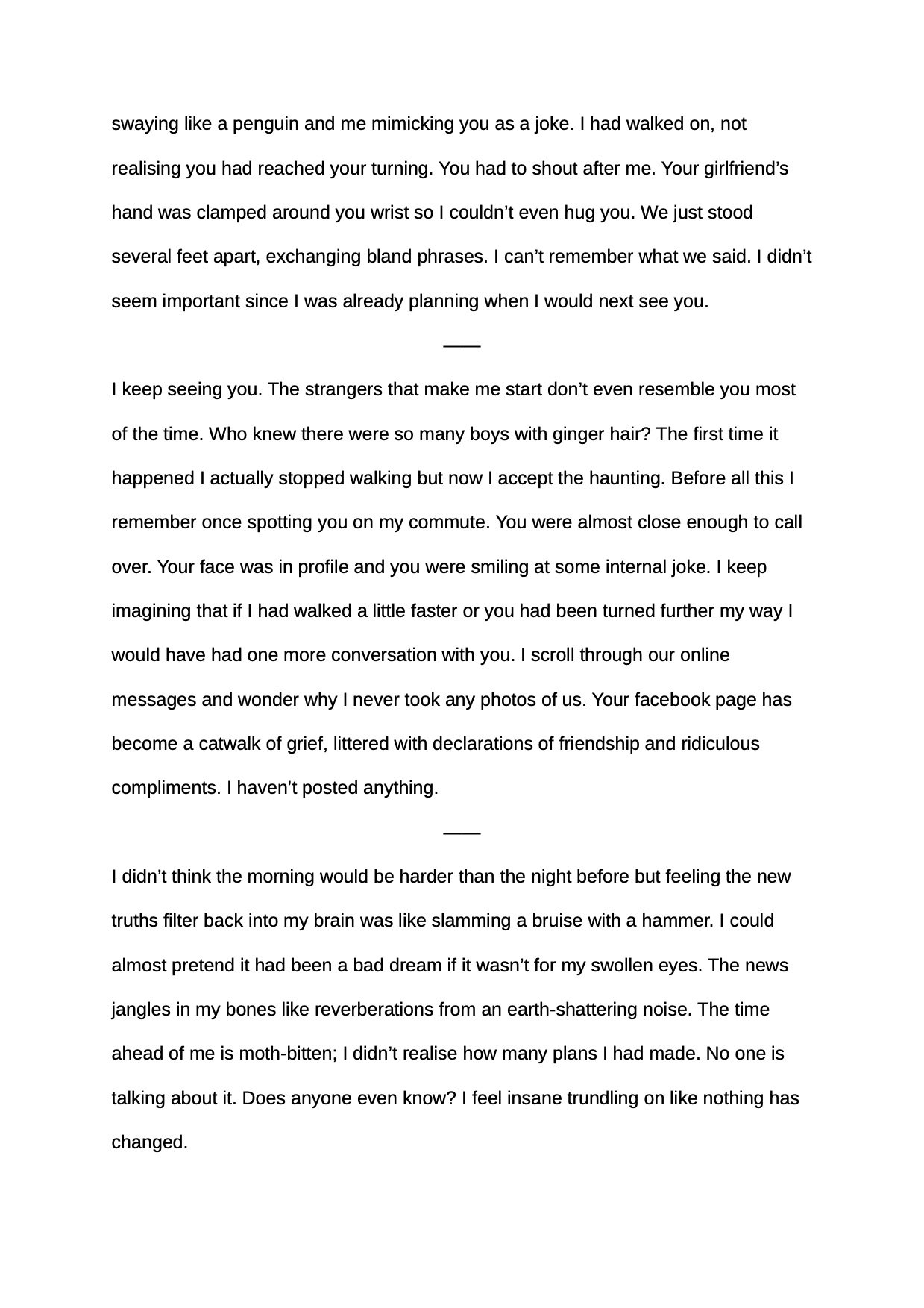
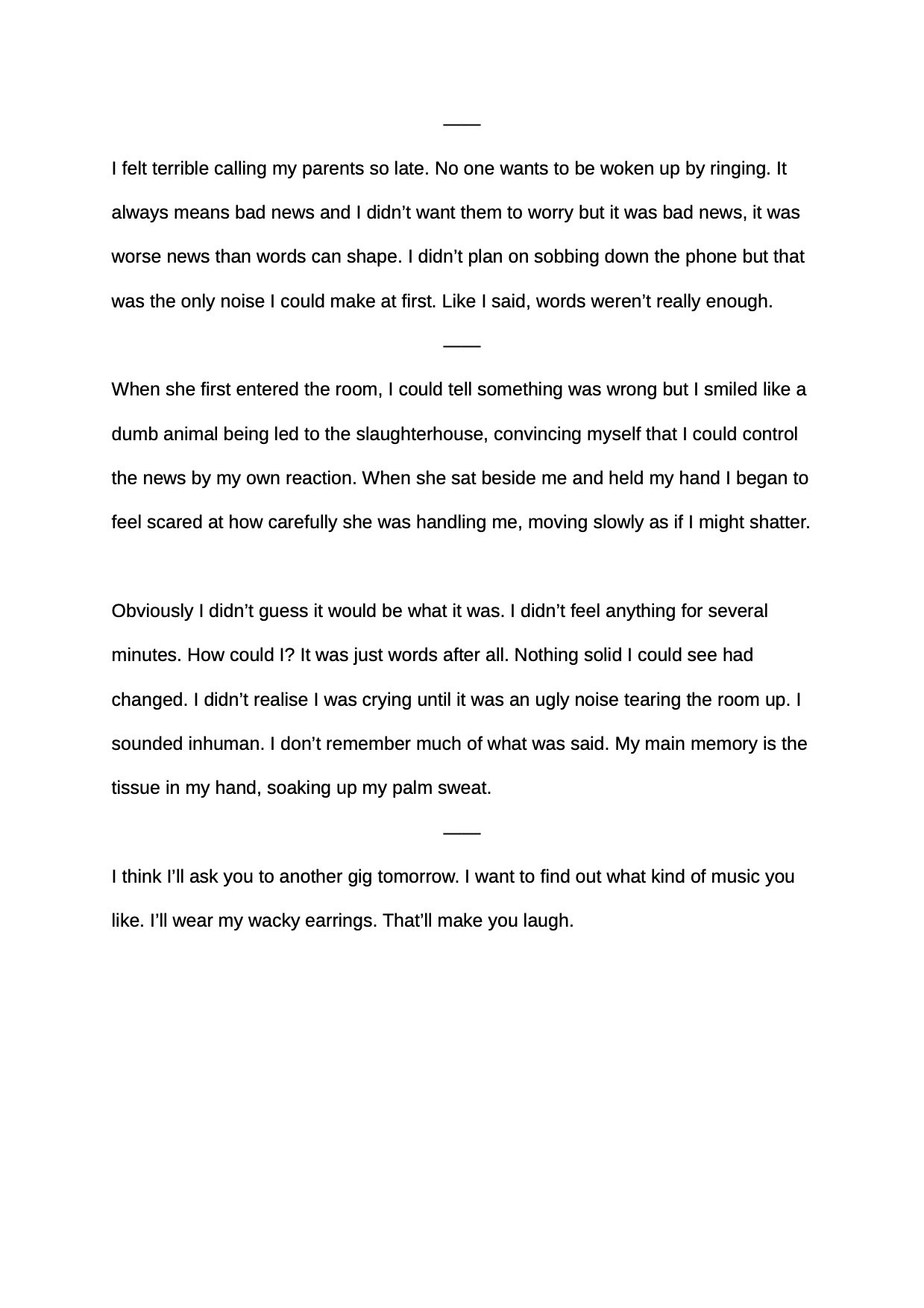
by Emily Reader
“This is a short story about grief, told in reverse chronology.”
Emily Reader is an award-winning writer specializing in audio and television.
Her stage play, Rumours, was performed both in Exeter and at the Inter-University Drama Festival in Glasgow in 2018. In May 2020, she adapted the script into a radio play. Her short film, Swan Song, and accompanying essay won her the Zara Malone Memorial Prize for the highest creative writing mark in her year.
Emily has also written for BBC Radio: her jokes were selected amongst hundreds to be performed on Newsjack. Her scripts have been shortlisted by ‘Owdyado Theatre, Ghostcow Productions, and her work has been read at scratch nights lead by Scriptwriters & Co, Dapper Sandwich, Newsroom Theatre Company, and Lonely Penguin Productions.
She is currently studying MA Script Writing at Goldsmiths University.
Website: https://emilyreaderwriter.wordpress.com
And then there was one
by Charlotte Gafney
by Charlotte Gafney
“This story is a modern exploration of female loneliness and social isolation. These are ideas I’ve been thinking about a lot over the last year of lockdowns and decided to explore them in a fiction piece. The story follows Mara, as she wanders around Brighton alone, thinking of the past where she was part of a sisterhood.”
Charlotte is a third year Media and Communications student who is taking the creative writing practical module. She is an avid film watcher and is overjoyed that she is now able to experience movies in the dark comfort of the cinema. Many movies she watches spark ideas that she spins into her stories. She is a voracious reader, even though recently she has slowed down in her devouring of novels. She takes long walks around the nearby parks either binge listening to true crime podcasts or off in existential panic. Charlotte also gets joy in walking her grandma's dog Toddy around as well as cuddling cats Stark and Koda.
Under the Banyan Tree
by Niamh Fennell
by Niamh Fennel
The newlywed Ben and Wei Lin have recently moved house to accommodate for the arrival of their first child. As the baby’s due date approaches, an unsettling feeling begins to permeate the walls of their perfect house and tension grows, estranging the couple.
Niamh Fennell is a third year Media and English student. She is interested in theories of race, gender, ‘othering’ and postcoloniality. After graduation she plans to further pursue these interests in a Masters. Outside of university and theoretical debates, Niamh is also a fiction writer and poet, taking inspiration from her own mixed heritage and upbringing.
Cover image by Roberta Cliff
Violent Delights
by Charlotte Anne Gaffney
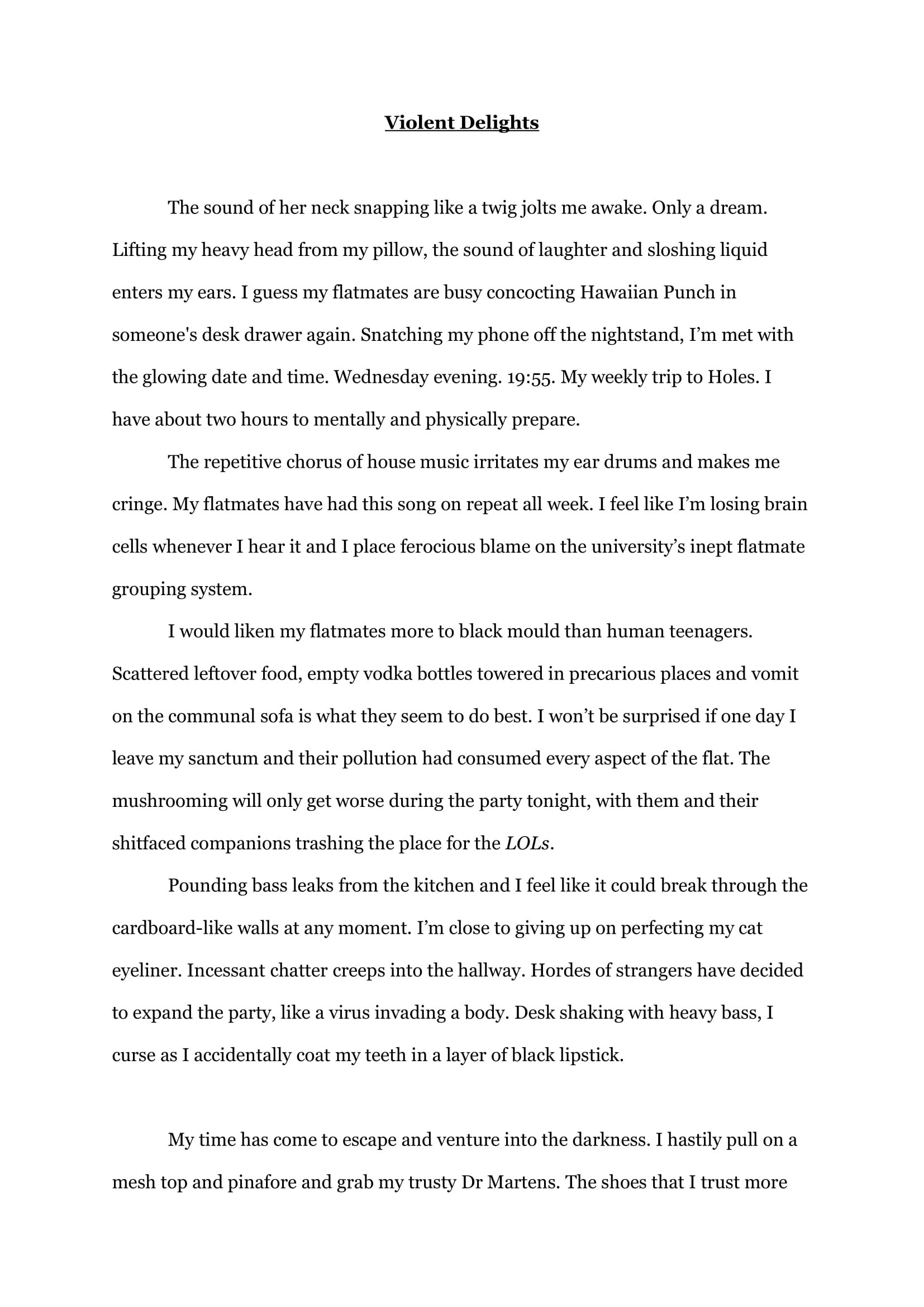
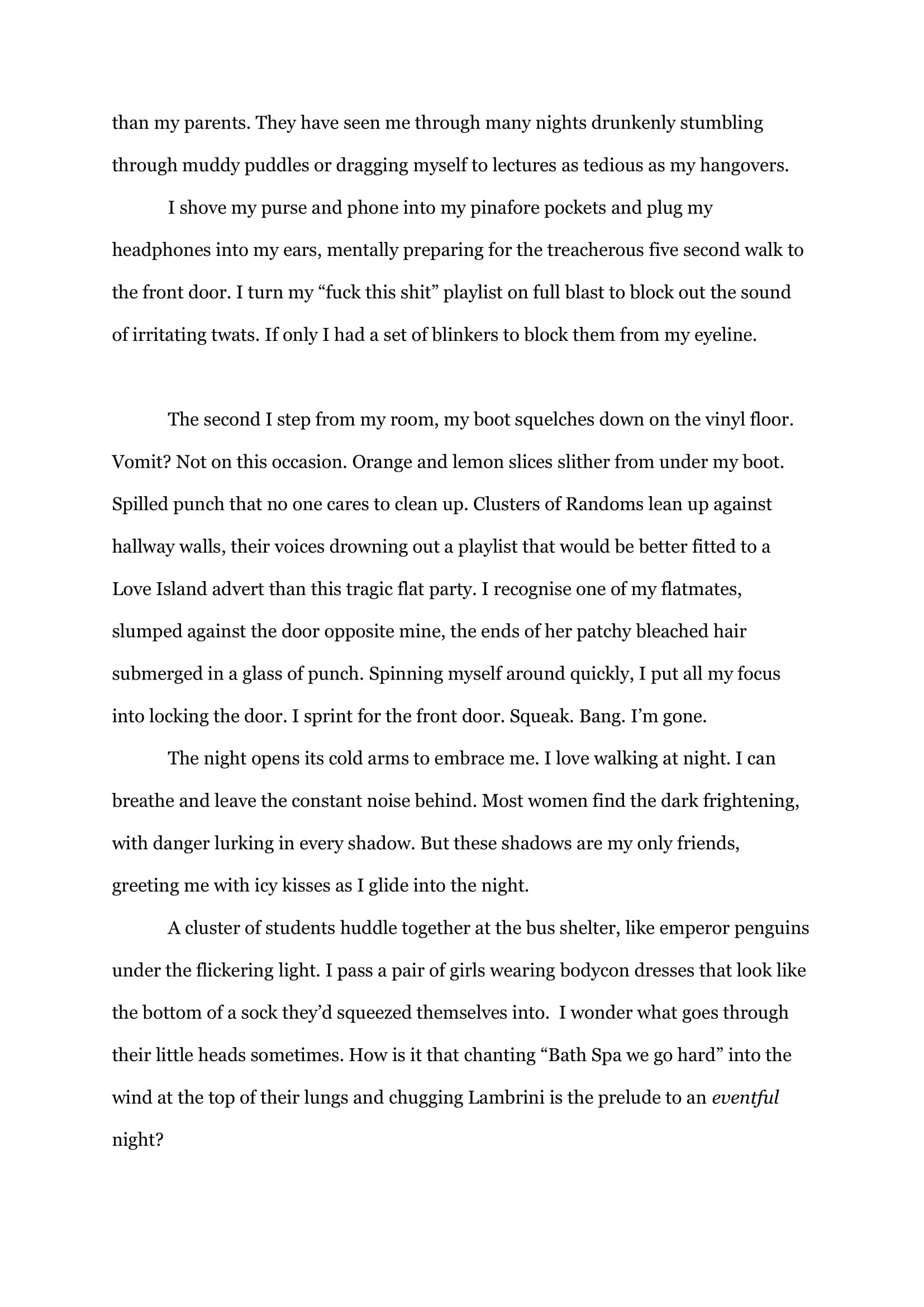
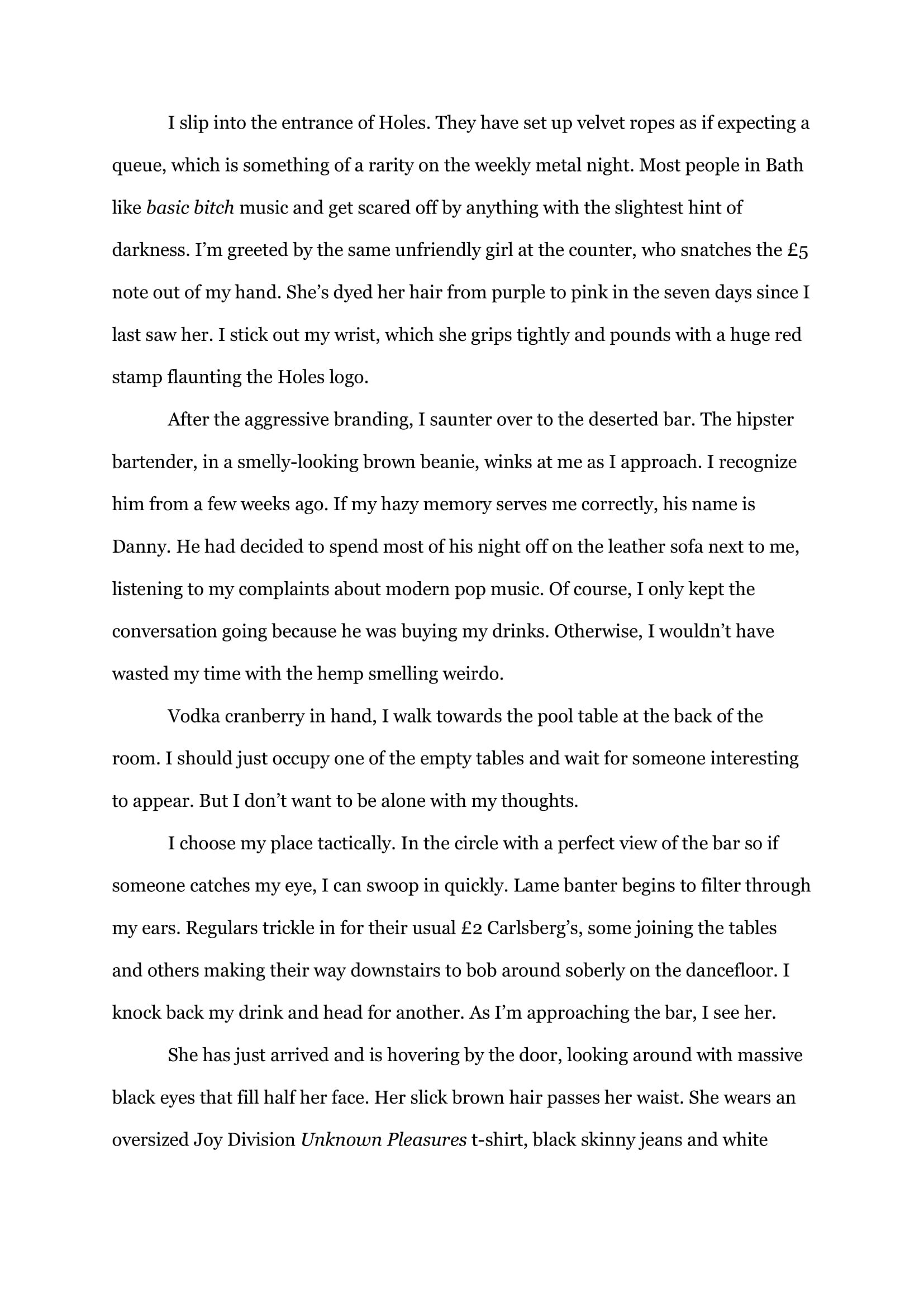
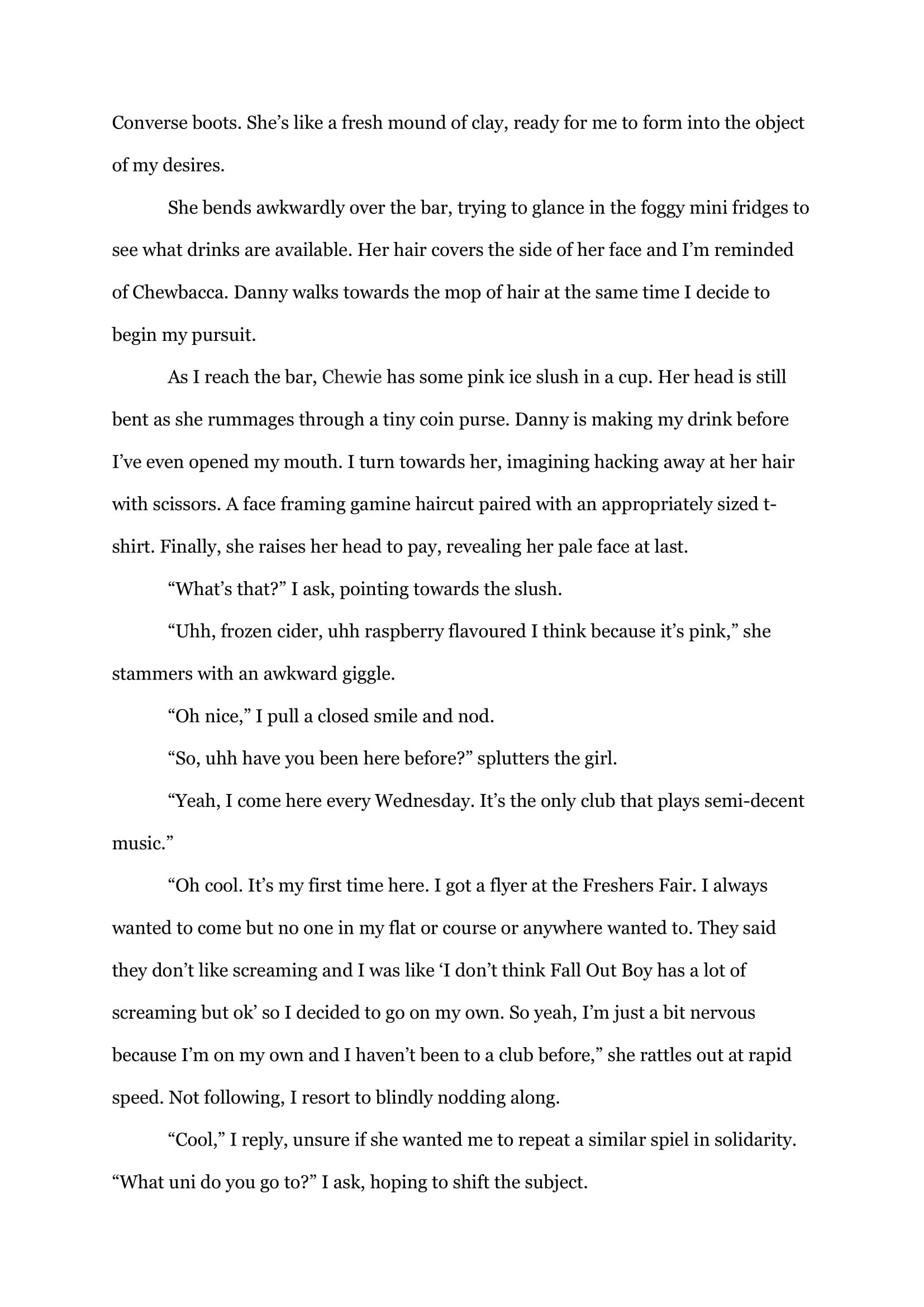
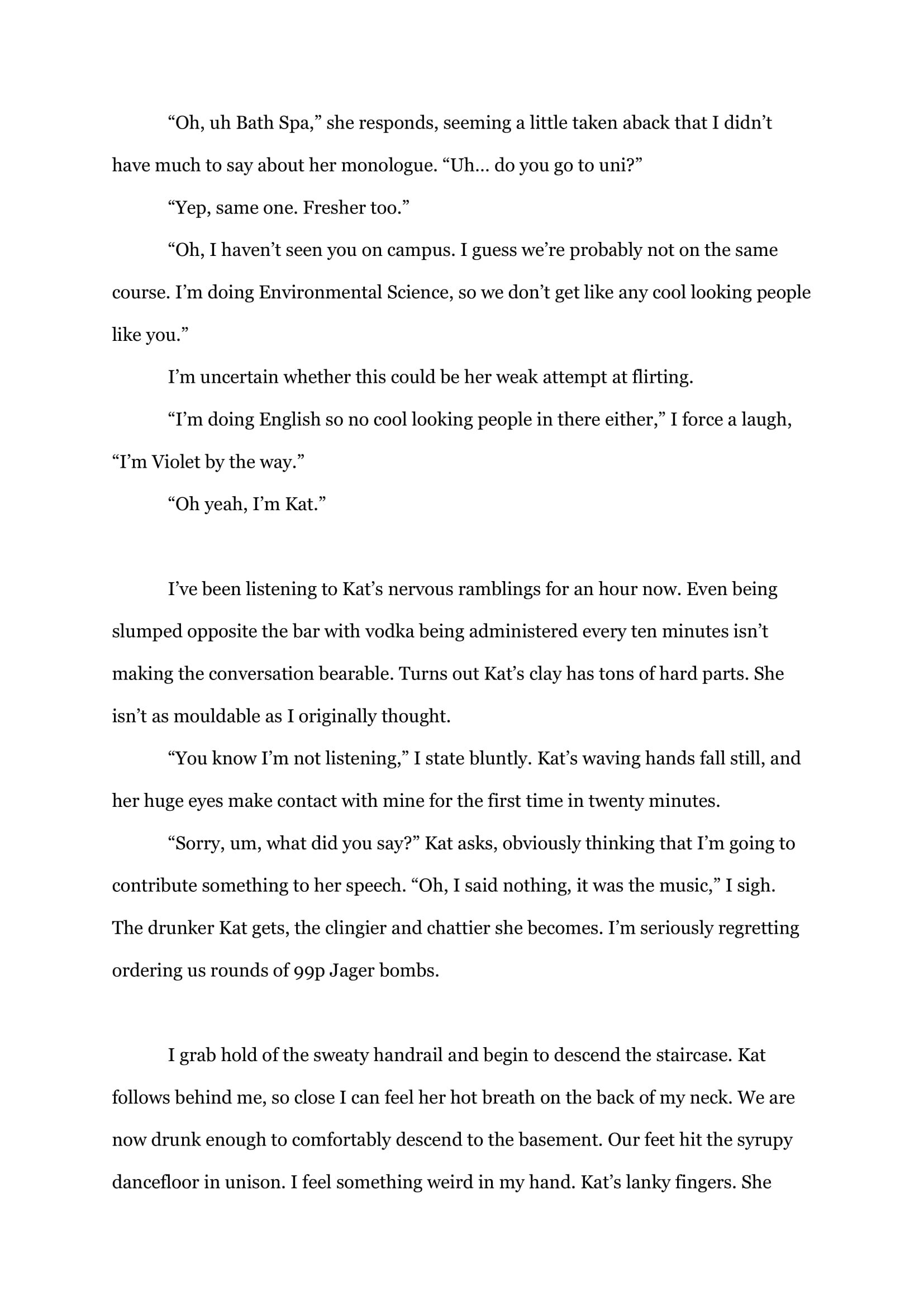
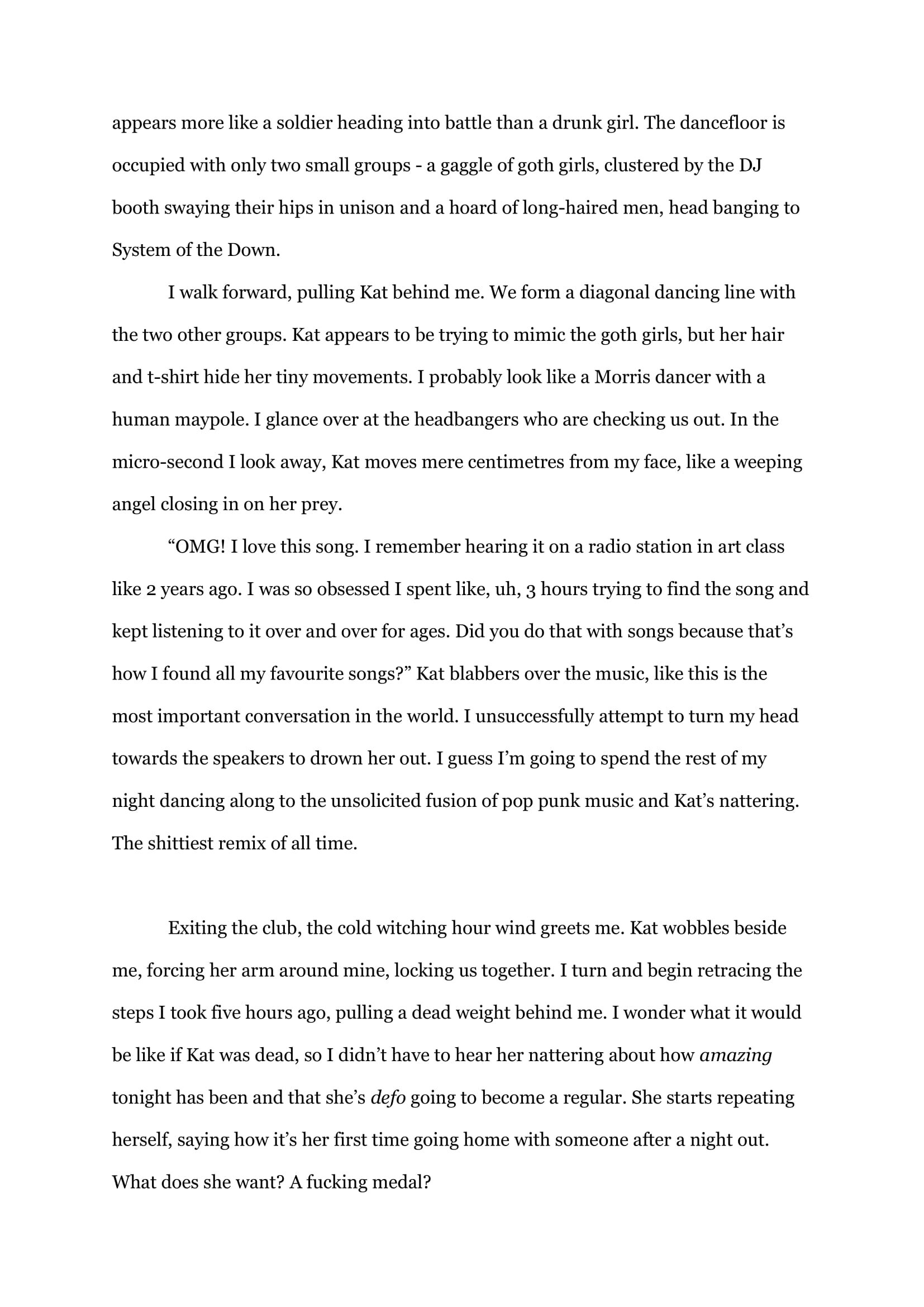
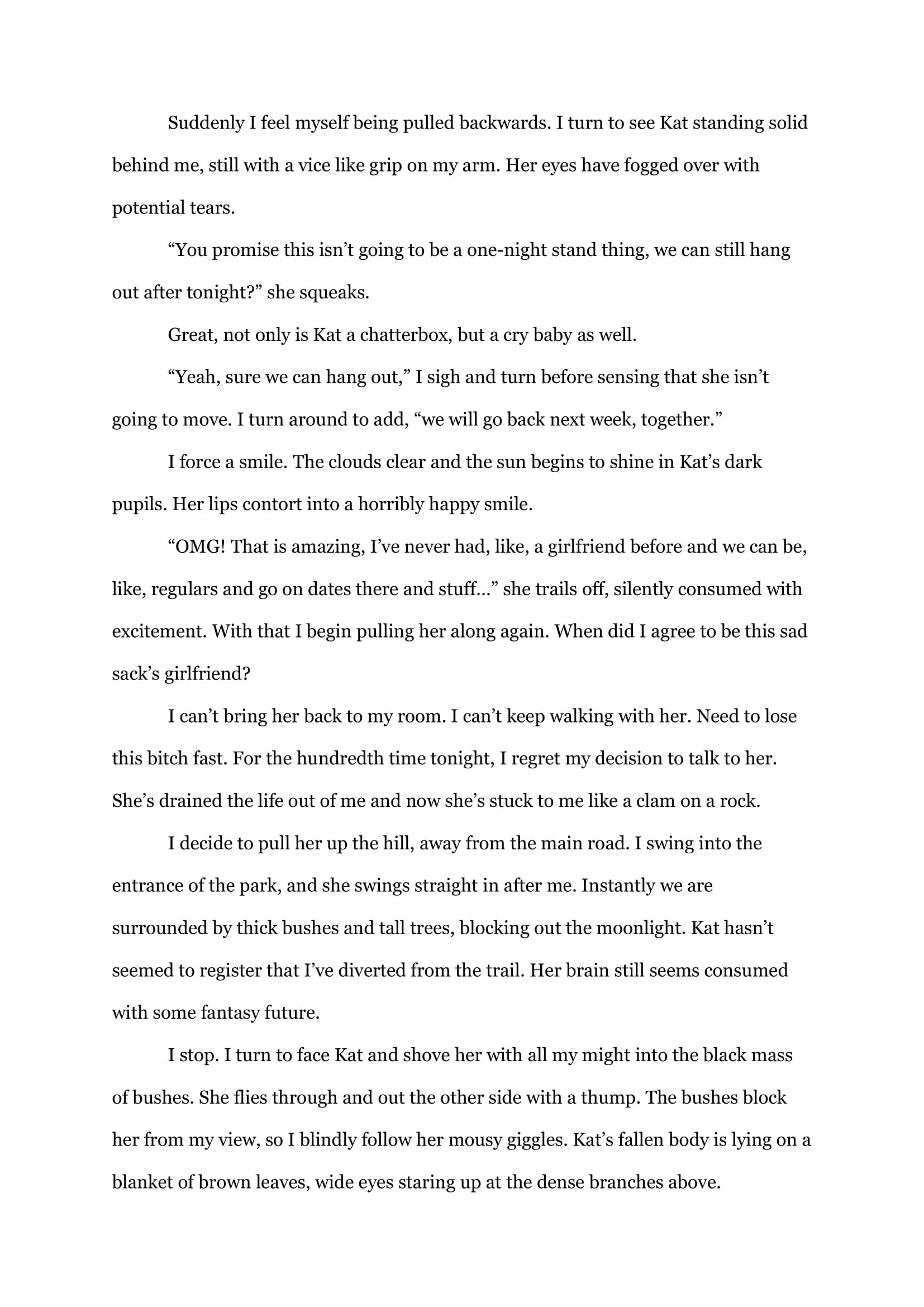
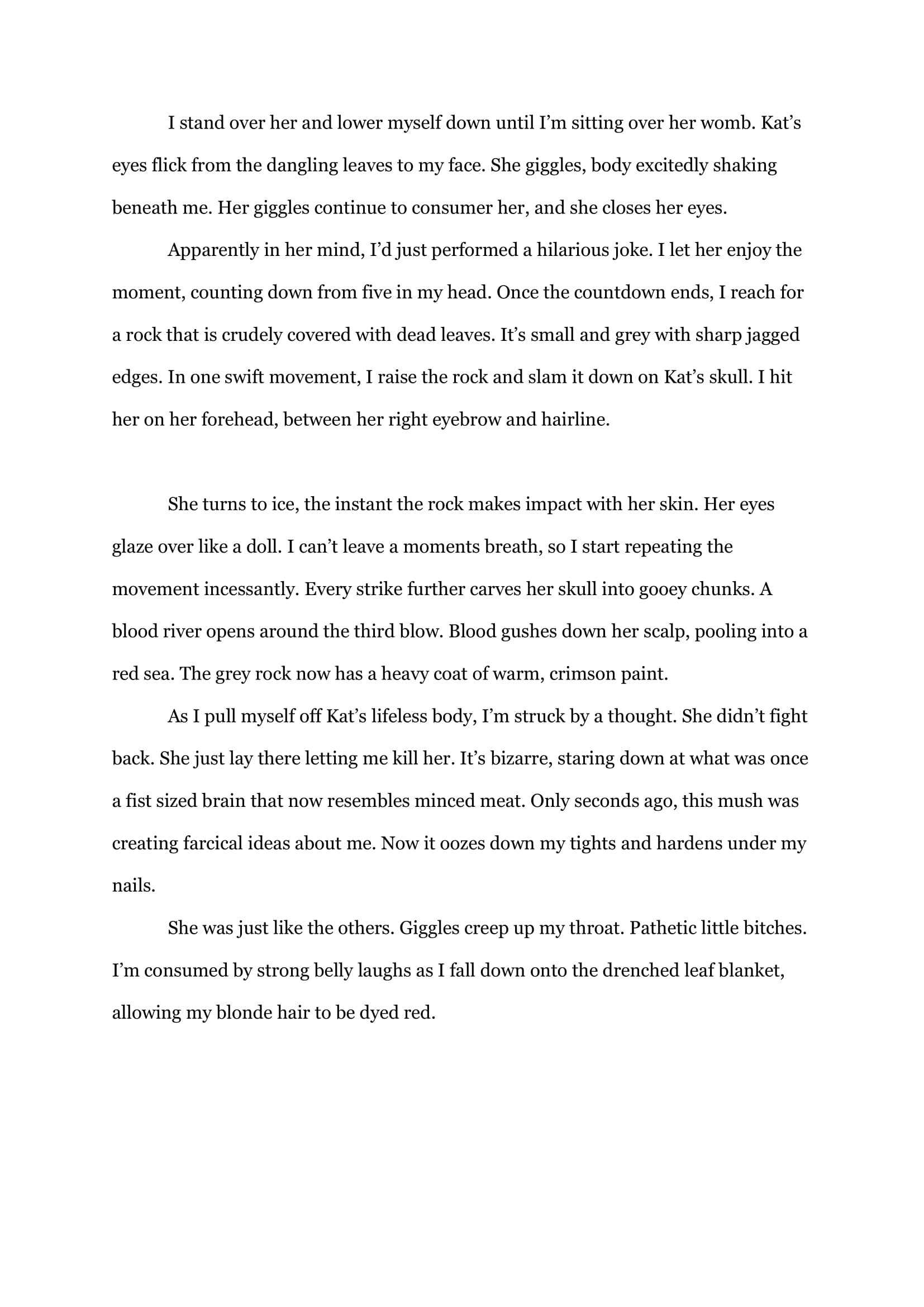
by Charlotte Anne Gaffney
“This is a horror story in the vain of American Psycho, where you are trapped in the head of a unhinged girl, unable to escape and witnessing the havoc she causes. The story is a therapeutic piece for the author. She harnessed lots of anger and pain from her first experience at university and explored them though the protagonist Violet’s world view.”
Charlotte is a second year Media and Communications student who is taking the creative writing practical module. She is an avid film watcher watching any film she stumbles across. Recently she has been diving into Japanese cinema and anime, which involves several re-watches of Kiki’s Delivery Service. She is a veracious reader, devouring novels that are translated fiction, deal with horror and mental illness. She puts these themes in her prose writing. She takes long walks around the nearby parks either binge listening to true crime podcasts or off in existential panic. You can locate her on Instagram @books_can_roar.
a shade of grey
by Samara
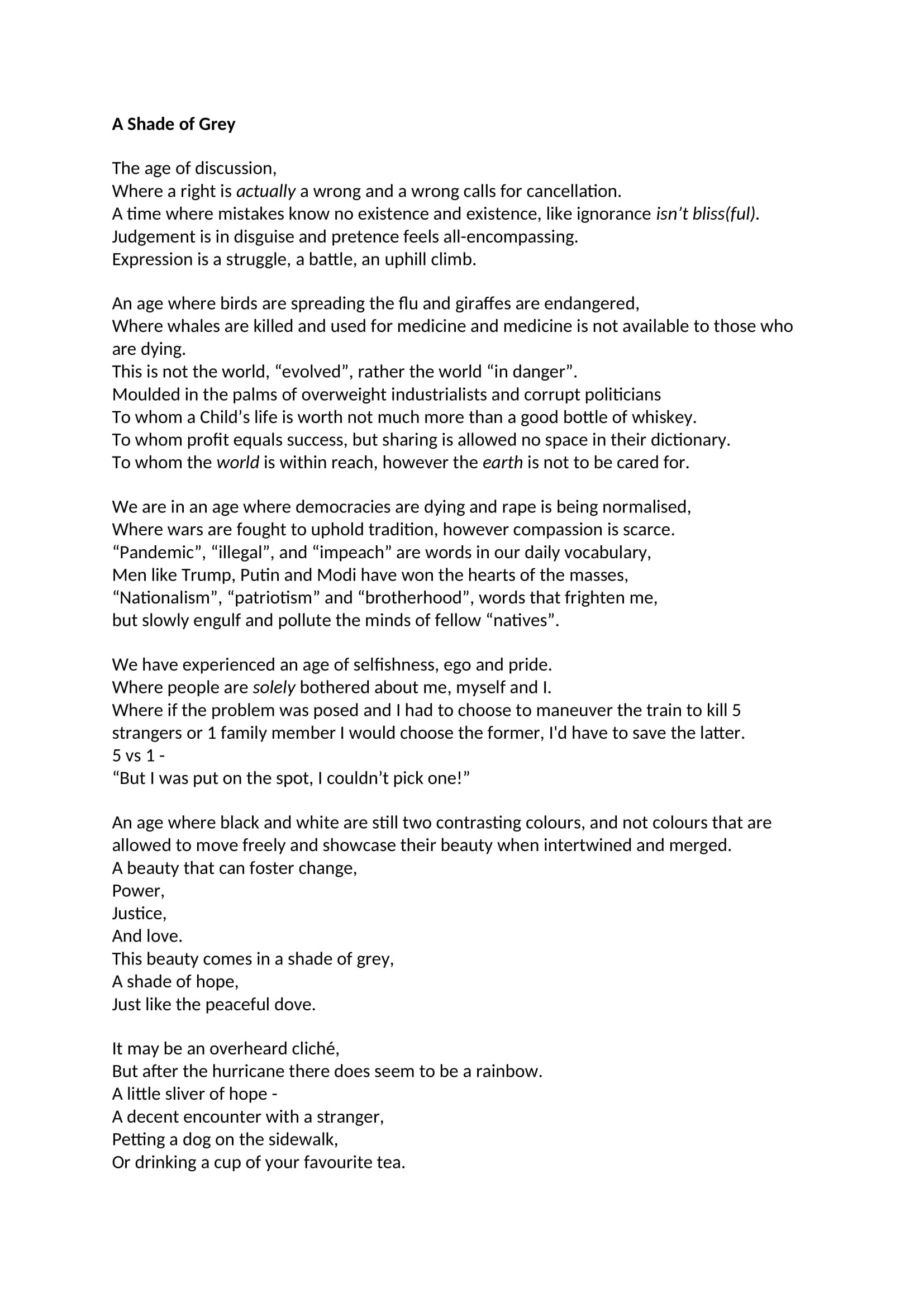
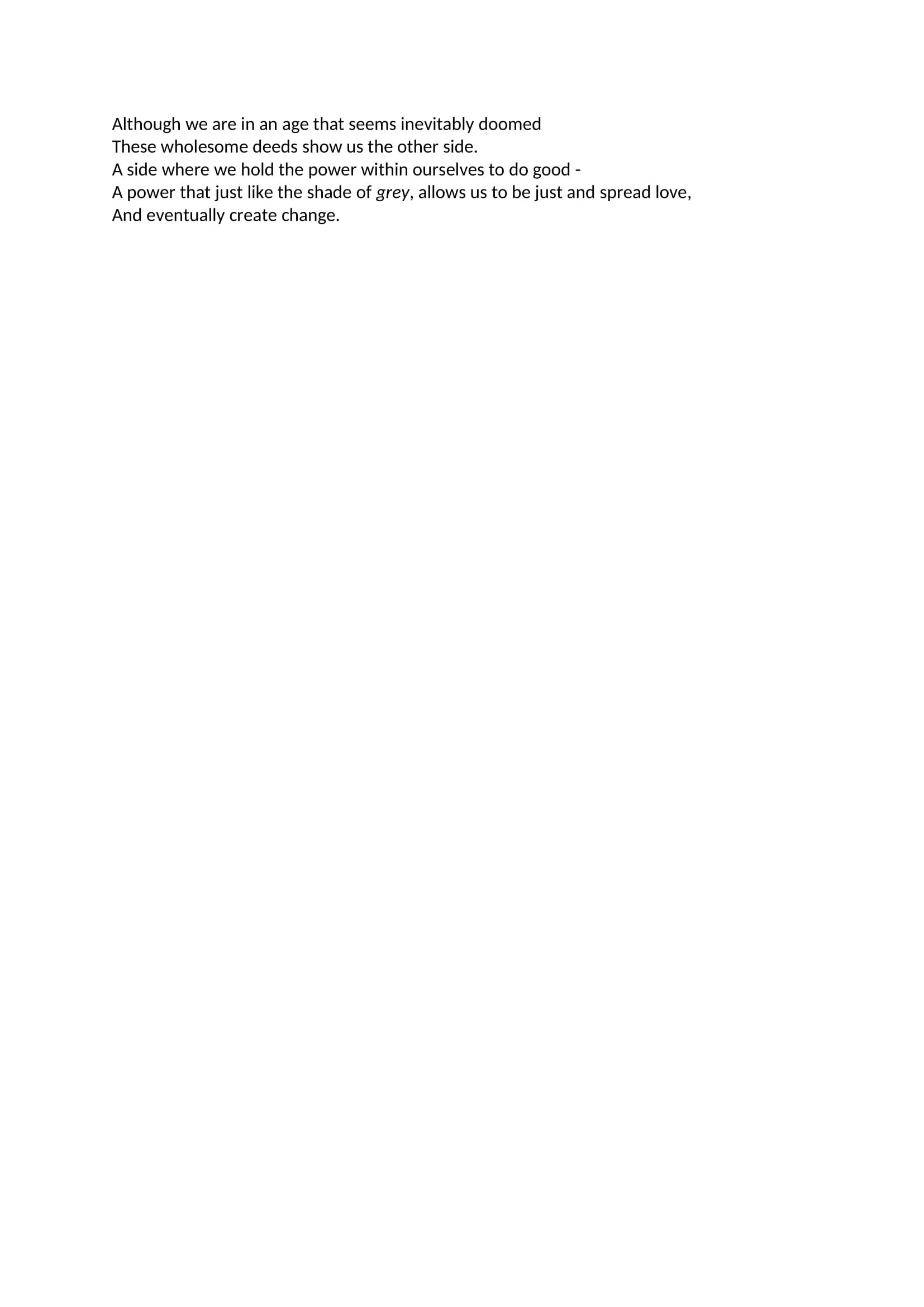
by Samara
A shade of grey is a (censored) rant of the imperfections that are boiling over in the world today, inequality, injustice and incredible amounts of hypocrisy. This piece is a mixture of poetry and prose, however I couldn’t seem to conform to one style as I wrote it down; it didn’t flow naturally, and so I just went with it. I wrote this piece in one sitting and I truly got the inspiration from the deep sadness I experienced one Tuesday evening. The process of penning down my thoughts was cathartic and allowed me to make sense of my frustrations and encouraged me to look for another perspective by which I can view these injustices to prevent myself from being negative most of the time. Don’t ask me what that perspective is yet, I’m still looking!
An enthusiastic creator, Samara loves to spend time on her laptop typing away. Writing allows her to make sense of the world: its imperfections and beauty. When the imperfections bother her, she types aggressively and loudly, but when conveying the worlds beauty, it is soft and gentle. Samara tries her best to allow the reader an insight into her mind, her thinking and perspectives. After all, storytelling, whether fact or fiction, makes life that much more captivating.
Instagram: @samara_kumar
Group blog: https://www.unauthorizedperspectives.com/
Magic
by Elise Harbud
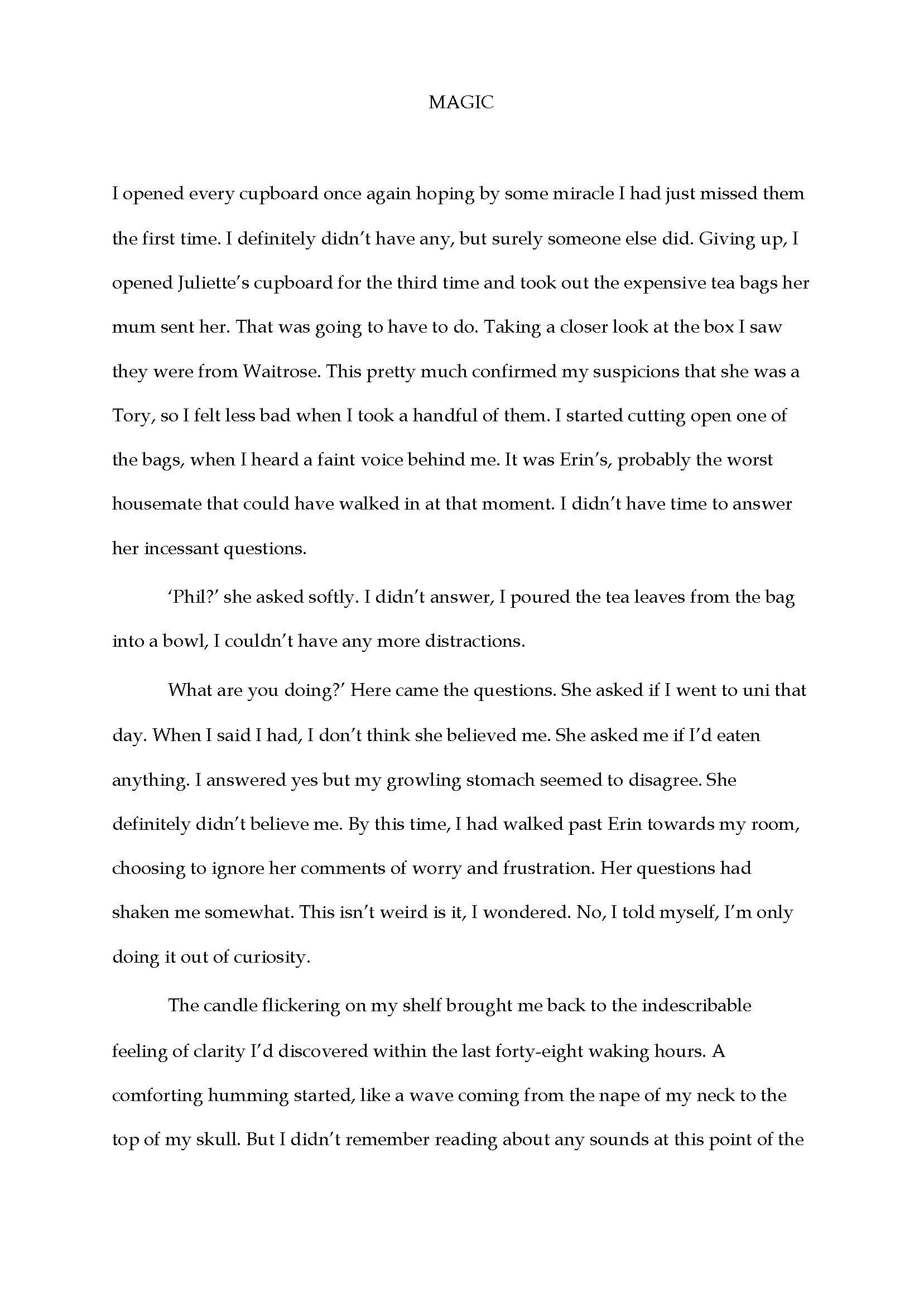
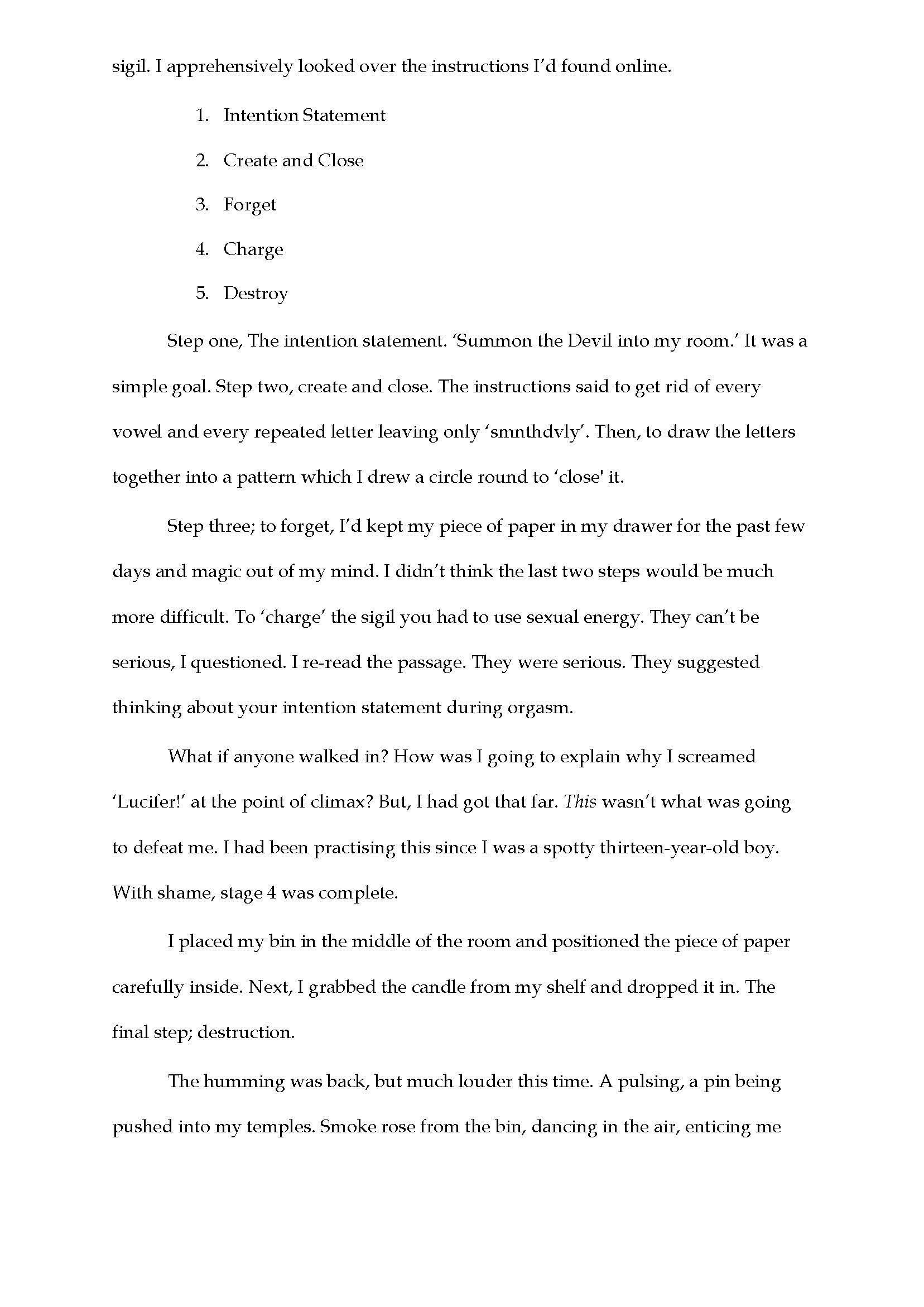
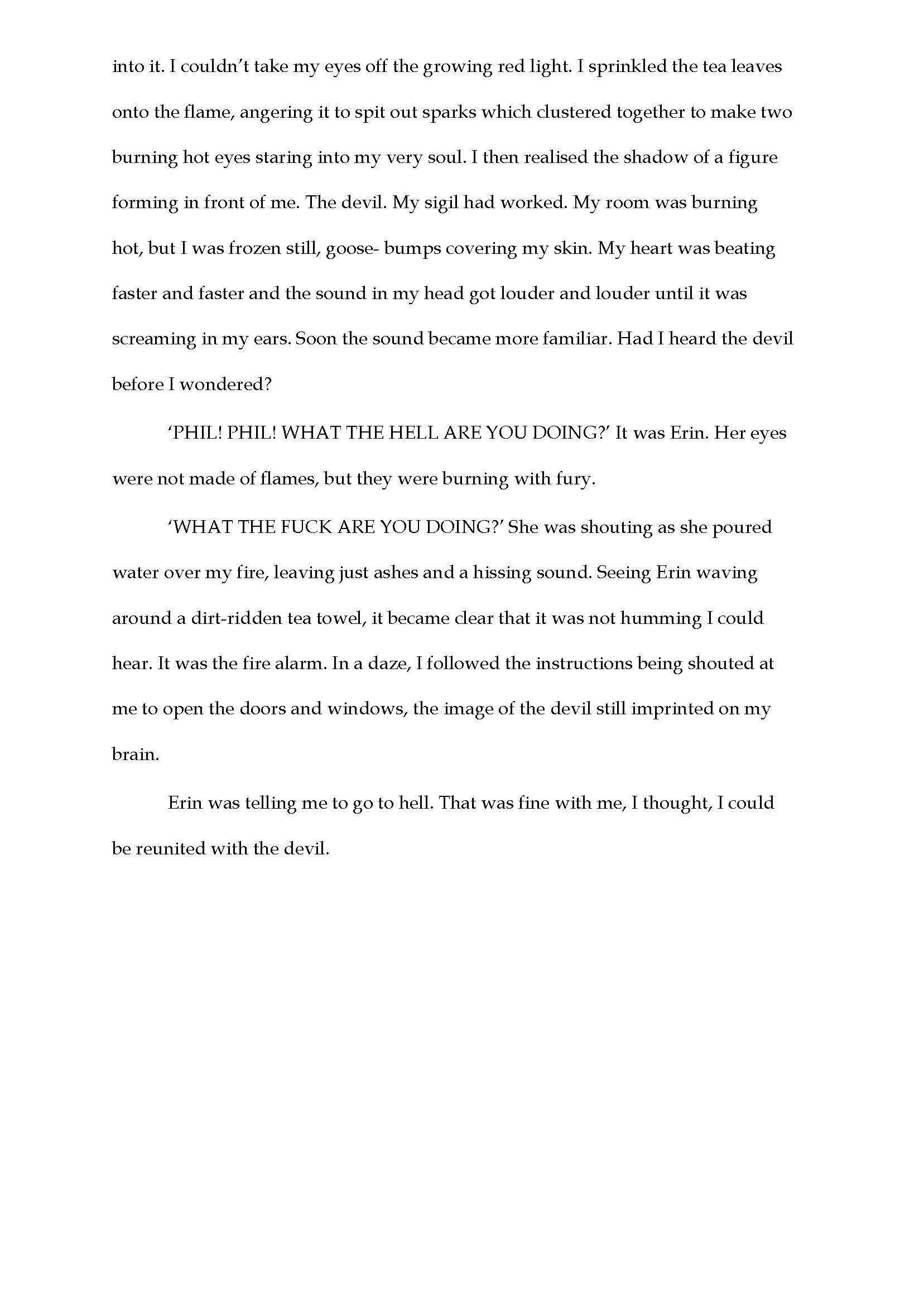
by Elise Harbud
“‘Magic’ is a story about a university student, Phil, who decides he wants to play around with black magic. He does some research and carries out a sigil in his student house, trying to avoid the prying eyes and judgment of his housemates. Sleep-deprived and hungry, Phil’s magic doesn’t go exactly to plan.”
Elise Harbud is a writer studying Media and communications in her final year at Goldsmiths. She is also the creative editor and writer for the new poetry The Road Zine (@theroadzine on Instagram). She specializes in poetry but also enjoys writing short stories in prose or screenplays, mostly focusing on mental health, relationships and self-love.
Darla Ray, Jonah Everett
by Katrina Sproge
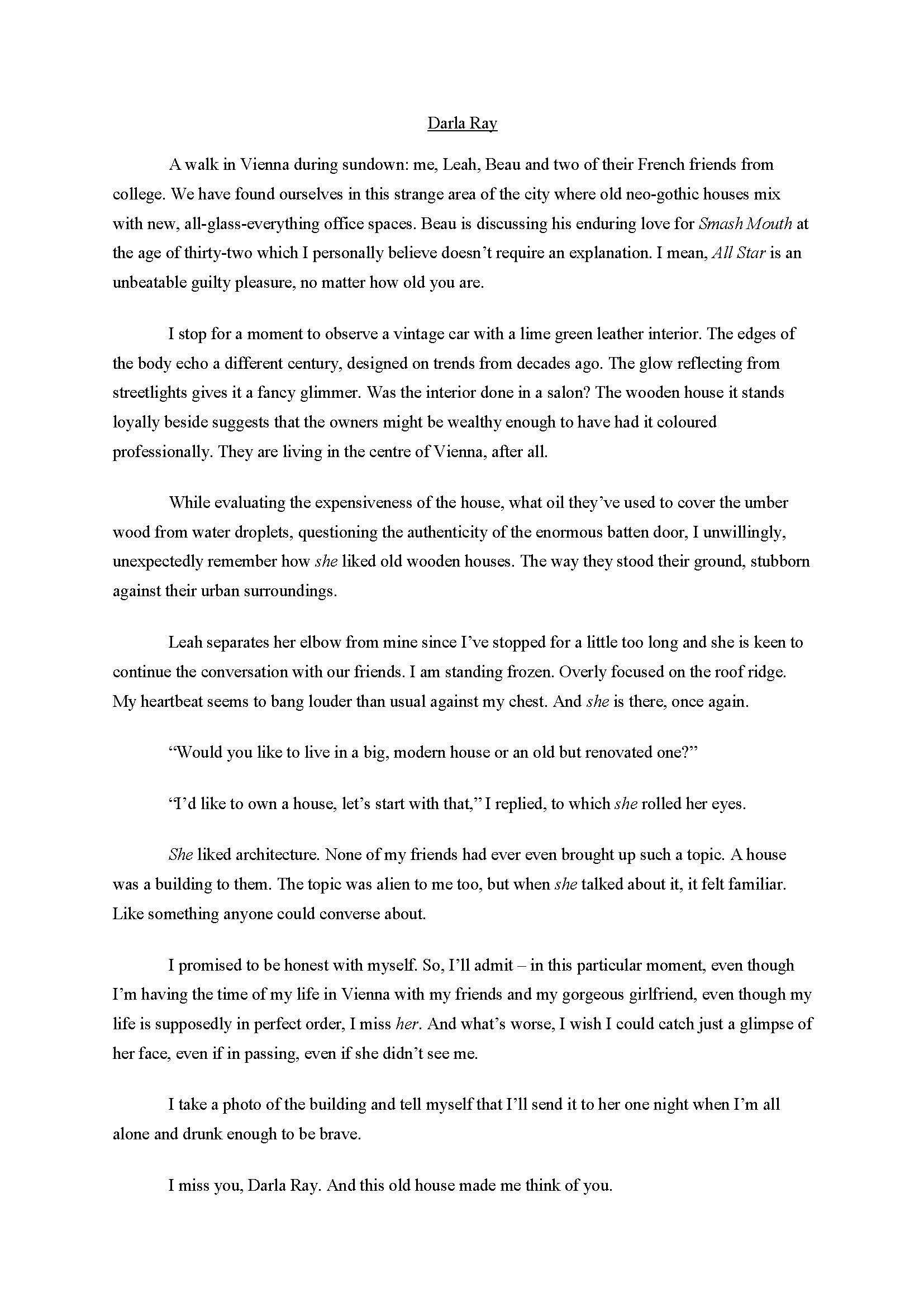
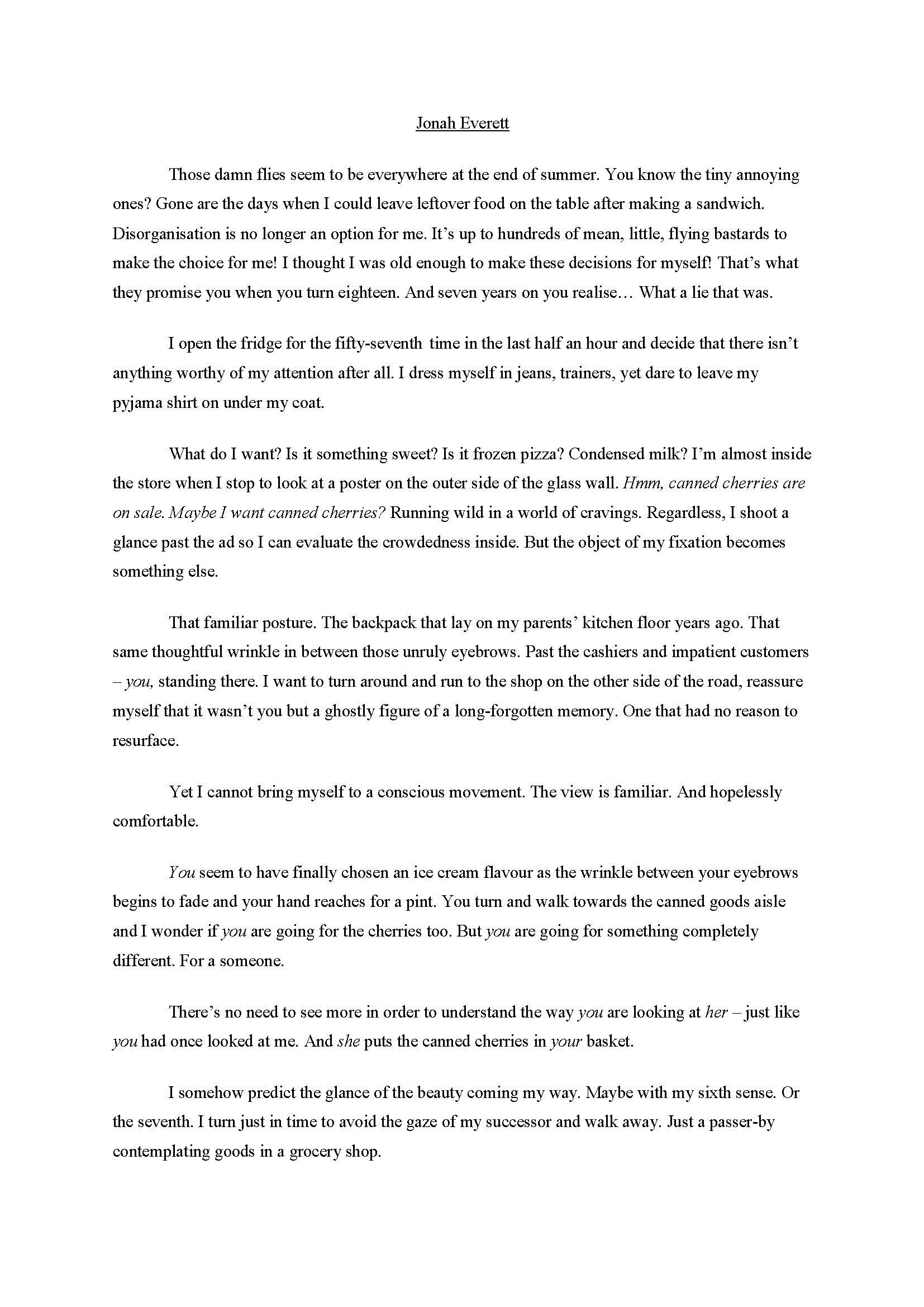
by Katrina Sproge
“Darla Ray, Jonah Everett is an admission to missing people from the past and how such feelings can be awakened by the simplest actions and surroundings, and at most unexpected moments. It doesn’t matter if the person one misses is an estranged family member, a former lover or a long-lost friend. It’s the sudden lack of the relationship that makes a human being prone to shock once reminded of that absent someone.
The piece is inspired by my childhood friends and sad eyes at messy parties.“
Katrina Sproge is a final year student of BA Media & Communications, specializing in Creative Writing. A hobby of Katrina’s is film photography (@katrinasfilmarchives), as she finds aesthetically pleasing visuals fascinating and they often serve as an inspiration for her written work. The fruits of letting her writing skills soar are visible in tiny, but personally meaningful achievements like being published in a youth poetry compilation. Currently, a contributor for www.unauthorizedperspectives.com.
Doors
by Ipek Besik
When I was a child I couldn’t sleep at night. I grew up and learned how to sleep but before I learned to sleep I went to many doctors. One doctor told me it was because of the city. Because of the sounds and lights that came in through the walls and windows.
Last night for the first time in a long time I couldn’t sleep. There could have been many reasons for this:
I heard yelling from the upstairs neighbour
I heard the sound of trains go by
I saw light coming in from the street light
I saw light coming in from the cars
I saw and heard sirens.
When you can’t sleep it’s easy to blame the city. But the city never sleeps and you’ve been able to sleep many times before. So you have to look inside.
There could have been many reasons to why I couldn’t sleep but there was just one. I had a tiny, stupid, tiny question stuck in my head:
What is a door?
The dictionary says “A flat object that is used to close the entrance of something such as a room or building.” I won’t accept that because of “flat”, “object”, and “close the entrance”. Some doors are not “flat” and they don’t “close the entrance.” Sometimes I’d open a door, only to be greeted by a brick wall. One time I entered a room, I looked back and saw that the door was a fish tank. Then there were the doors which were locked. The keys for these doors, I’m fairly certain, have never existed. So if a door was never opened and can never be opened, and was not made with the purpose to be opened, is it still a door?
“ I don’t know.”
“ What do you mean you don’t know?”
“I don’t know.”
“Then who knows?”
“I don’t know.”
I finally decided what looks and feels like a door is a door. The fish tank is a door because it feels like a door, and the door to the brick wall is a door because it looks like a door. I also decided I must be severely mentally ill. Everything I thought happened the last few days must have been a figment of my imagination.
If I look sane, but I feel insane, than am I insane? And if I look insane, but I feel sane, am I —
“ You’re over thinking this, darling.”
“ What?”
“You’re overthinking. A door is a door! I offered you a simple deal: Count the doors in my house, and I will get you a ticket to anywhere in the world. A simple deal, that you’re now making me regret offering!”
Then she laughed.
Loud, long belly laughs. Deep laughs. I don’t think her belly is where they come from, it must be somewhere else, somewhere deeper. I think they come from the centre of the earth. A dark hole connects the centre of the earth to her mouth and when she wants to laugh the sound waves travel from the center of the earth to her mouth and she spits the laugh out and it echoes for years and years ,she closes her mouth so you can’t hear it, but it goes on forever, inside her.
“I regret accepting your deal.”
The laughing stopped.
“Why’s that?”
“I used to be normal. You, your deal and your house, you’ve made me like yourself.”
Then there was silence. But I knew the laughs was echoing inside her.
“ Well darling, If you were so normal, why did you accept my deal in the first place?”
Deals
When I was a child all I wanted to do was run away. There was no reason for this, there was nothing at home that would push me to run but the urge was vigorously present, always. I wanted to be a pirate. Pirates were always on the sea, they didn’t belong anywhere on land, they had to keep moving, always. I thought that’s the life for me. I’d sail forever and I’d never belong anywhere on land.
What’s funny about living in a big city is that you can’t run away. At least not when you are a child. You wouldn’t know where to go. The city is too big for your little mind. You wouldn’t know where the city ends and where anywhere else begins. If you wanted to run away you couldn’t walk. You would have to do what the adults do. You would have to get on cars or trains or planes. But you can’t do that, not when you are a child. So you wait to grow up.
What’s funny about growing up is that you can’t run away. You would have responsibilities, responsibilities people older than you and forces bigger than you would claim for you. You might know how to leave the city, you might know what cars or trains or planes to get on, but you wouldn’t know where to go. You certainly wouldn’t know what to do when you get there. First there is the money issue. Then there is the fear, which contrary to what you believed when you were a child, only grows stronger as you grow older. So you stay. You let the city tower over you.
When a stranger offers you a strange deal, a deal which will get you the one thing you always wanted in life, to run away, you take it. It’s crazy to run away, so why shouldn’t the way out be crazy too? What if for once we believed in crazy?
“The deal is if you come to my house and count how many doors there are in my house, I will get you a ticket to anywhere you want in the world.”
It’s a simple deal, if you know what doors are, and if you know how to count.
I met her at the supermarket I worked at. She came in, grabbed cat food, asked “How much is this?” I said it should say the price on the bottom of the shelf she took it from. She was silent for a while, not breaking eye contact, then she offered her deal. Any other supermarket employee would’ve said “Sorry ma’m, we don’t do house calls.” But because I’m me I asked her the only question I though made sense to ask:
“Why?”
“Oh, I forgot to say, part of the deal is no questions asked. Well, you can ask them, but you won’t get an answer.”
She started laughing. I said my shift ends in an hour. She said that’s fine I’ll wait. I said where is your house. She said no questions. I thought about what I’d do when my shift ends. I would normally go home. But that day the thought of going home suffocates me. I said okay I’ll count your doors. I thought I don’t know if I believe her. But I’ll count the doors. I have nothing to do.
Doors
The first thing I noticed about her house was that it wasn’t a house. It was a maze camouflaged as a house.
Her house had four regular floors and three half floors. These were floors in between floors, laid out on stairs, entire rooms with beds and wardrobes and desks on slope. There were three elevators and many staircases. The floors were connected in hundreds of different ways and the rooms were interlaced in thousands. Every room was connected to the last, the last room was connected to the first. There were thousands of ways to move through the rooms. Thousands of different paths to take.
The first thing I noticed about counting doors was that it felt wrong to count doors. Counting other doors would’ve been fine, but the ones in her house didn’t want to be counted. I had to find techniques for counting doors.
Techniques for counting doors:
Start from the top floor. Count every door. Go down a floor. Repeat the process. Add the number of doors on each floor. You should reach the number of doors the house has.
When I counted a door and walked through it, closing it behind me, I could feel it change. I could picture the door mutate: change color shape material. I could picture it multiply: divide into two pieces from the middle. I could picture it lock itself, blend into the wall, disappear. As I moved deeper inside the house, I recalled the doors I counted like a distant memory. Something, somehow, would tell me : whatever door you counted doesn’t exist anymore.
I went down to the ground floor. She was sitting on an armchair. She was watching TV. I informed her:
“The doors in your house don’t want to be counted.” She told me:
“Count again, to make sure.”
She was always sitting on a leather armchair, in front of the TV, on the ground floor. She always had the TV on. She watched everything: news, game shows, cartoons, soap operas. The commercials.
The first thing I noticed about living with her was the constant stream of words. First there was the constant stream coming from the TV. Then there was her speaking. To whom she was speaking to, I was never sure of. It could’ve been me, it could’ve been herself. Sometimes I thought maybe she spoke to the TV.
When I was a child and I couldn’t sleep at night a doctor advised I listen to white noise. Her speaking was white noise to me. After I was tired from counting all day, I would go downstairs, she would always be there, I would listen to her talk. She spoke of everything. It was impossible to keep track, she would jump from one thing to another, with no apparent link, no transition, like changing the channel.
I would listen to the sounds she made, rarely comprehending their meanings. There would sometimes be exceptions.
“I think anyone over 75 should stop watching TV.”
“Why’s that?”
“They just can’t tell apart what’s happening on TV and what’s happening in their living room.”
Techniques for counting doors:
Every door you count, put a big X on it with red spray paint. This way you won’t count the same door twice.
I painted doors until it hurt to breath. A big X on every door. I walked in from the last door on the first floor, came out of the first door on the last floor. Painted every door I saw. I forgot doors had two sides. There were two X’s on one door. Red paint dripped down every door in the house, every door I could see. My hands were red.
Once I painted the entire house red, a cloud of chemicals floated inside, filled everywhere, every single room and corridor, traveled through the keyholes.
My eyes burned. I couldn’t see, the cloud blurred my vision. I couldn’t count.
When I was tired from counting I would go down to the ground floor. She’d be there always. I’d listen to her talk, it was white noise to me.
“ My mother in a hurry, telling me to prepare the table. I say for who? Who are we preparing the table for?”
She laughed. Loud, long belly laughs
“No answer! Just keeps yelling at me, we’ll have guests over! prepare the table! At seven pm, they’ll be here!”
“I keep asking her who? She says seven pm! We’re yelling at each other at this point. She finally says, the president and the lady asking him questions! The president and the lady, in our living room, imagine that!”
She laughed. Loud, long belly laughs. Deep laughs
When I moved through her house, sometimes I would feel I was being watched. I would open and close doors, I would run from door to door, to see if the feeling followed me. It usually would.
Techniques for counting doors:
Tie a string. As you move through the house, tie every door you exit and enter to each other. This way you’ll know which way you came from, you’ll know which doors you've opened and closed, which one’s you’ve counted.
I walked through rooms carrying a roll of string. I tied doors to doors. I looked back at my masterpiece: a string going through almost every door in the house. It became a big knot in the middle. I pulled it from one side three doors on the right opened. I pullet it from another five doors on the left closed shut. I couldn’t untie the string. I couldn’t count.
I was tired, I went downstairs, she was sitting on the armchair. TV was on. White noise. I asked her:
“How can I know what’s behind doors I can’t open?” She said:
“You can’t know.” I asked:
“What if there are more doors behind those doors?” She said:
“Remember what I told you?”
Yes. No questions asked. Well, you can ask them, but you won’t get an answer.
If a door was never opened and can never be opened, and was not made with the purpose to be opened, is it still a door?
As I attempted to count doors the doors resisted being counted. They evolved into stranger and stranger forms. They tried their best to make me stop and ask “What is a door?”
I found doors at the bottom of swimming pools. Doors on ceilings. Doors made of entire jungles. Doors made of traffic lights and underground stations.
Techniques for counting doors:
Lock all doors you see. So you can’t move through them. So you can’t open or close them. If you can’t know what’s behind them, they don’t exist. Make it impossible to count, so you don’t have to. While you’re at it, lock yourself in a room. So you can’t leave.
Normal people count many things. They count money. They count time. They count apples in a bag and they count books on a shelf. They count people in a room. They don’t count doors.
I’ve counted many things due to my line of profession: I’ve counted cartoons of milk, bags of rice, tins of beans. I’ve counted money. I’ve counted time. I can’t count doors.
The deal is if I count the doors in her house, Il get a ticket to anywhere I want. This is a simple deal, if you know what doors are and if you know how to count them. This is a simple deal, if you know where you want a ticket to. Do you want to leave?
I went downstairs, she was sitting on the armchair. She was watching the commercials. White noise. I informed her:
“Normal people don’t count doors.”
She asked me: “How do you know? Have you ever known normal people?”
If a question was never answered and can never be answered, and was not asked with the purpose to be answered, is it still a question?
One night I stopped counting doors and start moving through them, aimlessly. I felt that I was being watched. Not by her, not by a person. I thought maybe an animal.
I fell to my knees. I rested my forehead on the floor, or the ceiling.
I thought I don’t know what I’m doing. I can’t count. I can’t leave.
The room was dark. I couldn’t tell where it ended, I forgot where it started. I couldn’t get up. I knew there was a door in this room, and it would take me to another place. I didn’t want to leave.
Her house had no plan. No guide. No design no method no pattern. Everything was interconnected and everything was in-cohesive. Everything was dependent on everything and everything was dysfunctional. You would have to come to terms with that.
I felt cold air sweep through. I raised my head, I raised my hand and I felt it push my hand back. I couldn’t understand first, but then I knew it was wind. I put my hand on the floor, and I thought I felt crumbs. I moved my hand around, and I thought I felt grain. I moved forward, and the pieces got smaller and gathered together. I picked a handful, let it pour from in between my fingers. I knew it was sand.
One thing about the house was you would always find ways out. Every room connected to the other, you would never be trapped. The exit could always be different to the entrance. You could always find a door other than the one you walked in from.
I saw light coming in as a straight line, just above the floor. I knew I found the door. I walked towards it, my feet digging in and out of sand. Everywhere was dark, except for this line of light. The wind got stronger and louder. I stood in front of the door, shaking from the wind. The wind louder then ever.
When I was a child and I couldn’t sleep, I would think I heard the door knock. Just as I was about to fall asleep, I would hear it. Just one knock, nothing else. I would wait for another, it would never come. I never opened the door. When I thought I heard it knock.
I turned the handle the wind pushed the door open. I couldn’t see from the light. I closed my eyes, I couldn’t see. I opened them slowly. I saw blue.
I couldn’t understand first, but then I knew it was the sea. I heard the waves crash in to one another and the shore. I smelled the salt. Nothing else in the horizon. Just the sea, crashing and pulling and pushing.
When I opened the door to the open sea I knew I had to leave.
I went downstairs she was sitting on the armchair. TV was off. She turned to me, she said:
“I had a dream last night. I was a pirate. I travelled the open sea, I never belonged to anywhere on land.” I asked her:
“Did you like it?”
“No, it was terrible. I never belonged to anywhere on land.”
Normal people don’t dream of becoming pirates. Normal people don’t dream of belonging, or not belonging. They belong.
Normal people go to bed at night. They don’t have trouble sleeping, and they sleep knowing the sun will rise in the morning.
Normal people wake up in the morning. They ride trains, pretending to know where they’re going.
Normal people don’t count doors.
There’s a knock on the door.
When I was a child and I couldn’t sleep, a doctor told me it was because of the city.
When I was a child and I couldn’t sleep, I would think I heard the door knock.
What the city teaches you is that you don’t answer every door that is knocked.
What the city teaches you is to sleep when chaos knocks on your door.
If a question can’t be answered, and wasn’t asked with the purpose to be answered, is it still a question?
There’s a knock on the door.
Normal people don’t ask questions with no answers.
Normal people ride trains, pretending to know where they’re going.
I asked her, how can I know them? How can they know me?
How do I know them?
There’s a knock on the door.
I answer it.
by Ipek Besik
“The inspiration for Doors came years ago, when I was thirteen, and I procrastinated writing it for seven years. I’m extremely happy I finally got the chance to write the story and see what it’s actually about in my Creative Writing course last term.”
Ipek is a first-year Media and Communications student from Istanbul, Turkey. She has been writing or thinking of writing since she was a child. She enjoys listening to people’s weird and scary stories, celebrity gossip, and long car rides. She isn’t really good at writing bios.
The thumbnail design is by Dimitar Dimitrov
Waste Not, Want Not
by Liv Kisby
“Waste not, want not, waste not, want not...”
Vinny’s melody streams through his sickly-sweet blood and leaks from his vinegar heart into the buzzing veins of the city. He doesn’t sing to the residents with their racing eyes and limbs, they’ve forgotten how to listen. Their motion is too fleeting, too distracted to pick up on Vinny’s frequency waves. After all, they have become deafened by the cries of their own wants. No, Vinny doesn’t sing to them. Instead, his gentle hum calls to the waste that lingers unwanted in rubbish heaps across the city. To the once wanted waste that wonders what exactly it did wrong to be tossed away and left to decay. To the once wanted waste that waits, waits waits… for what exactly? For a warm embrace? A place of belonging?
It is night, but the city doesn’t sleep and neither does Vinny. Street-lamps, head-lights, billboards and 24-hour off licence signs give the city an immortal glow that illuminates Vinny’s path. He wanders the rumbling streets with eyes fixed steadily on the grit of the pavement, but no sensation of the city is lost on Vinny. He carries within him a nocturnal clarity that allows him to see, to really see, through the polluted smog that clouds the vision of passersby. Vinny’s pupils dilate in time with the flashing ‘OPEN’ sign of the all-night supermarket. With a face as deeply lined as the concrete at his feet, he smiles to himself, at nothing in particular. He is a stranger to everyone but the city knows him, and this is all that matters.
It is through his urban dwelling that Vinny’s senses have become so attuned. Each sound takes on a life-force of its own that configures the space and gives birth to a white noise which cradles Vinny’s brain in fuzzy warmth, spurs him onwards in hope. For Vinny knows that if he listens hard enough, he will hear buried deep within the layers of white noise the song of the waste who are hopeful still, hopeful despite, and waiting to be heard. The sounds filter through his ears and into the open jar of his heart which beats, emitting a deep and steady bass line that cuts through the erratic rhythms of the metropolis. With each pulse, it leaks a poignant trail of vinegar.
The fleeting residents who pass Vinny by recoil from the acidic stench, darting further and further away from the freaky bin man. He could contaminate them! His vinegar heart could stain their shiny facades, facades they polish each and every day until they squeak the deafening squeak of cleanliness. They do not dwell but cast away such a ghastly smell and continue on their way. Their shoes tap and crack the pavement in irregular dissonance, as if by marking it with their violent step they can claim it as theirs. But Vinny is unfazed. Beaming with the bittersweet wisdom that comes with age, the marks on his face hold in them a sincere forgiveness that he has learnt over time. This forgiveness gives him the strength to wander on, aglow with the purity of the night.
A fleeting motion of a limb tossing away what it no longer wants, followed by the hauntingly familiar echo of waste being consumed by the void of the bin - Vinny’s attentive gaze is drawn in. The hollow chime ignites a reverberation which stirs the liquid of his heart into a wave. Propelled by a cardiac tide, Vinny’s wandering melody and the wonder of the waste reach a synchronised crescendo, harmonising as they pull towards each other through the current of white noise. Nearer, nearer. Peering into the void, a decaying sea of searching eyes are reflected in Vinny’s pupils. Fragments of orange peel contort into frowning faces, coffee grounds spill from cardboard cups like ashes of the dead, half-empty beer bottles cry tears of glass shards. Releasing a sigh of heavy sentiment, Vinny wipes a tear from his own eye with one hand and clutches the jar of his heart with the other, swiftly detaching it from his chest. He reaches his tear-stained fingers into the sea of decay and croons his gentle tune once more:
“Waste not, want not, waste not, want not...”
One by one, the subjects of waste manoeuvre the remains of their structural integrity into Vinny’s warm embrace, clambering onto his palm, crawling up his arm and leaping into the jar of vinegar with a
plop!
plop!
plop!
With the impact of each plop, the beat of Vinny’s heart transforms into a boom. With a helping hand, the assumed-to-be-decomposing can unite to create a composition of themselves. From this, there is room for them to bloom.
A sharp twang of sweetness rises from the booming bottom of Vinny’s heart and suspends his contentment; the pain reminds him of the helping hand he lacked but so desperately needed as a child. Moved by the unrelenting motion of memory, the city’s buzz begins to distort into a discordant array that dizzies and devours Vinny’s fragile form. Illuminated by ambulance lights, the fleeting faces of the residents flash glares of disgust, sirening in and out and in and out of Vinny’s intermittent vision.
Heartbeat tempo quickens - from steady boom to erratic frenzy. In a purge of negativity, the residents cough and hack away from the bottom of their sour lungs. Phlegm spurts in half time through the polluted smog and lands at the soles of Vinny’s feet. He stares downwards and tries with the integrity of his soul to ground himself, to retune his senses. But his awareness is consumed by the overflowing jar which sways in its unbalance, its sickly-sweetness, and the waste inside are panicking too, calling out, “Vinny, what should you do? What should you do?”
But he can only think of his sickness, the taboo of an open heart. Amidst the sensory overload, the poisonous particles of bacteria from the residents rise up from the grit and collide with Vinny. The pressure makes them move faster. Nearer, nearer to his heart until they infiltrate, beginning to ferociously gnaw at its sweetness, break down its components. Bacteria reacts with sugar - the threat of decomposition is real again and the damage is beginning to be done. As history repeats itself, Vinny’s senses force him backwards in time. The pain arrives - Vinny departs. Shrinking into the child he once was, he is suspended there.
“Sweet heart, sweet heart, sweet heart!”
The sound of sirens mutated into the mocking mantra of the other kids. When he was only a boy, they splurted their jarring jingle into the jar of Vinny’s heart. It was always open wide, theirs closed tightly shut. They inhaled the sickly-sweet odor that it emitted and they were repulsed. So, with a cough and a splutter, their bacteria formed a colony in the lava of sugar that oozed from Vinny’s chest. Too sweet to fight back and too exposed to hide, Vinny could only surrender to the bacteria as it multiplied. Of course, the rotting began in Vinny’s heart. As the bacteria interacted with the sugar, a toxic reaction was triggered and acid began to spread. The poisonous giggles of the other kids grew greater in frequency and acid-induced anxiety burnt its way through his syrupy veins with growing intensity, churning a fire in his stomach, grazing each and every limb. His structural integrity grew weaker and weaker - he was decomposing. Unwanted, sweet Vinny started to waste away from the inside out.
But with a
plop!
plop!
plop!
the wanted waste within his vinegar heart call out to Vinny and bring him back into the present. They sing to him a kinder melody:
“Your sweet heart, your sweet heart, it beats on and on! It is a home, a vinegar home, where we all can belong!”
Vinny smiles down at the waste and they feel the warm sensation of love that they’d been waiting for all along. They feel it touch the decomposing fabric of their being and begin to build back up what was breaking down. The waste are right, Vinny has not decayed, not yet. But their innocent words of reassurance are not enough, for it is only Vinny who knows the antidote to his condition of sweetness. So, he attempts to regain balance and sways along the pavement, glowing eyes searching for the next bin to reach in, with only just enough energy left to murmur his gentle tune:
“Waste not, want not, waste not, want not…”
With dawn edging closer, the night sky is getting lighter and Vinny’s vision blurrier. Vinny reaches and fumbles with tenderness through the void of the bin, hands shaking and fingers colliding with each object of waste like the improvised playing of notes on a piano. His searching grasp reaches past the wailing crackle of crisp packets and tightens around a half-full can of ale which he lifts from the bin to his open lips and empties in a single gulp. The coppery liquid trickles down his throat and filters into his heart with a drip, drip, drip. In synchronisation, Vinny and the wanted waste let out a woozy sigh of relief. For Vinny knows that without alcohol, the bacteria would eat away the sugar of his heart as it did in the past. His heart would be decomposing matter, his heart would turn to waste. Without alcohol, vinegar would not come into being. And without vinegar, Vinny could not be. Without Vinny, the waste could not be preserved, would not be wanted, would never truly matter.
Revitalised by the liquid gold he has sipped, Vinny reaches his pinky finger inside the balanced solution of his heart and stirs so delicately, creating ripples that tickle the waste as they swirl in a tiny whirlpool of vinegar. The wanted waste giggle with newfound integrity as they feel their components align; to them Vinny’s heart is a container of the divine.
The city’s buzz reduces to an ambient murmur as the white noise subsides and whiteness of the day draws nearer. Underneath the rail bridge a flight of pigeons emerge from hiding. One by one, they poke their crooked necks from holes and look with round eyes, unblinking, to the morning. Seeking, they plunge their sooty forms clumsily outwards, descending through the city smog. Hearing the familiar flitter of wings, Vinny raises his eyes and his ears to the birds with wonder. The waste take a peep too. Their gaze is drawn to the sky which resembles, now, a milky hue of pink and blue. The pigeons flock at Vinny’s feet and form a chorus around him. In ritual, Vinny crouches to the ground to greet them, the arch of the bridge casting a comforting shadow around them as they are spotlighted by a seeping stream of approaching daylight.
They begin to sing a lullaby, a lullaby of the dawn:
“Dawn is awoken, pigeons have spoken, closed hearts all broken but we’re still wide open, dawn is awoken beat on, beat on…”
Their melody echoes through the curved structure of the bridge, causing gentle reverberations that provide an underlying hum to the mechanical rattle of the train that passes over them. This shift in frequency disturbs the early morning commuters travelling on board - for a moment they are removed from themselves. Irritated, they take out one earphone and survey their surroundings accusingly. Eyes darting through each other, they frantically try to identify the source of distraction, too short-sighted to take a glance out of the window at Vinny’s chorus below. With a huff and a puff, they reinsert their earphones and dissipate their blame into a monotonous carbon monoxide that is concentrated within the confines of the vehicle. The passengers inhale and exhale, inhale and exhale. The train rattles. Their throats become raspy. They cough, cough, cough.
The chorus reaches a calming crescendo and the pigeons ascend from the ground, raising Vinny and the wanted waste with them. The dawn has awoken, so Vinny must sleep. With the urban doves hovering not far above his open heart, Vinny bids the night farewell and sways onwards, homebound. From the shadows of the bridge out into the light - brighter still. From the main road that anticipates another day of stomping limbs and racing eyes, to the side streets. From the exposure of the city to the enclosure of his home. Vinny arrives - the pigeons depart. He gives them a wave goodbye and feels the pull of the cardiac tide of his heart. Smiling down at the waste who peep out at him in wonder, Vinny clutches the jar and swiftly detaches it from his chest. With the jar of his heart securely in one hand, Vinny clasps the ladder attached to the jar of his home with the other. He hoists his fragile form onto the ladder and begins to clamber up, up, up. Bones creaking, jar ringing. Wide open, waste singing. He reaches the top and with a
plop!
plop!
plop!
Vinny empties the vinegar jar of his heart into the giant vinegar jar of his home. The mass of waste inside look up in synchronised delight and rejoice at the sight of their new companions, erupting into chorus:
“Waste not, want not, waste not, want not!”
Once the merry song has been sung, the wanted waste make way for Vinny and he slides into the jar with a splash, sinking to the bottom for a restful day of fermentation. As Vinny snores, bubbles rise from his open mouth, reaching the surface with a pop as his heart is restored by the vinegar solution of his creation. He dreams the dream of home, sweet home, sweet heart.
Hearing the popping signal, the waste are informed of Vinny’s subconscious slumber. It is time for them too, to rise. Whilst the day is bright and the fleeting residents are awake, they must seize the opportunity to transform the motion of the city, to decide its fate. In a collective upsurge, the waste lift their pickled forms up through the safe coating of vinegar and emerge wide eyed to greet the bright blue sky. Not forgetting to give Vinny a tender stir that submerges him deeper in blissful sleep before they leave, they slide down the ladder one by one. With a whistle and a
w
o o
o o
o o
o o
sh
the waste kerplunk to the ground and sway onwards, citybound. From the enclosure of home to the exposure of the city. The waste wander in slow motion, winding through the side streets, moving closer and forming bonds. They fuse their infinite matter and begin to expand, wider and fuller. When they reach the main road, now an unrecognisable wantland of blinding white light, they have grown as tall as skyscrapers. As a single heart beating vinegar waves into the urban scope, the waste start to sing. They don’t sing to the residents who race their eyes and limbs away from the pungent flood, it is too late for them to listen. Instead, their gentle hum calls to the rest of the once wanted waste that lingers in rubbish heaps across the city. As they sing, waste rises from the void of each and every bin to join them, fusing into the giant heart. Propelled by the spirit of revolution, a tsunami wave of vinegar is released as they chant:
“We are the wanted waste and this is a wasteland now! We are the wanted waste and this is a wasteland now!”
Adrift somewhere in the ocean of vinegar, Vinny floats in his jar above an underwater city, snoring. He listens from the depths of his fermenting subconscious to the immersive lullaby of waste not, want not, waste not, want not.
by Liv Kisby
Vinny is a man with an open jar for a heart - he wanders through the city streets at nighttime, offering his vinegar-filled heart as a home for the unwanted waste of the rubbish bins.
Liv Kisby is a Media & Comms student who specialises in radio. They are interested in exploring the notions of space, place, belonging and affect through written word and sound. They also enjoy making music, which can be found at:
The thumbnail design is by Dimitar Dimitrov
Wells Blog
Duis mollis, est non commodo luctus, nisi erat porttitor ligula, eget lacinia odio sem nec elit. Maecenas faucibus mollis interdum. Nulla vitae elit libero, a pharetra augue.












